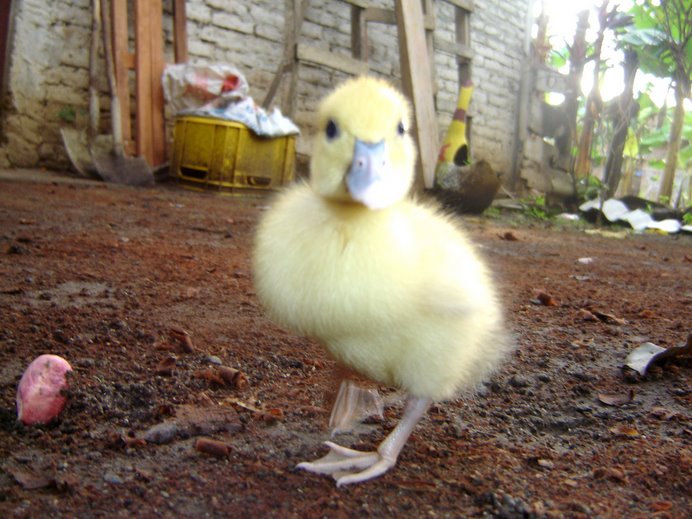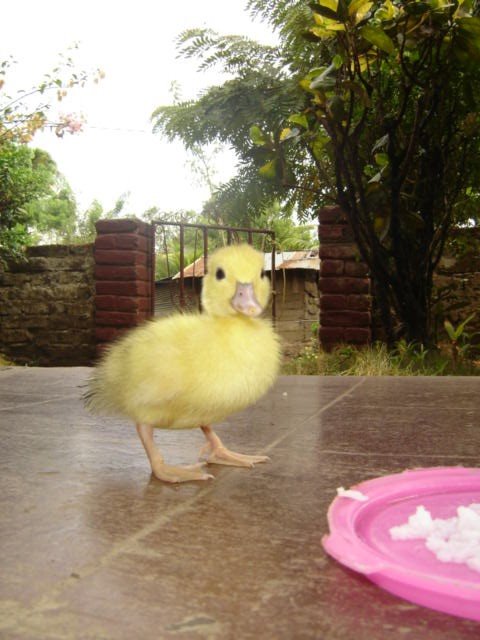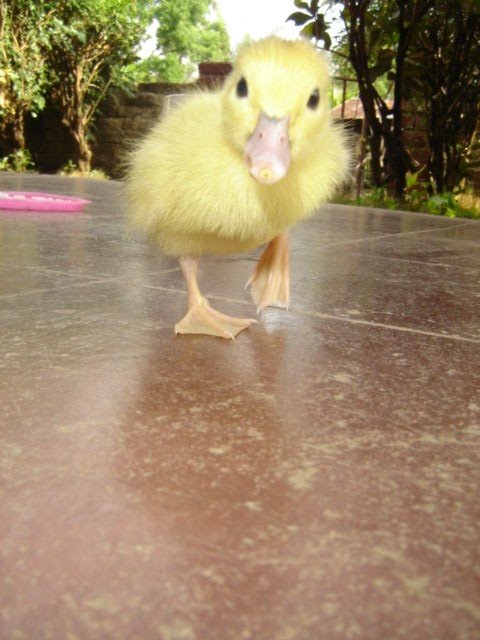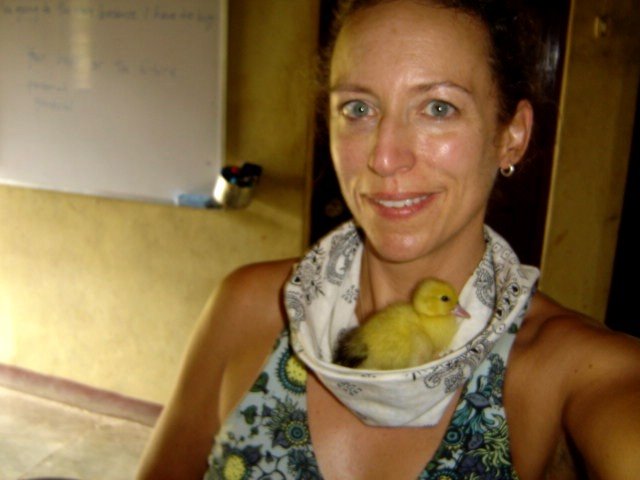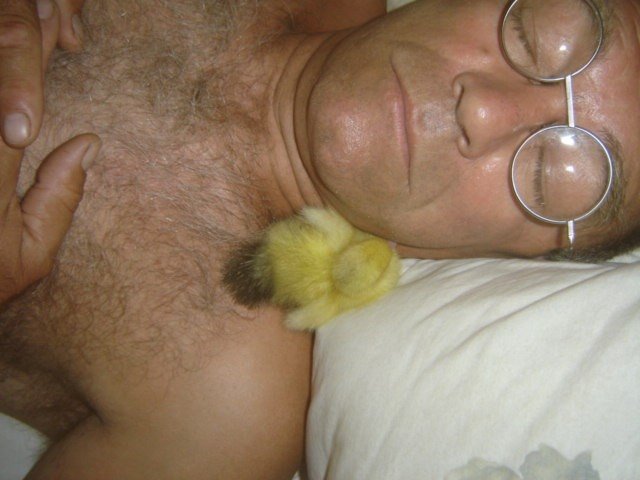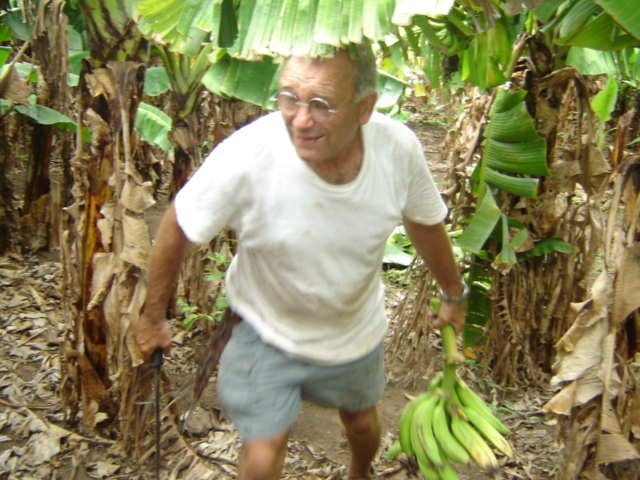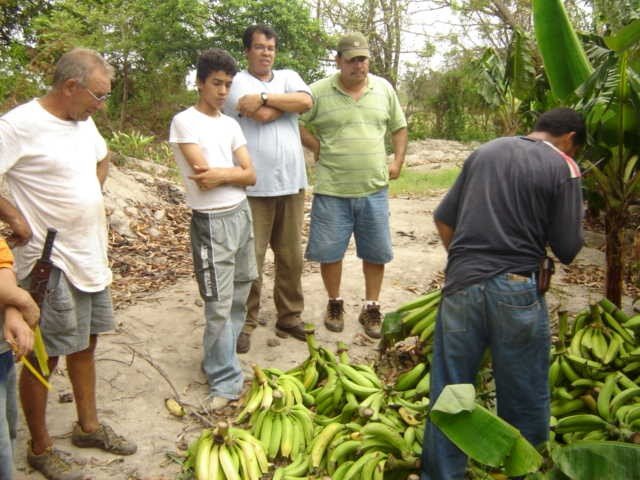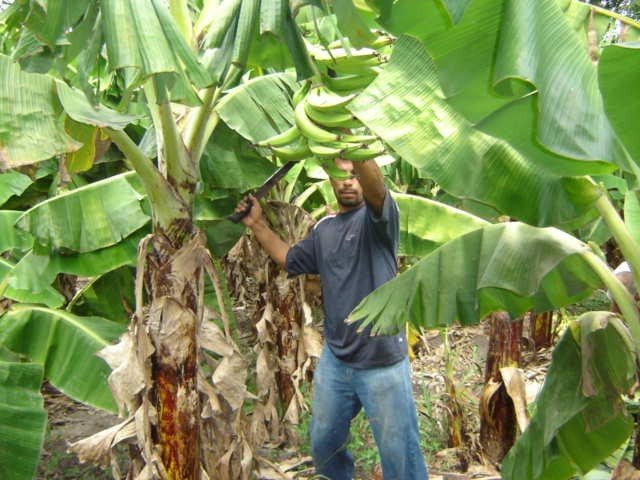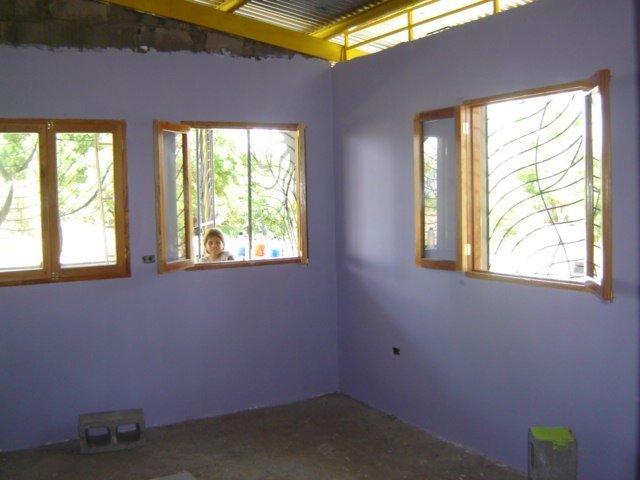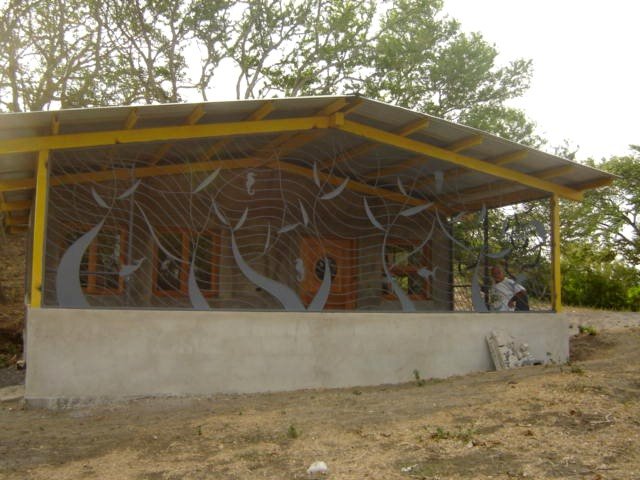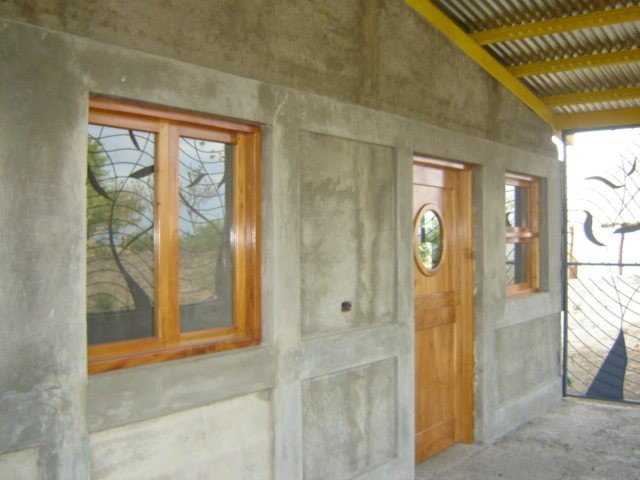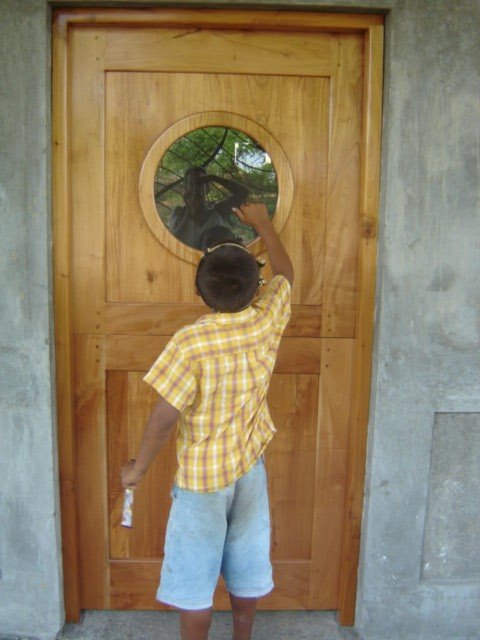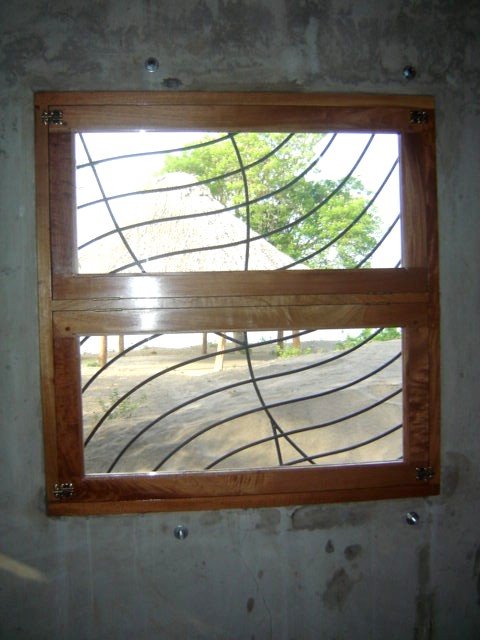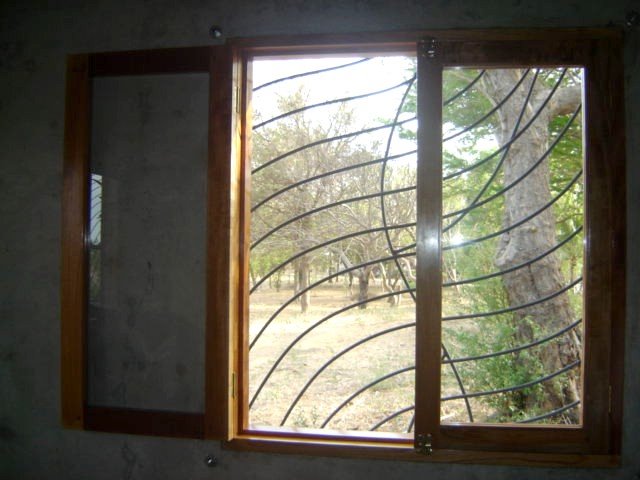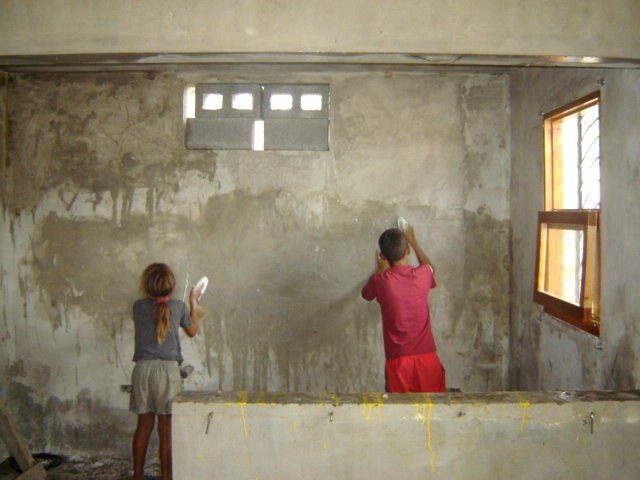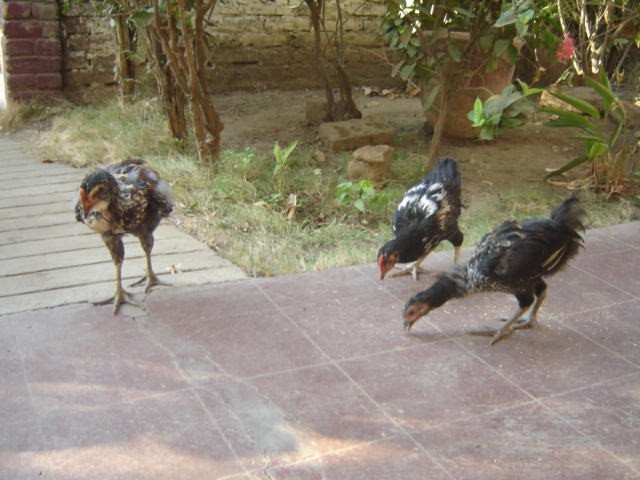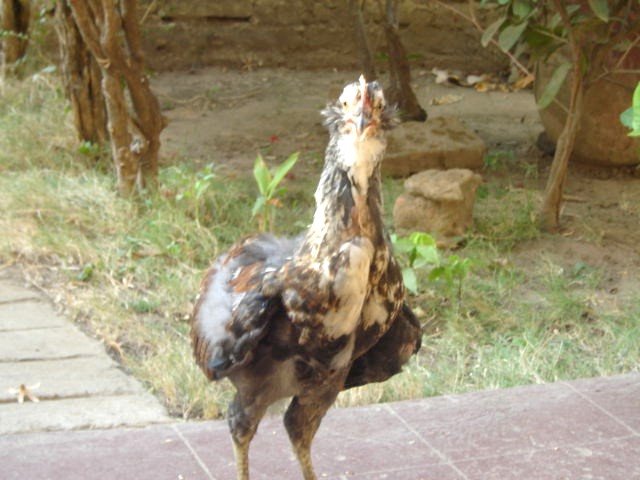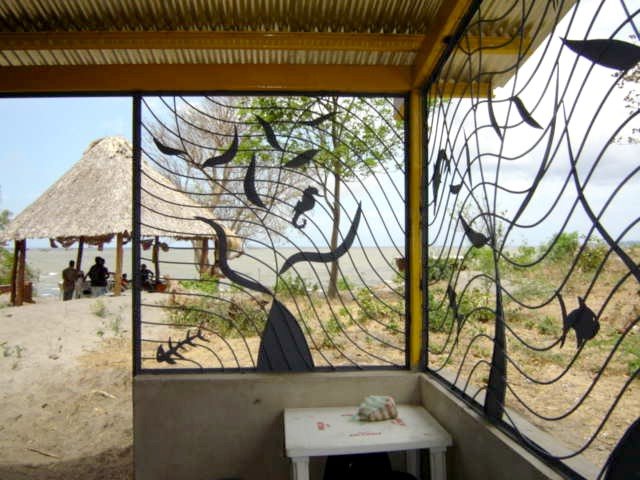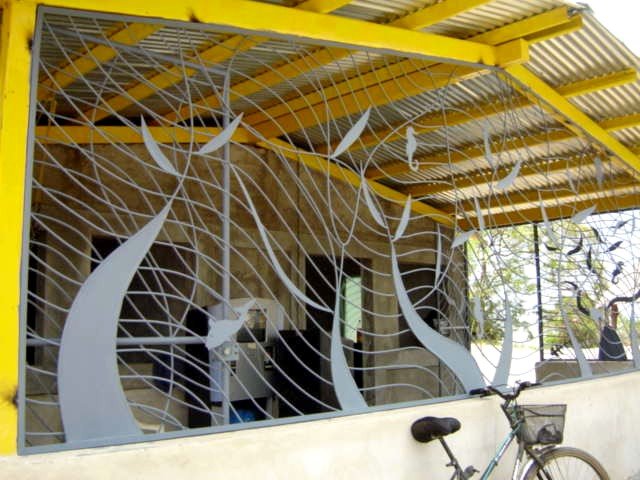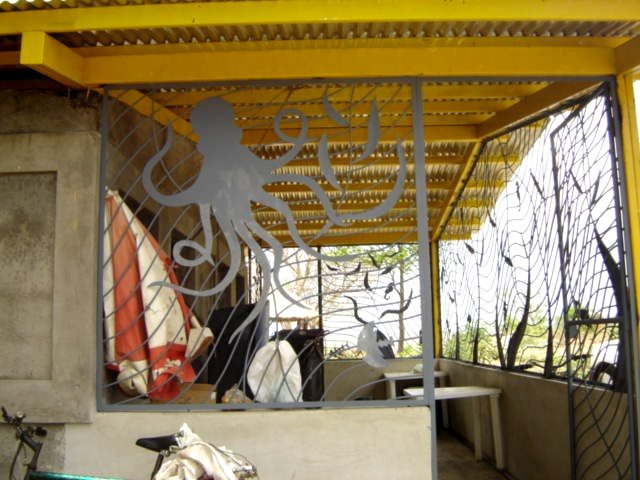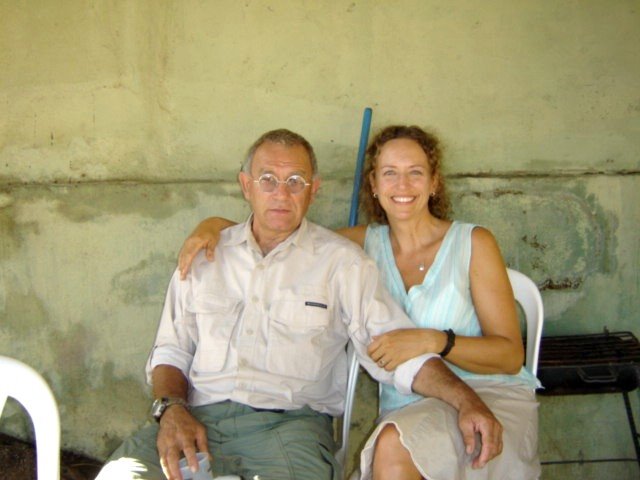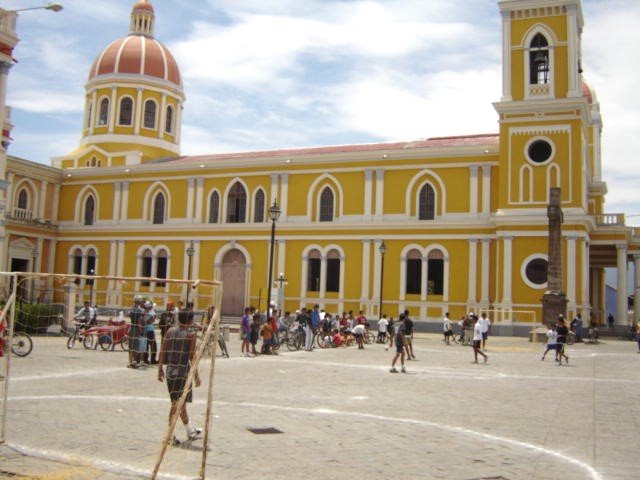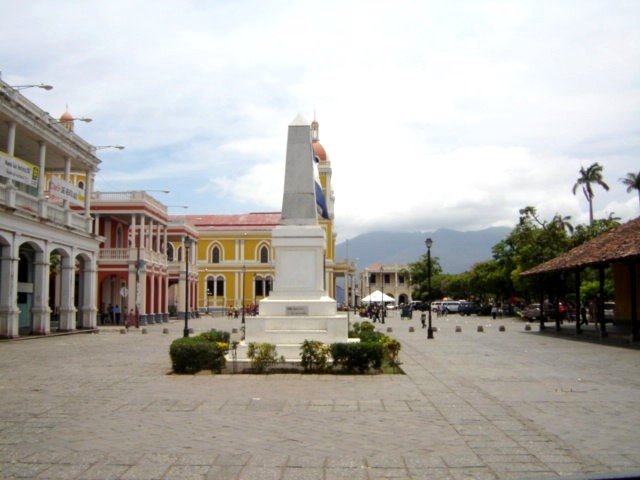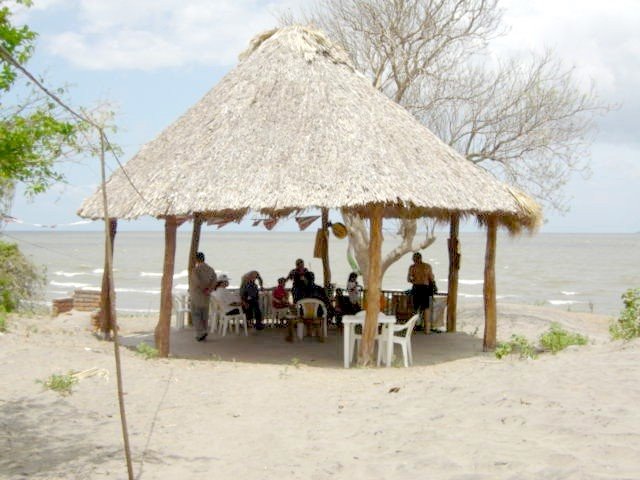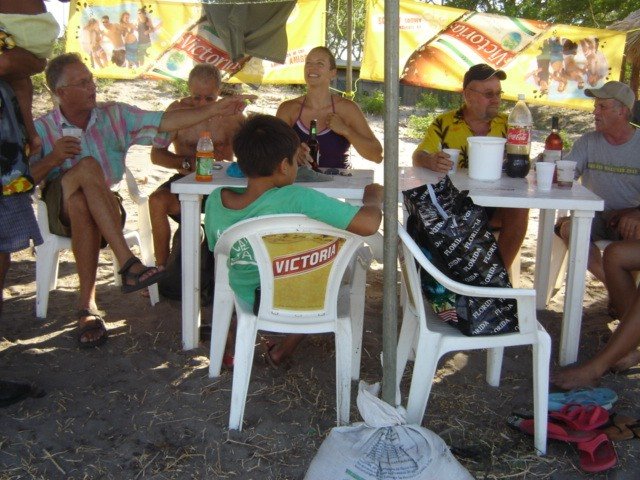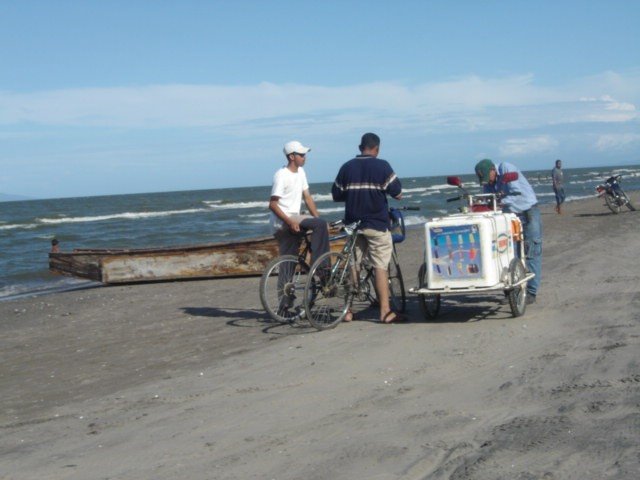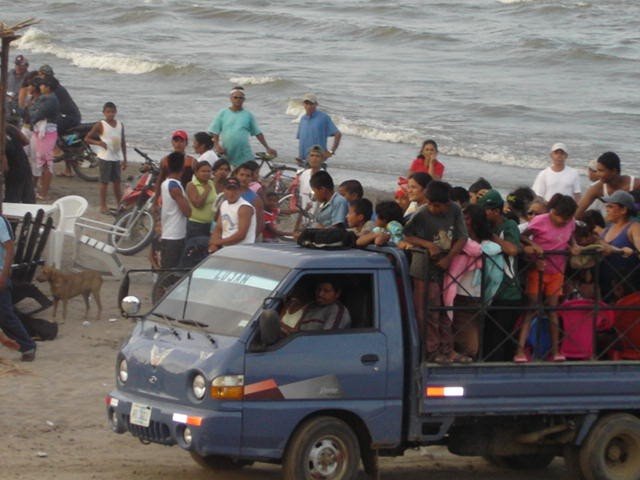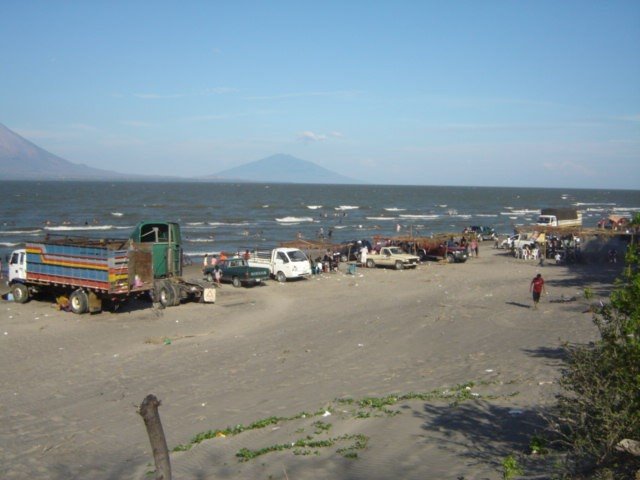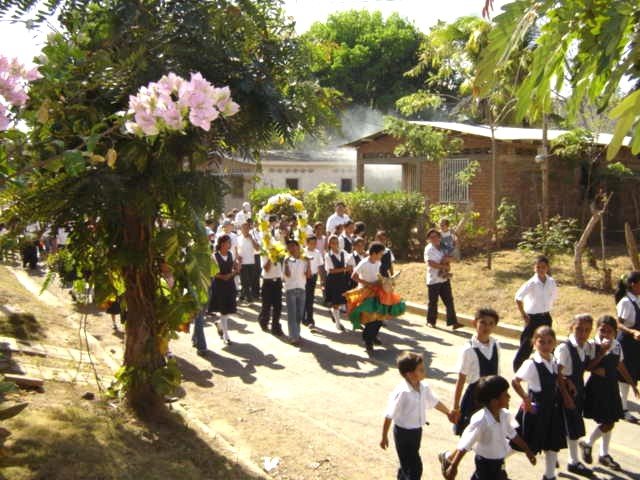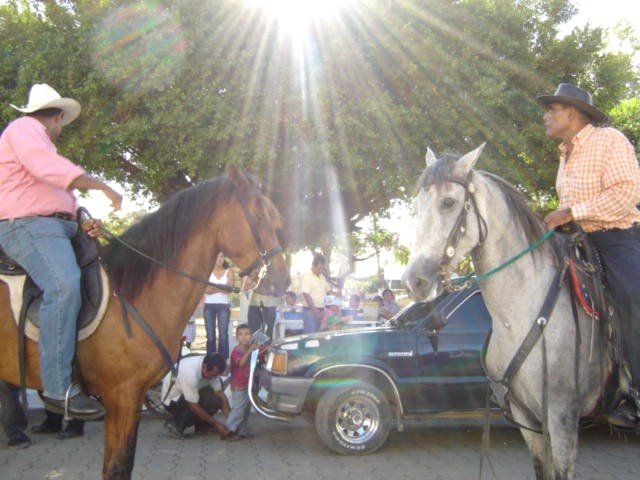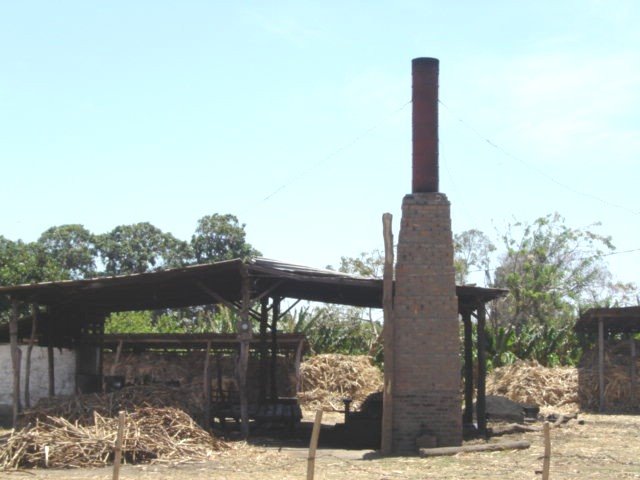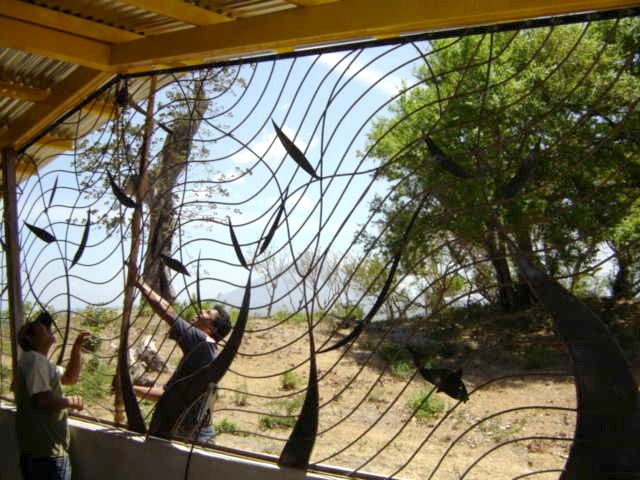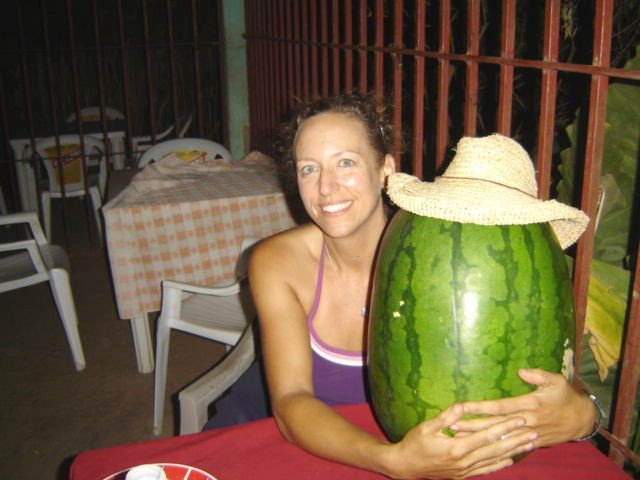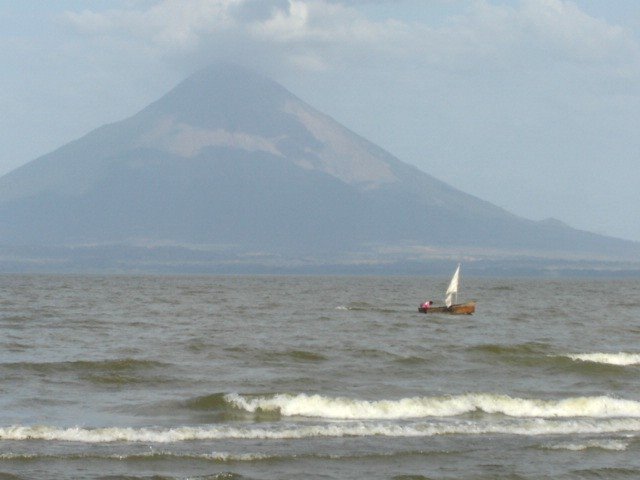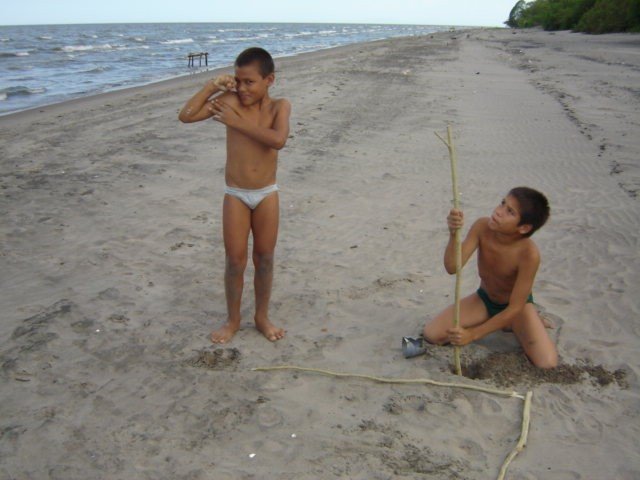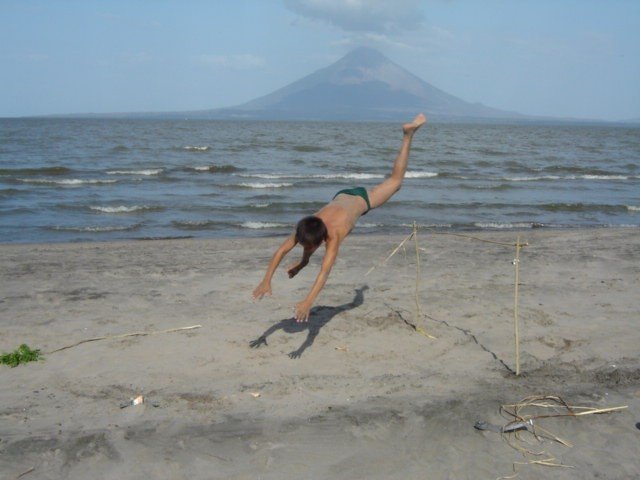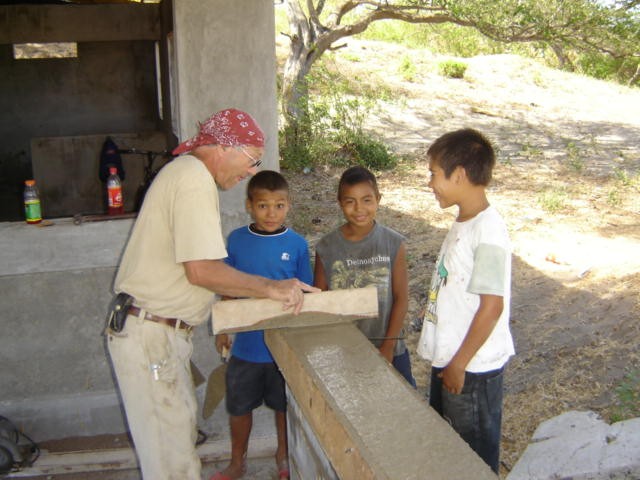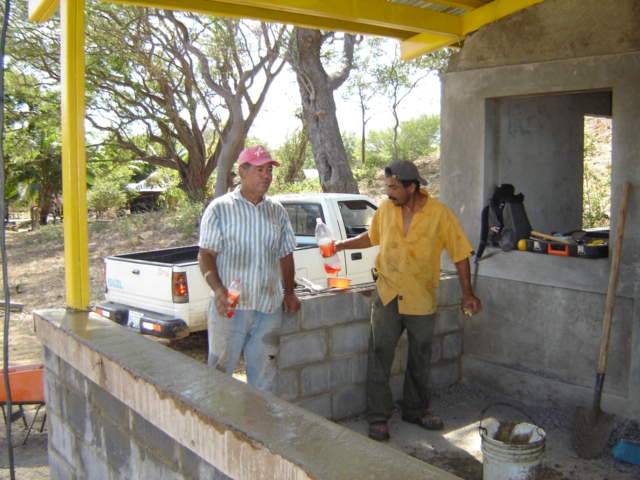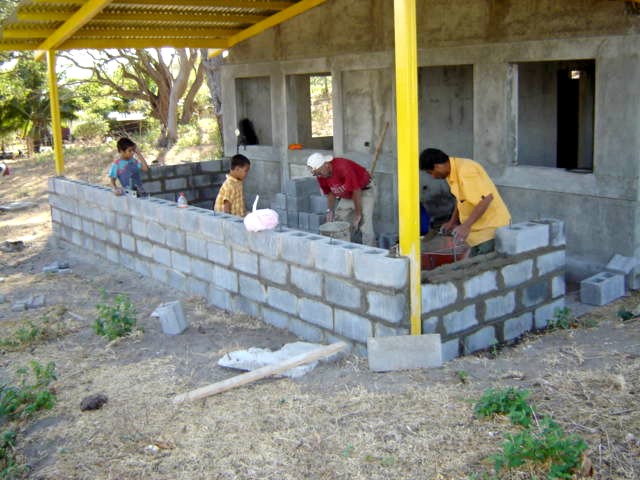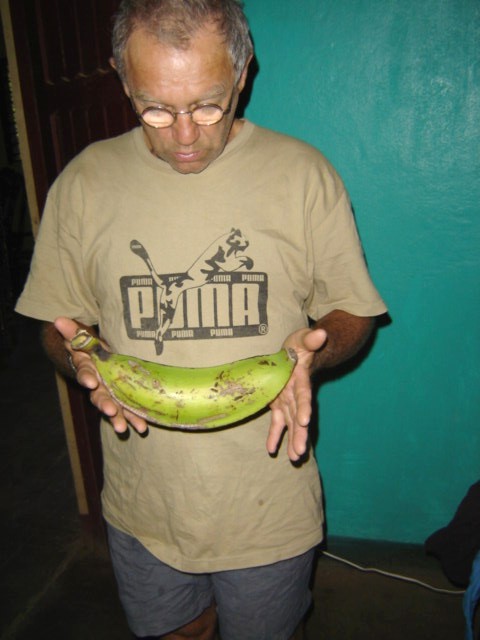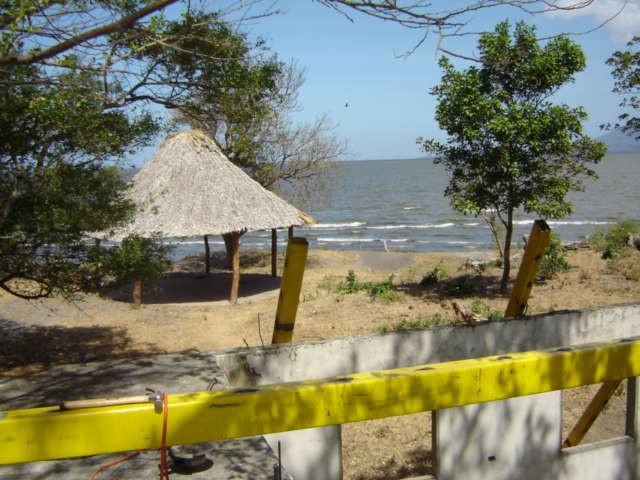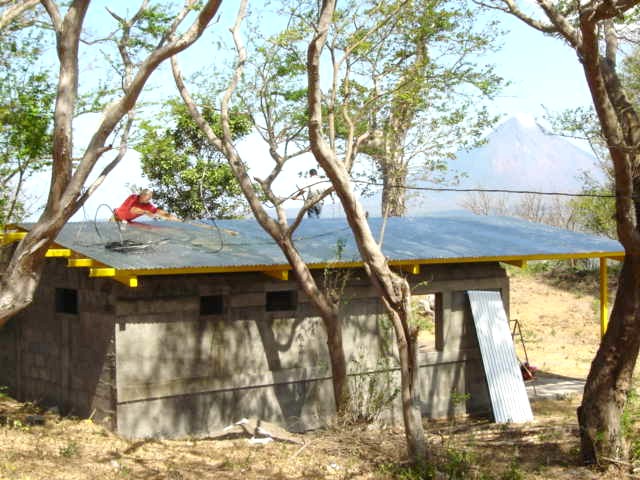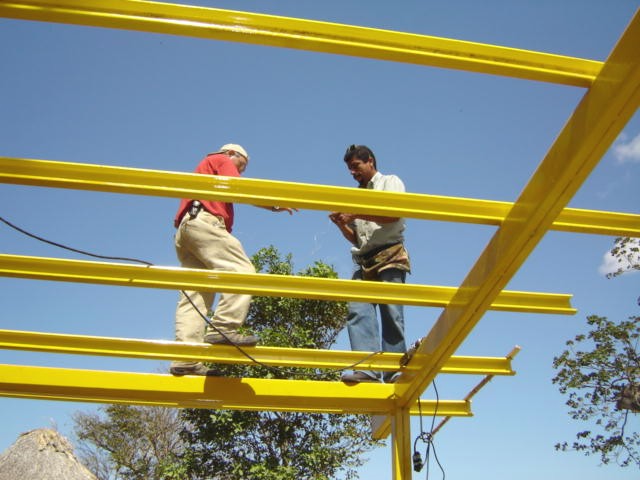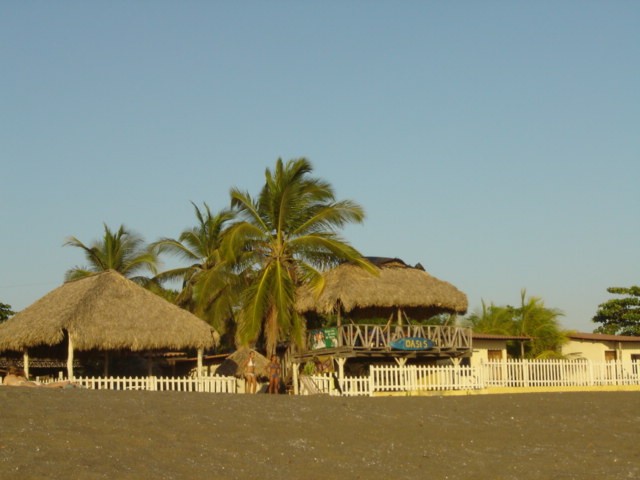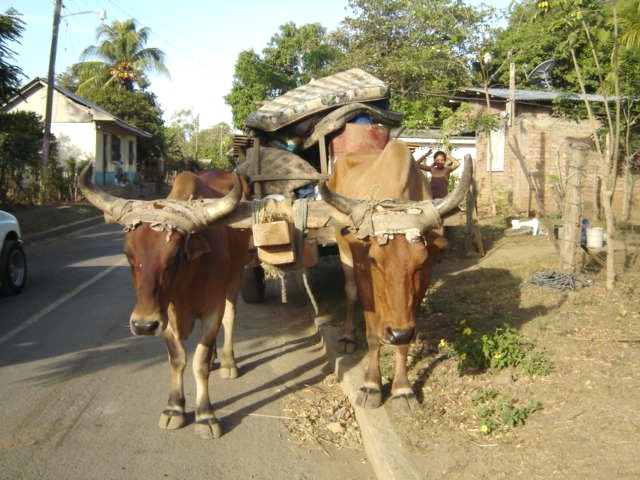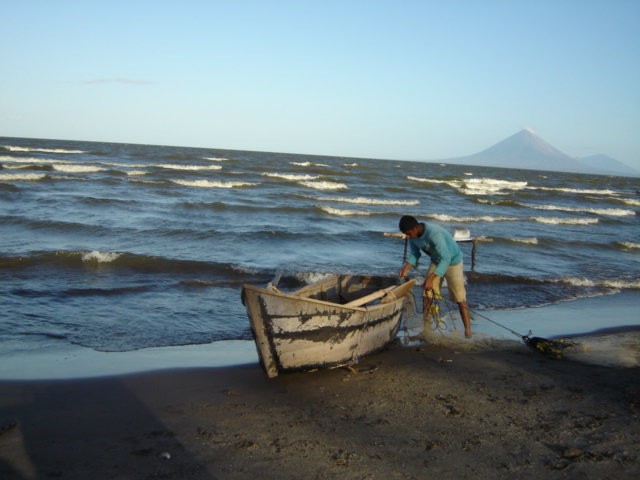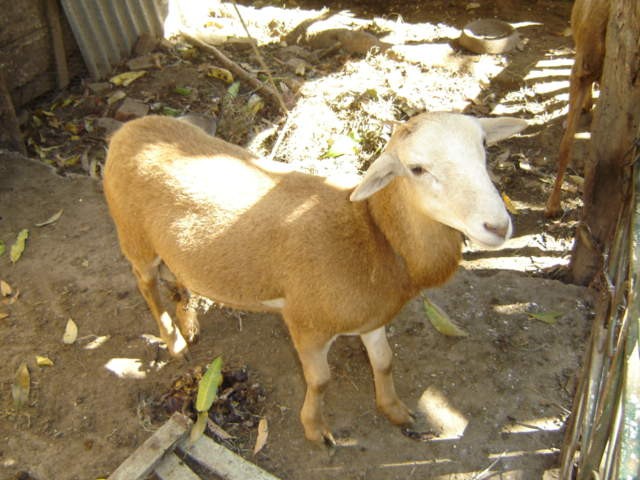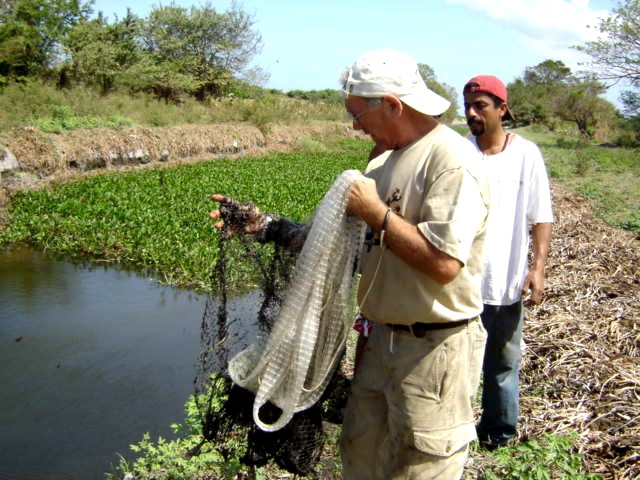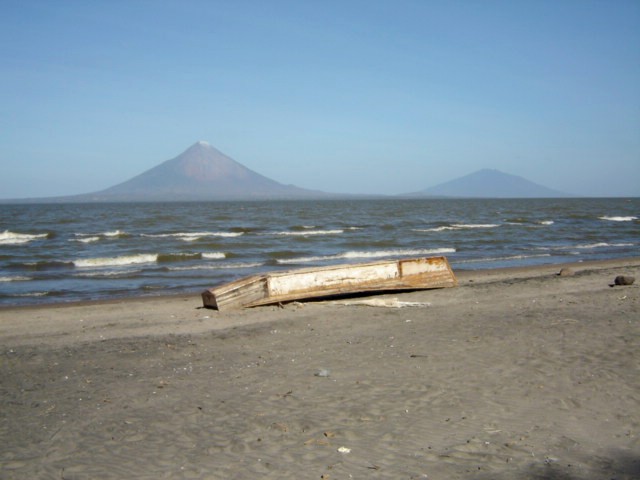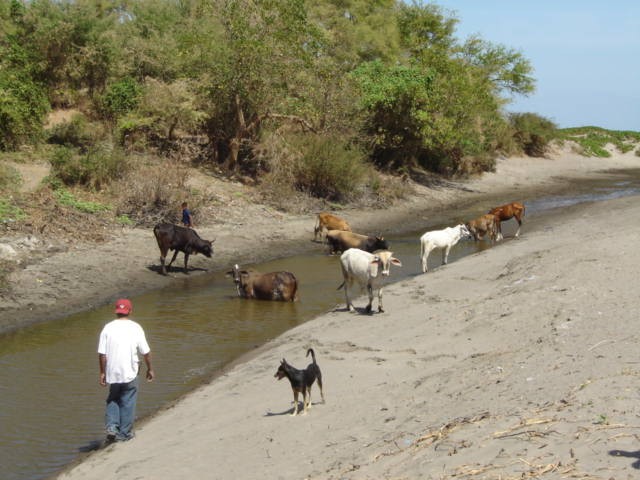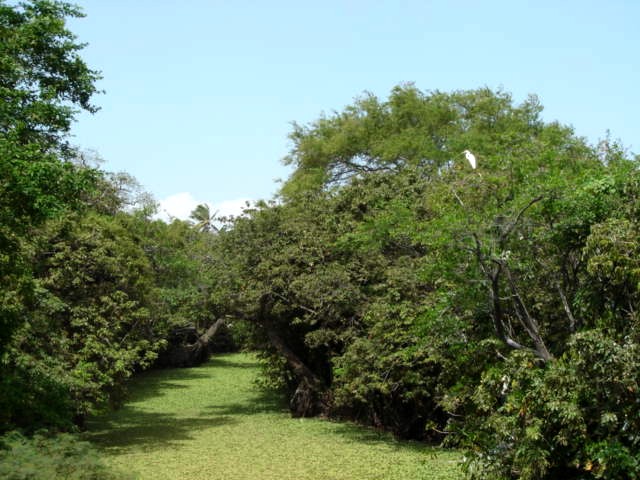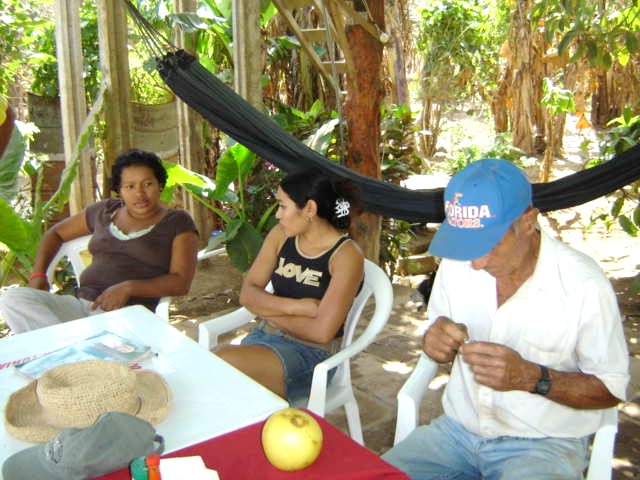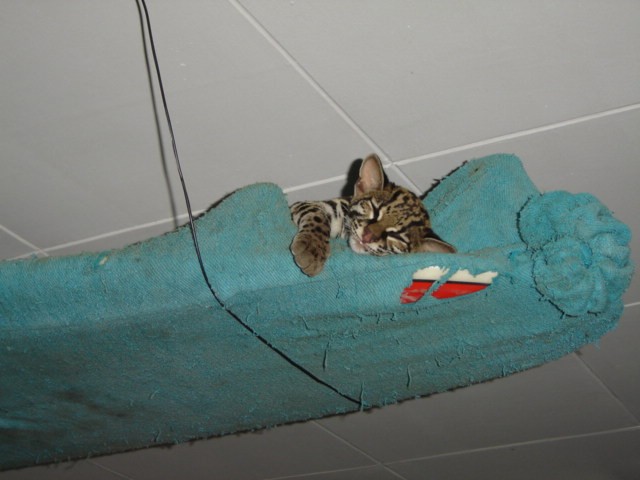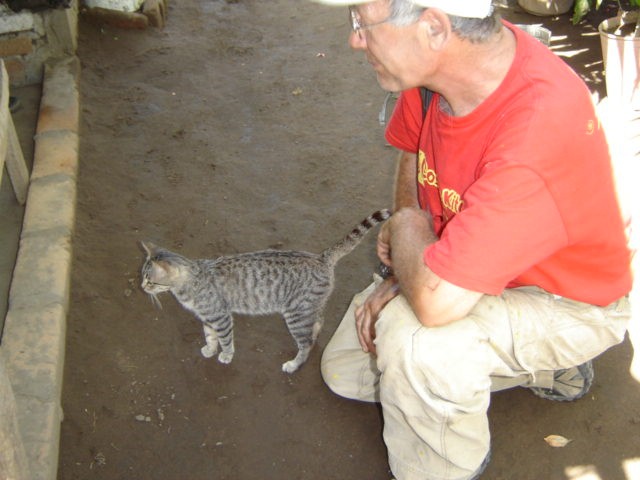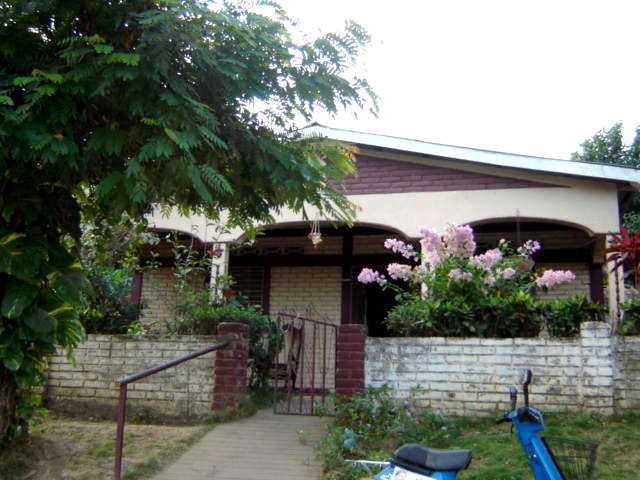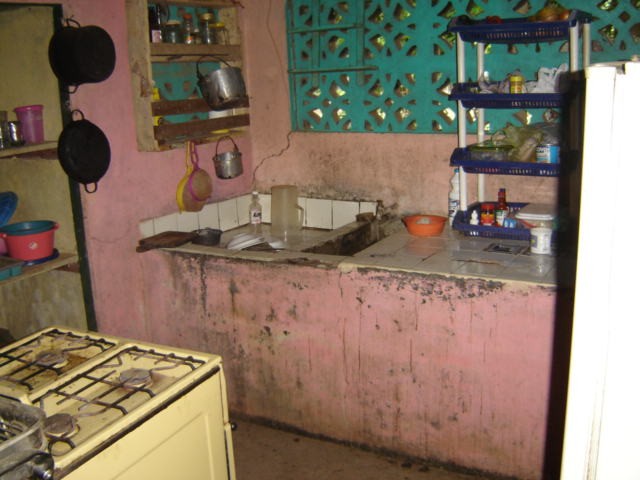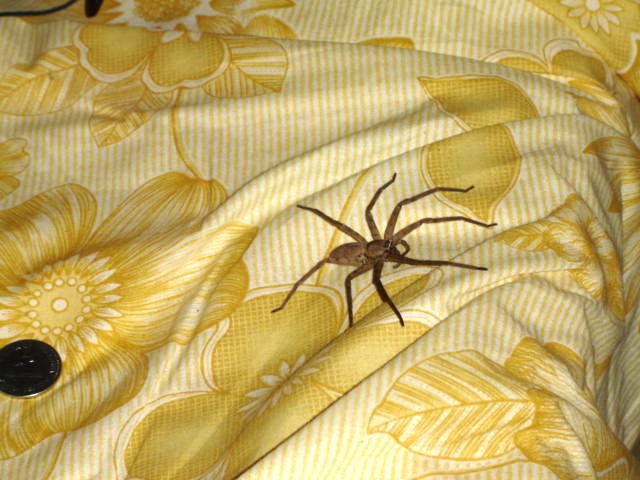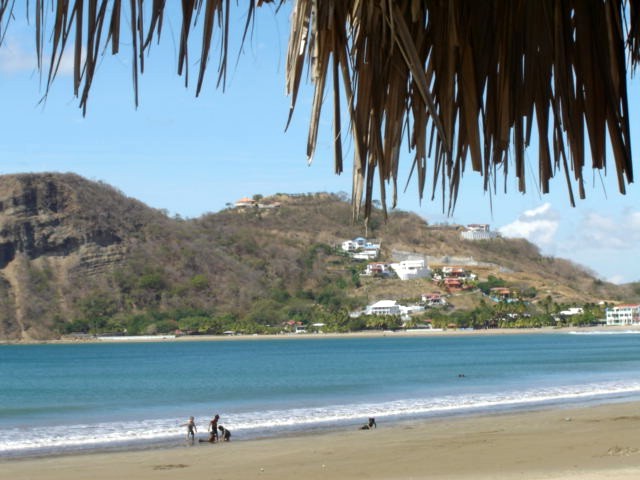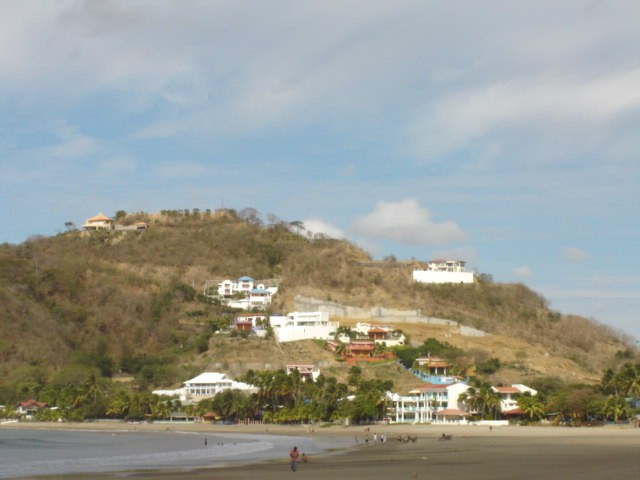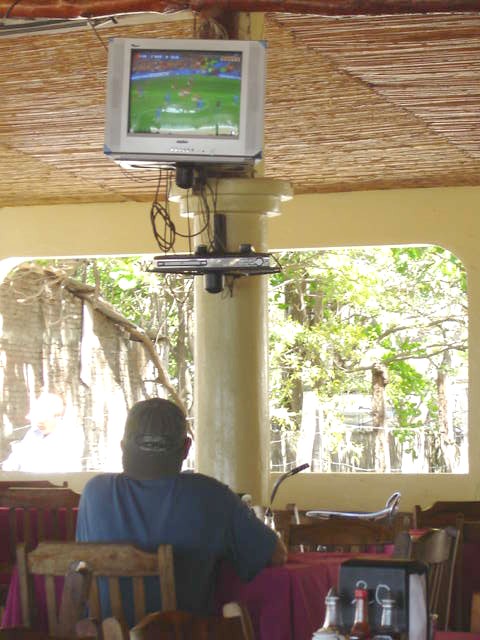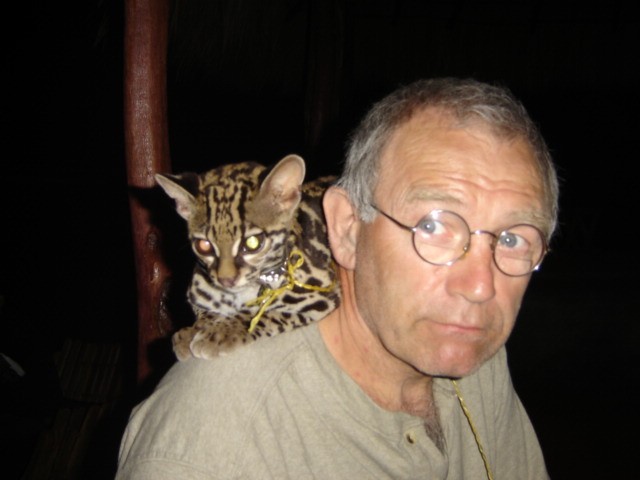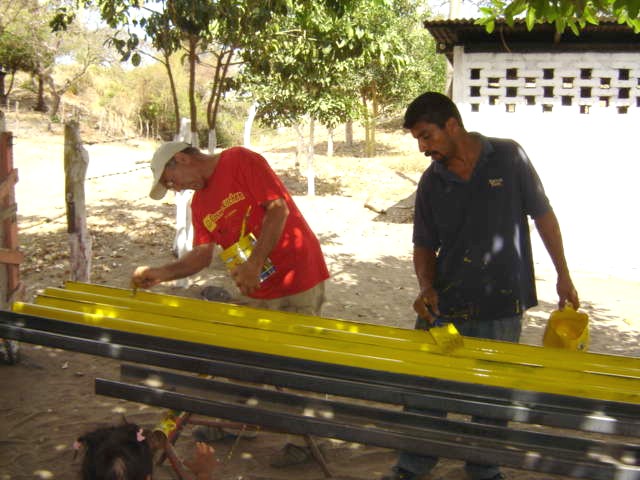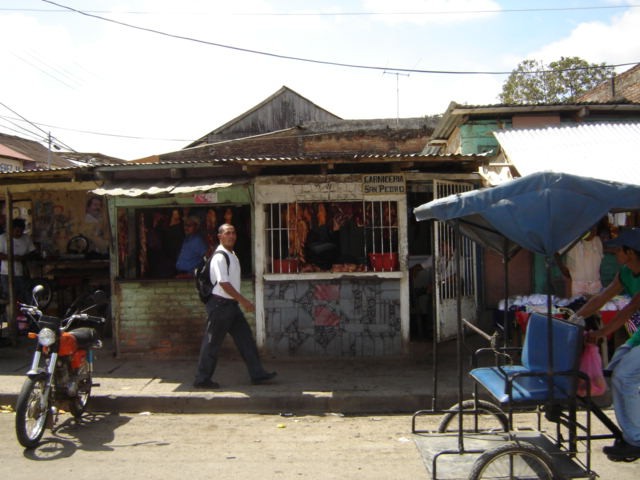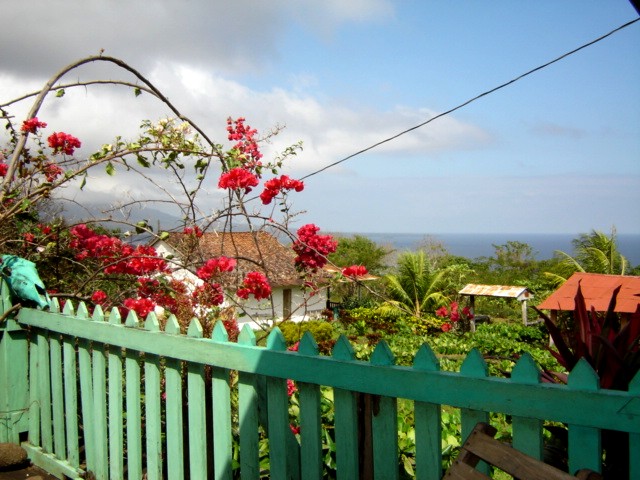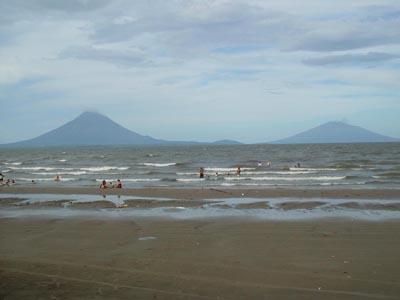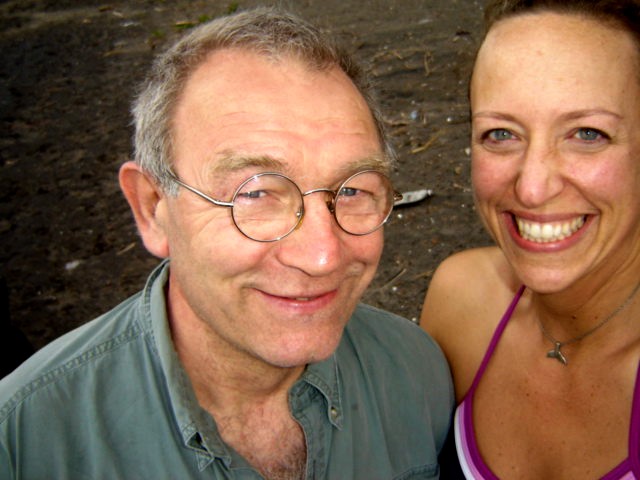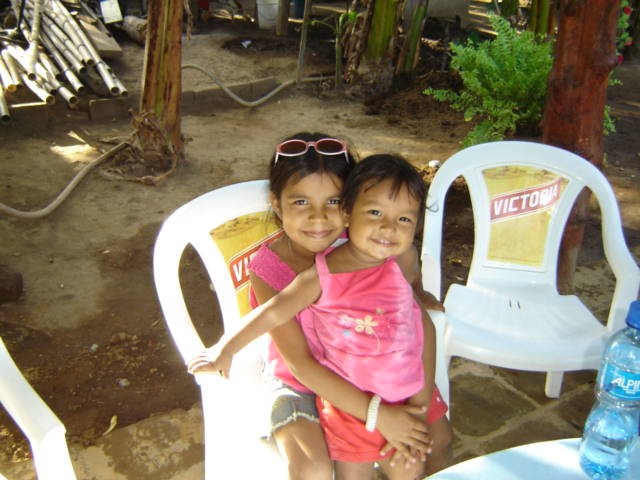June 11, 2007
I'm sitting at the gate at SeaTac, awaiting the final (air) leg of our journey back to Alaska. Pat is sitting beside me, happily immersed in a Louise Erdrich novel and trying to digest all of the amazing food we've been privileged to eat this weekend (thank you, Debby!)
So about that last night in Managua. It began innocuously enough. We rented some bits of metal, tentatively held together with other bits of metal and calling itself a car, as we didn't trust Edwin's chronically over-stressed truck to make it all the way up (let alone back). Plus it was likely to rain for much of the trip, and we had a fair pile of luggage and four people, none of whom relished riding in back. We arrived in Managua around 2pm, and went straight to Edwin's older brother Reinaldo's house. We'd brought the chainsaw along as Rei had mentioned something about wanted to limb the mango tree in his patio. As it turned out, he wanted roughly half the tree brought down, apparently because the falling leaves disturbed his neighbor, and the falling mangos disturbed his wife. We must have looked skeptical as he quickly reassured us that he himself was a friend to trees, but… The tree was pretty high, and Edwin refused to allow Pat to climb up and so went himself. Using a simplistic system of ropes, they managed, over a couple hours, to remove all of the offending limbs, with the only casualty being a two inch shallow gash on Pat's left temple, where he was struck by a swinging chunk of wood after Reinaldo let the rope go slack mid-lowering. All in all, a job well done.
By five o'clock everyone was more or less cleaned up, and we noticed that Rosario, Rei's wife, was busily setting up an elaborate shrine in front of the house. We know what that means: the Catholics are coming! I asked what was going on, and sure enough, it was Corpus Christi day, a big deal, and there would be a parade and many people from their church coming by, and….it was time to flee the premises. Edwin, Pat, and I leapt in the metal car-like thingy and escaped to visit his cousin Christina a couple barrios away. We stayed until 6:30 or so, then headed back to Rei's house, only to find it locked up tight, with everyone gone to church. Edwin suggested we wait them out a few blocks away at a funky Jamaican themed pub that the family had taken Pat to several months back. We headed over, intent on having a couple beers, and maybe a bowl of rondon, a coconut milk-based stew, and the main dietary staple of the Atlantic Coast. Somehow, a couple beers turned into many, and before we knew it, it was nearly 11pm, and Edwin and I were quite wobbly; Pat much less so, but he'd indulged in a few beers to mourn our last night, which to his alcohol-deprived system, had some effect. He was, however, clearheaded enough to drive, and in a few minutes we were back at Rei's. They dropped me off, then went to take the car over to the secured parking lot about two blocks away. And then they didn't come back. After about an hour, Rei went to the lot to see if they'd made it that far, and learned they'd pulled in, then told the attendant they'd be back shortly and left again. More time passed. Rei and Rosario went to bed, and exhorted me to do the same. Sure. I could sleep when we had to be at the airport by 5:30am, and my husband was missing somewhere in Managua, in a car from another region, with most of our luggage in the trunk. By 3:30am I was very distraught. (This is an extreme understatement.) I woke up Rosario, explaining that there was no logical reason for them not to be home, so couldn't we call the police or something?? She said not really, they wouldn't give us any information over the phone, and she and Rei refused to leave the house before daylight as they felt it was too dangerous.
Finally at 4:15 we heard a pounding on the door, and there was a very disheveled Pat. He told us that Edwin had been arrested and we had to go to the police station to try and get him out. He had a taxi waiting, so he, Rei, and I leapt in and we were off on an exhilarating, if somewhat terrifying, ride as we flew through the streets of Managua at speeds bordering on sonic. After ten minutes, we screeched to a halt in front of a light blue barricade: the ubiquitous color of all Nicaraguan police stations. On the way, Pat filled us in on what had transpired. It seems he and Edwin had decided to go for one last beer, and had somehow—possibly as a result of neither of them actually knowing the city—ended up in one of the dodgier barrios. They found a bar, ordered their beers, and sat back to watch the locals. One of which was prone on the floor, with his buddies trying unsuccessfully to pick him up. Pat immediately sprang into action, hauling the woozy Nica to his feet and onto his friends' shoulders. Having finished their beers, and aware that the rest of us were probably growing concerned, they headed home. Several blocks away, while stopped at a light, two men on a motorcycle pulled directly in front of them, approached the car, and demanded Edwin show them his papers. He refused, on the basis that they were in all likelihood up to no good. They insisted, however, and pulled him out of the car to make their point. As soon as Pat saw them roughing him up, he joined in the fray, at which point they suddenly found themselves surrounded by three uniformed National Police, and five red beret-wearing, Kalashnikov-wielding paramilitary. Pat and Edwin were soon handcuffed and placed in the back of a Police truck, Pat clipped to the rear roll bar, Edwin face down in the bed. He had, by that time, been punched in the eye, and kicked repeatedly in the ribs. Pat fared somewhat better, after responding to being pushed in the chest with an equally sharp shove to the face of the plainclothes cop. (You can take the boy out of Glasgow, but….) Apparently his Gringo-ness saved him from further abuse, a theory supported by the fact that once they arrived at the police station, Edwin was led away, while Pat was basically ignored. He spent the next few hours pleading with them to let him use the phone—they refused—and trying to soften them up by buying them cigarettes and sodas and phone cards—all to no avail. He tried to explain how he had friends who were cops back home, and maybe he could arrange for useful cop equipment to be donated to the station. Nada. Finally, after realizing he'd handed out $160 in small gifts to absolute no avail, he simply walked out of the station and found the cab that brought him home.
As soon as we returned, Rei, looking about as respectable as anyone possibly can, began talking to the officers, explaining about our early flight, and how our bags were in the car which they had impounded. He talked and talked, and then the cops talked for a while, and then no one talked, and eventually, at around 5:00am, they told us we could get the luggage, but that Edwin and the car had to stay till 10am. Although this was not the outcome we'd hoped for, it at least would enable us to catch our plane. So we all went outside and over to the car, but no one seemed to have the keys. The cops disappeared and a few minutes later returned with Edwin, who was looking extremely irritated. Now there were four cops, including the chief (imagine a miniature version of a 40-something Omar Sharif), and the three of us, standing around the car, which remained locked. Edwin told the chief he was very angry about being dragged from his car and beaten by non-uniformed cops, for no apparent reason. The chief asked him to point out who hit him, but of course those men were nowhere to be seen. When Edwin could not identify them, the chief shrugged and implied perhaps Edwin received his bruises elsewhere. Edwin asked if he was suggesting he beat up himself, and the chief just shrugged again and reminded Edwin he had been drinking… I coughed and looked at my watch which reminded Reinaldo of the time crunch, and he asked the cops again for the keys. At 5:20 they were finally produced, an $80 fine was paid, and Edwin and the car were allowed to leave, though Edwin's license will be suspended for three months. We raced to the house to get the rest of our stuff, then flew to the airport, arriving by 5:45. Quick goodbyes and we hurried to the ticket counter. Although we were nearly the last in line, we made it through with minutes to spare.
And we are left wondering: the car tries to kill us on the way to the airport leaving Anchorage in January; now all of this. Are we to expect drama before every departure? And....just one last picture, of the duck, the day we left. Little bugger's being cared for by our neighbors, but damn if we don't miss that incessant peeping...
Wednesday, June 13, 2007
Thursday, May 31, 2007
This may, or may not, be the final blog of this initial Nica experience. We'll see how the next week goes. As it is, we're scheduled to leave Managua on Fri. June 8, spend a few days on an island near Seattle visiting an old friend, then continuing on to Anchorage on the 11th. Depending on how things go with repairing the car, we should be back in Homer by the end of the week.
Although there are many reasons we are sad to be leaving, even temporarily, a new development has rendered us nearly paralytic in our desire to stay: we've adopted a baby duck. What happened was, I went along with Pat on one of his many chain sawing wood for the neighbors adventures, and as there was quite a lot of wood at this particular house (belonging to Walter, the young fisherman of a much earlier blog, and shared by two brothers, a grandmother, two wives, and at least four young children, including our buddy Donald), I was given one of the ubiquitous plastic stacking chairs to sit in and then one of the women came out holding this tiny duckling. Apparently its mother had been sold off too early and its egg was rammed under a hen until it hatched—at which point the hen noticed this chick was a bit odd looking and began to peck it to death. The kids saved it, just a few hours before we showed up, but the adults were ready to just let nature take its course—the duckling would make it, or not, without human interference. So they give the duckling to me to hold and somehow it ends up snuggled into my collarbone where it stays for the next couple hours until Pat's done. When I tried to give it back, it peeped as though its wee heart were breaking, so they told me it was mine to keep if I wanted it. Well if you've ever had the chance to hold a ducking, then you know I could no sooner have given it up than chopped off my left hand, and so the duckling came to be ours. Within hours it was running our lives, with us besotted, doing anything to keep it happy. We named it Einstein, mainly to amuse our friends who aside from not tending to name barnyard animals, certainly do not name them after world famous physicists. Reyna and Edwin have offered to take it in after we go, with Reyna attempting to assuage my remorse at abandoning him by assuring me that by the time we get back, he'll be big and probably ugly, and certainly ready to eat…Meanwhile, he sleeps with us at night for the warmth, and spend most of his days, when not splashing about in his little pool and eating, nestled in a bandana around one of our necks. Yes, there are pictures.
As far as the house goes, we're not quite as far along as we'd initially hoped…but at least the place is secure, and we managed to get a couple of the rooms painted. The final thing was to lay the floor tiles, but it turns out that the only place in SW Nicaragua to sell quality Saltillo (Mexican terracotta pavers) style tiles needs a month+ to prepare them (silly us, thinking we'd just go to the tile store and buy them), so we'll just order them and have them ready when we get back in September.
It has started to rain a bit, seldom for very long, and generally at the most inconvenient times, such as three minutes after I leave the house on my bike. As a precaution, I've taken to stuffing plastic grocery bags under my bike seat so at least I can keep things that prefer not to be rained on dry. And when the sun returns, usually within half an hour, you dry out very quickly. The other thing about the rain is, it makes Nica drivers, many of whom are what you might call, euphemistically, if you happened to be, say, Scottish, "fucking head cases", even worse. This is partly due to the fact that people here, for economic reasons, tend to keep their tires until they are smooth enough to drag a baby across, resulting in an insane amount of skidding, and partly the result of a disturbing lack of windshield wipers. Or, as I saw the other day, what appeared to be a pair of ragged socks attached to the wiper holders with bits of string. We now ride about in a heightened state of alertness, and so far have managed to avoid any unpleasant collisions.
As I write, there is yet another Evangelist sing-a-long taking place a few houses away. They have a large speaker set up in the street, and about 25 people are seated on blue plastic chairs facing a small stage. The preaching part seems to be over, and they have moved on to the yowling. I am quite sure tone deafness is a prerequisite to joining an Evangelist church here. There can be no other explanation for the eye-crossingly painful renditions of what might be, if emitted from other mouths, tolerable ballads. Of course there is a limit to what can be done with such soul-shaking lyrics as, "If you know Jesus, you know he's glorious", etc. Pat is lying in the hammock, ear plugs in, moaning softly for me to just kill him now to make it all stop. Although we will miss many things when we head back north, this is most definitely not one of them.
As a treat for our ever-growing crowd of beach kids, we decided to pile them into the truck, and along with Edwin's family, take everyone to a recently opened aquatic center in Potosi, about 15 minutes north of Buenos Aires. We arrived, four adults and thirteen children between two and fourteen, to find the place in the process of cleaning the pools (there are four of varying sizes and depths). Back into the truck to head to an older place with just one pool, where we were so horrified by the color and texture (yes, texture) of the water we tripped over one another getting back in the vehicle. By now the sky had clouded over and everyone was starving, so we decided to table the swimming idea and just headed to our favorite near-the-beach restaurant. We figured, correctly, that none of these kids had ever eaten in a restaurant before. We sat outside at little tropical tables, trying to ignore the amazing swarms of 'zayulies', tiny transparent gnat-like insects. The little bastards are completely harmless, but they appear near the beach occasionally in such colossal numbers and then just fly about for a while before dying in droves, ideally in your food or drink. The slightest puff of wind is enough to send them swirling away, and fortunately along with the darkening sky came some serious gusts, sparing us a total invasion. The kids were very excited, and a bit awed by everything. I ordered enough food for everyone, and the lovely waiter arranged for every kid to get his or her own plate individually served. Before and after the food, they played on the swing set and slide, also a new experience for most of them. (Rosita got to show off a bit here, as neither restaurants nor playground equipment are novelties to her.) We promised to try for the pools another day, but all in all, feeling like characters out of "Cheaper by the Dozen", we had a great time. And to feed all those hungry mouths, including full meals for the adults, with sodas and juices, and for Edwin and me, a couple beers, the bill came to $42 with tip, well worth every cordoba.
Yesterday may have set us on a new path here in Nicaragua: that of plantain farmers. We went with Edwin, his (Managua) brother Rei, his cousin Mario, and several nephews, to harvest a crop. They were at first very concerned, if not downright disturbed, by the idea of a woman joining in this typically male-dominated venture, but Edwin is by now used to my assumption that women are capable of doing any work men do, and I think by the end, the others were forced to agree. Their concern was not altogether misplaced however--this is hard work! You must first whack down the heavy cluster of platanos, then chop the tree down at about waist level. The bunches of fruit must then be hauled to the end of the row to await sorting and loading onto the truck, while the top half of the trees must be dragged out of the main path. We only did one section of around two acres or less, working for under two hours, but man, we were beat. The sun didn't help, nor the heat and humidity. And it's exceedingly dirty work as well, so everyone who makes a habit of this sort of thing has a set of clothes they use only for harvesting platanos. Pat of course took to it immediately. I was somewhat less enthused, eventually telling Edwin I definitely preferred working with salmon. Nevertheless, we are now talking seriously with Edwin and Rei about a possible future investment with them, perhaps forming a sort of cooperative. Vamos a ver…
Oh, and for the record, my throat is just fine, negative biopsy result, no worries.
Although there are many reasons we are sad to be leaving, even temporarily, a new development has rendered us nearly paralytic in our desire to stay: we've adopted a baby duck. What happened was, I went along with Pat on one of his many chain sawing wood for the neighbors adventures, and as there was quite a lot of wood at this particular house (belonging to Walter, the young fisherman of a much earlier blog, and shared by two brothers, a grandmother, two wives, and at least four young children, including our buddy Donald), I was given one of the ubiquitous plastic stacking chairs to sit in and then one of the women came out holding this tiny duckling. Apparently its mother had been sold off too early and its egg was rammed under a hen until it hatched—at which point the hen noticed this chick was a bit odd looking and began to peck it to death. The kids saved it, just a few hours before we showed up, but the adults were ready to just let nature take its course—the duckling would make it, or not, without human interference. So they give the duckling to me to hold and somehow it ends up snuggled into my collarbone where it stays for the next couple hours until Pat's done. When I tried to give it back, it peeped as though its wee heart were breaking, so they told me it was mine to keep if I wanted it. Well if you've ever had the chance to hold a ducking, then you know I could no sooner have given it up than chopped off my left hand, and so the duckling came to be ours. Within hours it was running our lives, with us besotted, doing anything to keep it happy. We named it Einstein, mainly to amuse our friends who aside from not tending to name barnyard animals, certainly do not name them after world famous physicists. Reyna and Edwin have offered to take it in after we go, with Reyna attempting to assuage my remorse at abandoning him by assuring me that by the time we get back, he'll be big and probably ugly, and certainly ready to eat…Meanwhile, he sleeps with us at night for the warmth, and spend most of his days, when not splashing about in his little pool and eating, nestled in a bandana around one of our necks. Yes, there are pictures.
As far as the house goes, we're not quite as far along as we'd initially hoped…but at least the place is secure, and we managed to get a couple of the rooms painted. The final thing was to lay the floor tiles, but it turns out that the only place in SW Nicaragua to sell quality Saltillo (Mexican terracotta pavers) style tiles needs a month+ to prepare them (silly us, thinking we'd just go to the tile store and buy them), so we'll just order them and have them ready when we get back in September.
It has started to rain a bit, seldom for very long, and generally at the most inconvenient times, such as three minutes after I leave the house on my bike. As a precaution, I've taken to stuffing plastic grocery bags under my bike seat so at least I can keep things that prefer not to be rained on dry. And when the sun returns, usually within half an hour, you dry out very quickly. The other thing about the rain is, it makes Nica drivers, many of whom are what you might call, euphemistically, if you happened to be, say, Scottish, "fucking head cases", even worse. This is partly due to the fact that people here, for economic reasons, tend to keep their tires until they are smooth enough to drag a baby across, resulting in an insane amount of skidding, and partly the result of a disturbing lack of windshield wipers. Or, as I saw the other day, what appeared to be a pair of ragged socks attached to the wiper holders with bits of string. We now ride about in a heightened state of alertness, and so far have managed to avoid any unpleasant collisions.
As I write, there is yet another Evangelist sing-a-long taking place a few houses away. They have a large speaker set up in the street, and about 25 people are seated on blue plastic chairs facing a small stage. The preaching part seems to be over, and they have moved on to the yowling. I am quite sure tone deafness is a prerequisite to joining an Evangelist church here. There can be no other explanation for the eye-crossingly painful renditions of what might be, if emitted from other mouths, tolerable ballads. Of course there is a limit to what can be done with such soul-shaking lyrics as, "If you know Jesus, you know he's glorious", etc. Pat is lying in the hammock, ear plugs in, moaning softly for me to just kill him now to make it all stop. Although we will miss many things when we head back north, this is most definitely not one of them.
As a treat for our ever-growing crowd of beach kids, we decided to pile them into the truck, and along with Edwin's family, take everyone to a recently opened aquatic center in Potosi, about 15 minutes north of Buenos Aires. We arrived, four adults and thirteen children between two and fourteen, to find the place in the process of cleaning the pools (there are four of varying sizes and depths). Back into the truck to head to an older place with just one pool, where we were so horrified by the color and texture (yes, texture) of the water we tripped over one another getting back in the vehicle. By now the sky had clouded over and everyone was starving, so we decided to table the swimming idea and just headed to our favorite near-the-beach restaurant. We figured, correctly, that none of these kids had ever eaten in a restaurant before. We sat outside at little tropical tables, trying to ignore the amazing swarms of 'zayulies', tiny transparent gnat-like insects. The little bastards are completely harmless, but they appear near the beach occasionally in such colossal numbers and then just fly about for a while before dying in droves, ideally in your food or drink. The slightest puff of wind is enough to send them swirling away, and fortunately along with the darkening sky came some serious gusts, sparing us a total invasion. The kids were very excited, and a bit awed by everything. I ordered enough food for everyone, and the lovely waiter arranged for every kid to get his or her own plate individually served. Before and after the food, they played on the swing set and slide, also a new experience for most of them. (Rosita got to show off a bit here, as neither restaurants nor playground equipment are novelties to her.) We promised to try for the pools another day, but all in all, feeling like characters out of "Cheaper by the Dozen", we had a great time. And to feed all those hungry mouths, including full meals for the adults, with sodas and juices, and for Edwin and me, a couple beers, the bill came to $42 with tip, well worth every cordoba.
Yesterday may have set us on a new path here in Nicaragua: that of plantain farmers. We went with Edwin, his (Managua) brother Rei, his cousin Mario, and several nephews, to harvest a crop. They were at first very concerned, if not downright disturbed, by the idea of a woman joining in this typically male-dominated venture, but Edwin is by now used to my assumption that women are capable of doing any work men do, and I think by the end, the others were forced to agree. Their concern was not altogether misplaced however--this is hard work! You must first whack down the heavy cluster of platanos, then chop the tree down at about waist level. The bunches of fruit must then be hauled to the end of the row to await sorting and loading onto the truck, while the top half of the trees must be dragged out of the main path. We only did one section of around two acres or less, working for under two hours, but man, we were beat. The sun didn't help, nor the heat and humidity. And it's exceedingly dirty work as well, so everyone who makes a habit of this sort of thing has a set of clothes they use only for harvesting platanos. Pat of course took to it immediately. I was somewhat less enthused, eventually telling Edwin I definitely preferred working with salmon. Nevertheless, we are now talking seriously with Edwin and Rei about a possible future investment with them, perhaps forming a sort of cooperative. Vamos a ver…
Oh, and for the record, my throat is just fine, negative biopsy result, no worries.
Sunday, May 13, 2007
May 5, 07
After two & a half weeks of smoothly paved roads (well, other than some sections of Queens), hot showers, and the glorious absence of ants, I'm back in Nicaragua. Man, I really missed it! The day after I got back I went to see a dermatologist in Managua about a small but relatively new mole on my throat. He peered at it intently and then announced it would be a good idea to remove it for a biopsy (everyone's favorite word). So right then and there he had me up on the table, jabbed some anesthetic into my neck, and began cutting. I can't really say it hurt, but it was an odd sensation. I asked if I'd have a scar, to which he replied, "Do you want one?" "Why not?" I said. "It would be 'salvaje' (really cool)." It was all over in about half an hour. I go back in a week to have the stitches out, but it'll be two weeks before the biopsy results are back. Since he didn't appear unduly concerned, I've elected not to be either.
The trip back to Buenos Aires went well until we were about 40 minutes north of town and the truck (Pat had borrowed Edwin's pickup) ceased moving forward. It was around 7pm, just after dark. We coasted onto the shoulder and Pat got out to look under the hood. I think we probably had the hood up for at least twenty minutes and while dozens of vehicles passed us, not one stopped. Coming from Alaska where it's more unusual if someone doesn't stop, this was a bit disturbing. When I told Reyna about it later (we called Edwin and he borrowed another truck and arrived in about an hour with the cavalry: Reyna, the girls, and Emer, the boy next door), she said it was because everyone knew that was the most common ruse for highway robbery—you pull over to help someone supposedly in need and hey presto, they steal your car and everything else. She went on to say we were lucky no one noticed we were Gringos or the situation might have become dire… We eventually had to tow the truck back, and should know in a few days what the problem is and how many appendages will be required to fix it. (Update: quite a few things, apparently, need replacing, to the tune of $600. Edwin says that's pretty much all parts; the labor should come in around $50…)
On my second day home we rode our bikes out to see the house—with all the windows and the door installed. The work was done a few days before I returned, and Pat had told me I would like it. He was wrong. I love it. The wood is so gorgeous, rich and heavy, full of texture and patterns. The door, which I'd just done a rough (very rough) sketch of, came out even better than I'd imagined. It's a 'Dutch door", allowing us to open it all the way or just the bottom half. All we need now is the hardware—locks, door handle, and a system for raising the lower half of the living room windows, and we're set.
A couple days on and we were back out there scrubbing the walls of several years' accumulation of mold, mildew, and the remnants of insects birthing habitats. This would've been fairly grueling work were we not assisted by no less than nine neighborhood kids, ranging in age from three to thirteen. The three year old accomplished much by running between our legs imitating some sort of spastic cicada until I gently (OK, not so gently) lifted him by an arm and ankle and helped him fly outside. Unfortunately he enjoyed this action and pestered me for a repeat until I was forced to use the ultimate threat, "Ask me once more and you are banned from the property for a whole day." Very effective when your house is THE place to be. By the mid-afternoon the place was looking paint-ready, so we handed out the wages and headed to town for more supplies.
Did I mention already that Reyna & Edwin purchased a piglet? Probably not as I only just learned about it prior to my trip, although it turned out they had already had it for a couple weeks. (It was actually Pat who discovered the wee beastie in a pen behind their house.) When I confronted Reyna, "I hear you have a chanchito (piglet)", she said, with a remarkably straight face, "No we don't." "But Pat saw it! It's just over there, in a pen." "Oh, that pig. Well, yes, we have that pig." "Why didn't you tell me? I love piglets. He's so cute, and…" "Ok, this is exactly why I didn't tell you about the pig, because I knew you'd react like this and the fact is we bought the pig for Milagro's belated christening in June. We're going to eat the pig. I don't want you getting attached to the main course." (I may be paraphrasing a bit in the translation, but this is damn close to accurate, and a bit disconcerting that she has me sussed in so short a time…) I pouted for a few minutes before determining that this party won't occur until after we're gone, thus sparing me having to partake of the pig, and therefore allowing me to fraternize with it more or less guilt-free. And in fact, here it is several weeks later, the chanchito has grown a bit, and has the run of the place, and now Pat has grown very fond of it, convinced it is a "special" pig and has gone so far as to offer to buy its freedom in exchange for another, less intriguing swine. Since Edwin and Reyna assumed he was joking, we haven't gotten an answer yet. I will photograph Pig tomorrow (our one concession to E & R: we haven't named the critter. Yet.)
I think we must be really starved for animal love because in addition to courting Pig, we've also been assiduously wooing three teenaged chickens from across the street. Chickens here have the run of the country until their owners decide it's time for soup, and often wander into neighboring yards in search of grub. These three, Thelma (my favorite), Louise, and Buddy, actually come when called and will eat whatever goodies we toss down mere inches from our feet. Thelma, whom I like to believe recognizes our growing bond, will eat her fill (she prefers my overpriced American-style granola), then drop into roost position next to my rocking chair on the porch and remain there, seemingly contented, for ages. She kind of looks like a chicken version of our deceased cat Nitza, which may account for the warm fuzzy feelings she brings out in me.
On a final note about local fauna, last night were forced to euthanize the poor rat (the cute kind) that found itself caught in Reinaldo's evil snap trap. He reset it later, but we sprang it, and this morning I found another wee beastie in the more humane cage trap. Reinaldo had gone to have breakfast, so Pat grabbed the trap and released the rat into the yard on its own recogniscence and a vow to hunt in someone else's kitchen. It would be much easier if Reinaldo would just consent to a cat…
After two & a half weeks of smoothly paved roads (well, other than some sections of Queens), hot showers, and the glorious absence of ants, I'm back in Nicaragua. Man, I really missed it! The day after I got back I went to see a dermatologist in Managua about a small but relatively new mole on my throat. He peered at it intently and then announced it would be a good idea to remove it for a biopsy (everyone's favorite word). So right then and there he had me up on the table, jabbed some anesthetic into my neck, and began cutting. I can't really say it hurt, but it was an odd sensation. I asked if I'd have a scar, to which he replied, "Do you want one?" "Why not?" I said. "It would be 'salvaje' (really cool)." It was all over in about half an hour. I go back in a week to have the stitches out, but it'll be two weeks before the biopsy results are back. Since he didn't appear unduly concerned, I've elected not to be either.
The trip back to Buenos Aires went well until we were about 40 minutes north of town and the truck (Pat had borrowed Edwin's pickup) ceased moving forward. It was around 7pm, just after dark. We coasted onto the shoulder and Pat got out to look under the hood. I think we probably had the hood up for at least twenty minutes and while dozens of vehicles passed us, not one stopped. Coming from Alaska where it's more unusual if someone doesn't stop, this was a bit disturbing. When I told Reyna about it later (we called Edwin and he borrowed another truck and arrived in about an hour with the cavalry: Reyna, the girls, and Emer, the boy next door), she said it was because everyone knew that was the most common ruse for highway robbery—you pull over to help someone supposedly in need and hey presto, they steal your car and everything else. She went on to say we were lucky no one noticed we were Gringos or the situation might have become dire… We eventually had to tow the truck back, and should know in a few days what the problem is and how many appendages will be required to fix it. (Update: quite a few things, apparently, need replacing, to the tune of $600. Edwin says that's pretty much all parts; the labor should come in around $50…)
On my second day home we rode our bikes out to see the house—with all the windows and the door installed. The work was done a few days before I returned, and Pat had told me I would like it. He was wrong. I love it. The wood is so gorgeous, rich and heavy, full of texture and patterns. The door, which I'd just done a rough (very rough) sketch of, came out even better than I'd imagined. It's a 'Dutch door", allowing us to open it all the way or just the bottom half. All we need now is the hardware—locks, door handle, and a system for raising the lower half of the living room windows, and we're set.
A couple days on and we were back out there scrubbing the walls of several years' accumulation of mold, mildew, and the remnants of insects birthing habitats. This would've been fairly grueling work were we not assisted by no less than nine neighborhood kids, ranging in age from three to thirteen. The three year old accomplished much by running between our legs imitating some sort of spastic cicada until I gently (OK, not so gently) lifted him by an arm and ankle and helped him fly outside. Unfortunately he enjoyed this action and pestered me for a repeat until I was forced to use the ultimate threat, "Ask me once more and you are banned from the property for a whole day." Very effective when your house is THE place to be. By the mid-afternoon the place was looking paint-ready, so we handed out the wages and headed to town for more supplies.
Did I mention already that Reyna & Edwin purchased a piglet? Probably not as I only just learned about it prior to my trip, although it turned out they had already had it for a couple weeks. (It was actually Pat who discovered the wee beastie in a pen behind their house.) When I confronted Reyna, "I hear you have a chanchito (piglet)", she said, with a remarkably straight face, "No we don't." "But Pat saw it! It's just over there, in a pen." "Oh, that pig. Well, yes, we have that pig." "Why didn't you tell me? I love piglets. He's so cute, and…" "Ok, this is exactly why I didn't tell you about the pig, because I knew you'd react like this and the fact is we bought the pig for Milagro's belated christening in June. We're going to eat the pig. I don't want you getting attached to the main course." (I may be paraphrasing a bit in the translation, but this is damn close to accurate, and a bit disconcerting that she has me sussed in so short a time…) I pouted for a few minutes before determining that this party won't occur until after we're gone, thus sparing me having to partake of the pig, and therefore allowing me to fraternize with it more or less guilt-free. And in fact, here it is several weeks later, the chanchito has grown a bit, and has the run of the place, and now Pat has grown very fond of it, convinced it is a "special" pig and has gone so far as to offer to buy its freedom in exchange for another, less intriguing swine. Since Edwin and Reyna assumed he was joking, we haven't gotten an answer yet. I will photograph Pig tomorrow (our one concession to E & R: we haven't named the critter. Yet.)
I think we must be really starved for animal love because in addition to courting Pig, we've also been assiduously wooing three teenaged chickens from across the street. Chickens here have the run of the country until their owners decide it's time for soup, and often wander into neighboring yards in search of grub. These three, Thelma (my favorite), Louise, and Buddy, actually come when called and will eat whatever goodies we toss down mere inches from our feet. Thelma, whom I like to believe recognizes our growing bond, will eat her fill (she prefers my overpriced American-style granola), then drop into roost position next to my rocking chair on the porch and remain there, seemingly contented, for ages. She kind of looks like a chicken version of our deceased cat Nitza, which may account for the warm fuzzy feelings she brings out in me.
On a final note about local fauna, last night were forced to euthanize the poor rat (the cute kind) that found itself caught in Reinaldo's evil snap trap. He reset it later, but we sprang it, and this morning I found another wee beastie in the more humane cage trap. Reinaldo had gone to have breakfast, so Pat grabbed the trap and released the rat into the yard on its own recogniscence and a vow to hunt in someone else's kitchen. It would be much easier if Reinaldo would just consent to a cat…
Monday, April 9, 2007
April 9, 2007
Well sorry for the delay (I’m sure you have all been on tenterhooks), but Nicaragua just reopened after shutting down entirely for nearly a week to celebrate Semana Santa, or Holy Week. This is accomplished by moving en masse to every available beach and drinking themselves into a collective stupor for five days. Oh, there’s lot’s of splashing about in the water, frolicking children (most of whom are not drunk), and dancing in the sand as well, but it’s really all about the drinking. To aid and abet this respected tradition, we turned out house and grounds over to Edwin & Reyna to run beach business. They brought out truckloads of stuff, and Edwin basically moved into the house for two weeks to guard everything. They sold gallons of beer, rum, guarón, and plate loads of fried chicken, fish, and pork, cups of ceviché, etc. The jukebox was out there, so the music blasted all day and into the night. We spent the better part of every day out there with them, if not exactly helping, at least supporting the business. We brought everyone we know out as well, and there was much revelry and dancing under the palapa. We swam and played with all the kids, both the beach variety and Rosita & Milagro, Edwin’s girls. His brothers came down and joined in, along with various other family members (he’s related to half of Buenos Aires), and all in all, had a good week. And now, back to business as usual.
A few days back, to celebrate the end of "acknowledging San Jose" week, Edwin & family invited us to "los toros", or what passes in Buenos Aires for a rodeo. As with the circus, the event was posted to begin at 7pm, we arrived at 7:45 and had our choice of seats in an empty arena, and the event got underway somewhere around 8:30. Pat and I amused ourselves in the interval by counting public safety violations, beginning with the structure itself. If you've ever wondered where stray bits of wood go when they've outlived their apparent usefulness, I can tell you o good authority that they end up in rural Nicaragua, clinging to one another regardless of length, width, or thickness, and managing to form a split-level four-sided balcony-like wonder on which were placed two rows of wooden and plastic chairs, teetering on their uneven perches. To get up to this upper level we had to ascend a stairway that must have begun its life atop a ship's mast, permitting entry to the crow's nest, and even then only the most intrepid, or intoxicated, sailors would have dared attempt it. Once secured to our wobbly seats, we looked down into the 'ring' at the dozen bulls selected for the evening's entertainment. Right off the bat I said, "Look—it's Ferdinand!" and then explained to Pat that Ferdinand was a famous bull from a children's story, a bull that while raised for the bull ring, preferred to lie about in fields gazing rhapsodically at daisies. Why Ferdinand didn't end up as oxtail soup eludes me, but I know the story enchanted me as a child, and caused me to immediately throw all my somewhat limited bull-riding enthusiasm behind his Nicaraguan cousin. Actually, I think I said something like, "Whoever gets that bull better bring a book; it's gonna be a very relaxing ride."
We knew the spectacle was poised to begin when the six-piece brass band struck up a joyous, ear-splitting version of "When the Saints Come Marching In" approximately eight feet from our seats. Within minutes, the dusty arena floor was filled with over 50 young men and boys, many of them barefoot, and all of them attempting to coax the bulls into the holding pen at one end. They employed various tactics, depending on their experience and level of sobriety, and after twenty minutes of hollering, lariat flinging, and general mayhem, the last, clearly irritated bull was ushered behind the gate. Most of the seats were taken by now, although since this was the last night of five, and a Monday, the crowd was less than exuberant. After another 20 minutes had crept by, the band started up again, the milling males faced front, and then the gate swung open, releasing a very distressed bull (no doubt the result of having his testicles trussed up like a Christmas goose) mounted by a young man sporting a Nike cap and rubber bones. He managed to stay on long enough to loosen the truss to the point the bull stopped trying to launch him into the stands, but was still tight enough to keep the bull charging at the brazen (or drunk) machistos flinging themselves in his path. At every charge they would scurry to the sides of the arena and leap up on the chicken wire fencing, directly at our feet. After ten minutes or so of this, the rider removed the truss completely and a barrel-chested, pony-tailed specimen came out with a lasso and neatly roped the bull about the horns and battled for a while to get him into the pen, to the semi-enthused cheers of the audience. This process was repeated several more times before Ferdinand II arrived. Either they didn't tie up his personal bits with the same tension as his predecessors, or he just couldn't be bothered, because other than one rather comical leap straight up in the air as he left the enclosure, he just wandered about the ring looking lost until the lasso guy came back out. This must have rung a bell of some sort, because upon seeing the rope, he immediately headed over to the gate and stood there until someone thought to open it. The rider woke up about then and they rode out. The only sound in the arena was the throbbing bass beat from the disco-in-a-shack next door.
We were pretty much ready to go by this point, but Reyna told us we had to wait a bit longer, for the grand finale. Well, anyone who's given to PETA might want to stop reading at this point…The band launched a spirited cover of "We are the Champions", the gate flew open, and out charged a large white Brahma with a small monkey firmly anchored to its back. The monkey, a type of spider monkey I believe, was screaming like only a creature tied to a much larger, very distraught animal can scream, waving its arms around, and generally conveying the entirety of its displeasure. I was stunned, appalled, and desperately trying to get a picture, but my wee camera was no match for the blazing lights and the speed of the Brahma. (I learned the next day that the monkey is called Celia and according to my source, is a bit of a drama queen.) As the odd couple disappeared behind the gate, we grabbed the children and fled. I can't wait till next year.
We are now firmly entrenched in Semana Santa, Saints Week, the eight days leading up to Easter when this country ceases all activity save for heading to the beach and partying like it's Spring Break in Aruba only with marginally more clothing and no sign of beer bongs or wet t-shirt contests. We turned the house and grounds over to Edwin & Reyna to run a little bar business, and now the place looks like a full-scale restaurant complete with beer coolers and advertising banners. Hopefully all their work will pay off over the next few days; rumor has it these temporary operations can be insanely profitable. Meanwhile, it's been kind of fun to see so much energy and activity in and around our still nascent home. We got the bars all finished just in time, and they are attracting a fair bit of attention. The neighbors at first thought it was some sort of spider's web, until the sea creatures began appearing…
Several people have asked me how I'm coping with life in a macho culture. Well, Nicaragua's funny that way. On the one hand, it shares traits with many of its neighbors: men are openly and unabashedly given to catcalling and other, mainly verbal, forms of female "appreciation", and it's generally assumed they will have girlfriends and bits on the side throughout their marriages—if they ever do actually marry. They drink a lot, and domestic abuse and incest are distressingly common, with little recourse for the victims. But: thanks to the Revolution of '79 and the subsequent eleven years of Sandinista government, many women found themselves in positions of power, commanding military units, heading up government posts, and so on. They either did not have babies, or had them and left them behind with grandmothers and other relatives to return to the front and to their responsibilities. Many began to emulate their male counterparts by taking lovers and generally taking control of their romantic and sexual needs. The result now, nearly 30 years on, is that many women are still in those positions of power (I don't have the stats, but a many mayors and other government positions are held by women), while others run their own businesses or have become doctors, lawyers, etc. I heard from a Canadian woman that she had a terrible time in Chile when she and her family lived there for nearly a year, because all the men were constantly sexually harassing her, and the women despised her for, they believed, wanting to steal their men. It's not like that here. Although the men do not, as mentioned earlier, hide their 'appreciation', the majority of women seem to believe that most of their men are such fuckups, why would any self-respecting Gringa want to bother with them? I can generally disarm any remotely concerned looking woman in seconds simply by making it clear that I have my own husband who, although I adore him, is still "a guy", with all that entails…knowing roll of the eyes…and much head-shaking laughter.
We took a mini-excursion up to Granada and nearby Lake Apoyo last Sunday-Monday. Our goal was to meet the (Belgian) friend of the son of a friend of my mom's, and also the (American) friend of some friends down here. We succeeded with the latter, and spent the night at Fred's place. He's been down here about eleven years, and has built himself a beautiful place at the edge of the volcanic crater lake now known as Apoyo. A salvage nut, he collected many of the beams, doors, tiles, and stones of old dwellings around Granada, in the years preceding the current real estate boom driven primarily by North Americans. He now has a main house, and a couple guest places which he rents out by night or long-term, all of which he shares with Carmen, his lovely young wife, three dogs and three cats, one of which attached itself to us and made our stay that much more enjoyable as we are both starved for kitty-love. We wandered around Granada for a bit, admiring the beautifully restored colonial architecture, gorging on American-style breakfasts at a local ex-pat hangout, and dropping our jaws at the $8 bottle of fish sauce at what has to be the world's most eclectic deli. Tins of mackerel next to tubes of wasabi; a family-size jar of Skippy sharing the shelf with a bag of marshmallows and tiny elegant containers of French country mustard. There was some sort of fútbol tournament going on right in the main plaza, with dozens of boys sporting shirts from various schools yelling enthusiastically from the sidelines as their mates pounded the stones amidst the sweating, gawking turistas, venders hawking tiny clay whistles and bags of cashews, and ragged red-nosed children begging to support their sniffing habits. Granada is a lovely city, but the sheer number of Gringos made us feel uncomfortable, particularly as most of them (tourists not included) are obsessed with real estate, and anytime we tuned into a conversation around us, the speaker, more often than not expensively-attired, cell phone gripping men in their 30's-50's, would be aggressively discussing the market, sounding like extras from a Mamet play, and begging to be run over by a chicken bus.
There was a young Swedish couple also staying at Fred's but planning an excursion to Omotepe. We gave them a ride down, stopping at our place for a beer and to show them around a bit. He was a gentle giant—easily 6'3, with startlingly clear blue eyes and several feet of thick, blond, wild dreadlocks, which filled Reyna and the girls with curiosity and awe ("are they soft? How does he wash it?"), while the girlfriend was a tiny, angelic creature with a surprisingly deep voice and strong opinions on alternative energy and no qualms about peeing in a bush behind the house. They are both dreaming of escaping Sweden (we had fun comparing life in Sweden and Alaska—the differences are few) for Nicaragua or perhaps Guatemala, opening a restaurant on a beach, and pursuing a less goal-driven life.
Last Saturday we were invited to the wedding of another American ex-pat, RT (59) and his beautiful Nica wife, Sonja (26). Pat and I both think she's wonderful, and are not entirely clear on what she sees in RT, but what the hell, they both seem happy enough. The wedding was held in his rented house in Rivas, one of the older, traditional style places with several huge rooms, a big open yard, and occasionally a cool breeze. They were married by a lawyer who stood up and introduced them to the guests as "The North American Ruben Theodore and the young Sonja" resulting in muffled snorts of laughter from most of the Gringos in the room. The ceremony took about 15 minutes, but the reception lasted hours with everyone getting increasingly soused, including RT's right-hand man who had been instructed to take pictures of everyone with whatever cameras he could get his shaking hands on. Suffice to say many people will be wandering why they have thirty-seven pictures of utter strangers amongst their wedding shots. We finally made our getaway when it became apparent that the groom was no longer sure who we were and left him fuming over one of his new neighbors crashing the party and drinking his (mostly wedding-gift) booze.
Finally, I began a small English class here in Buenos Aires. I teach out of the front room of the house, and have four students: Edwin, Emer (a 17 y.o. uni student who lives nearby and works at Reyna's on weekends), Julio (20 y.o. law student), and Manuel (12 y.o. prodigy). The fact they all know each other compensates for the age differences, and we've been having fun so far. It feels good to be teaching again; I knew I missed it, but hadn't admitted just how much. I'll keep to this group until we head back to AK in June, but when I return in the fall, I will begin getting a more substantial school up and running. All I need is a decent building, materials, and a few dozen students—should be a piece of cake.
Well sorry for the delay (I’m sure you have all been on tenterhooks), but Nicaragua just reopened after shutting down entirely for nearly a week to celebrate Semana Santa, or Holy Week. This is accomplished by moving en masse to every available beach and drinking themselves into a collective stupor for five days. Oh, there’s lot’s of splashing about in the water, frolicking children (most of whom are not drunk), and dancing in the sand as well, but it’s really all about the drinking. To aid and abet this respected tradition, we turned out house and grounds over to Edwin & Reyna to run beach business. They brought out truckloads of stuff, and Edwin basically moved into the house for two weeks to guard everything. They sold gallons of beer, rum, guarón, and plate loads of fried chicken, fish, and pork, cups of ceviché, etc. The jukebox was out there, so the music blasted all day and into the night. We spent the better part of every day out there with them, if not exactly helping, at least supporting the business. We brought everyone we know out as well, and there was much revelry and dancing under the palapa. We swam and played with all the kids, both the beach variety and Rosita & Milagro, Edwin’s girls. His brothers came down and joined in, along with various other family members (he’s related to half of Buenos Aires), and all in all, had a good week. And now, back to business as usual.
A few days back, to celebrate the end of "acknowledging San Jose" week, Edwin & family invited us to "los toros", or what passes in Buenos Aires for a rodeo. As with the circus, the event was posted to begin at 7pm, we arrived at 7:45 and had our choice of seats in an empty arena, and the event got underway somewhere around 8:30. Pat and I amused ourselves in the interval by counting public safety violations, beginning with the structure itself. If you've ever wondered where stray bits of wood go when they've outlived their apparent usefulness, I can tell you o good authority that they end up in rural Nicaragua, clinging to one another regardless of length, width, or thickness, and managing to form a split-level four-sided balcony-like wonder on which were placed two rows of wooden and plastic chairs, teetering on their uneven perches. To get up to this upper level we had to ascend a stairway that must have begun its life atop a ship's mast, permitting entry to the crow's nest, and even then only the most intrepid, or intoxicated, sailors would have dared attempt it. Once secured to our wobbly seats, we looked down into the 'ring' at the dozen bulls selected for the evening's entertainment. Right off the bat I said, "Look—it's Ferdinand!" and then explained to Pat that Ferdinand was a famous bull from a children's story, a bull that while raised for the bull ring, preferred to lie about in fields gazing rhapsodically at daisies. Why Ferdinand didn't end up as oxtail soup eludes me, but I know the story enchanted me as a child, and caused me to immediately throw all my somewhat limited bull-riding enthusiasm behind his Nicaraguan cousin. Actually, I think I said something like, "Whoever gets that bull better bring a book; it's gonna be a very relaxing ride."
We knew the spectacle was poised to begin when the six-piece brass band struck up a joyous, ear-splitting version of "When the Saints Come Marching In" approximately eight feet from our seats. Within minutes, the dusty arena floor was filled with over 50 young men and boys, many of them barefoot, and all of them attempting to coax the bulls into the holding pen at one end. They employed various tactics, depending on their experience and level of sobriety, and after twenty minutes of hollering, lariat flinging, and general mayhem, the last, clearly irritated bull was ushered behind the gate. Most of the seats were taken by now, although since this was the last night of five, and a Monday, the crowd was less than exuberant. After another 20 minutes had crept by, the band started up again, the milling males faced front, and then the gate swung open, releasing a very distressed bull (no doubt the result of having his testicles trussed up like a Christmas goose) mounted by a young man sporting a Nike cap and rubber bones. He managed to stay on long enough to loosen the truss to the point the bull stopped trying to launch him into the stands, but was still tight enough to keep the bull charging at the brazen (or drunk) machistos flinging themselves in his path. At every charge they would scurry to the sides of the arena and leap up on the chicken wire fencing, directly at our feet. After ten minutes or so of this, the rider removed the truss completely and a barrel-chested, pony-tailed specimen came out with a lasso and neatly roped the bull about the horns and battled for a while to get him into the pen, to the semi-enthused cheers of the audience. This process was repeated several more times before Ferdinand II arrived. Either they didn't tie up his personal bits with the same tension as his predecessors, or he just couldn't be bothered, because other than one rather comical leap straight up in the air as he left the enclosure, he just wandered about the ring looking lost until the lasso guy came back out. This must have rung a bell of some sort, because upon seeing the rope, he immediately headed over to the gate and stood there until someone thought to open it. The rider woke up about then and they rode out. The only sound in the arena was the throbbing bass beat from the disco-in-a-shack next door.
We were pretty much ready to go by this point, but Reyna told us we had to wait a bit longer, for the grand finale. Well, anyone who's given to PETA might want to stop reading at this point…The band launched a spirited cover of "We are the Champions", the gate flew open, and out charged a large white Brahma with a small monkey firmly anchored to its back. The monkey, a type of spider monkey I believe, was screaming like only a creature tied to a much larger, very distraught animal can scream, waving its arms around, and generally conveying the entirety of its displeasure. I was stunned, appalled, and desperately trying to get a picture, but my wee camera was no match for the blazing lights and the speed of the Brahma. (I learned the next day that the monkey is called Celia and according to my source, is a bit of a drama queen.) As the odd couple disappeared behind the gate, we grabbed the children and fled. I can't wait till next year.
We are now firmly entrenched in Semana Santa, Saints Week, the eight days leading up to Easter when this country ceases all activity save for heading to the beach and partying like it's Spring Break in Aruba only with marginally more clothing and no sign of beer bongs or wet t-shirt contests. We turned the house and grounds over to Edwin & Reyna to run a little bar business, and now the place looks like a full-scale restaurant complete with beer coolers and advertising banners. Hopefully all their work will pay off over the next few days; rumor has it these temporary operations can be insanely profitable. Meanwhile, it's been kind of fun to see so much energy and activity in and around our still nascent home. We got the bars all finished just in time, and they are attracting a fair bit of attention. The neighbors at first thought it was some sort of spider's web, until the sea creatures began appearing…
Several people have asked me how I'm coping with life in a macho culture. Well, Nicaragua's funny that way. On the one hand, it shares traits with many of its neighbors: men are openly and unabashedly given to catcalling and other, mainly verbal, forms of female "appreciation", and it's generally assumed they will have girlfriends and bits on the side throughout their marriages—if they ever do actually marry. They drink a lot, and domestic abuse and incest are distressingly common, with little recourse for the victims. But: thanks to the Revolution of '79 and the subsequent eleven years of Sandinista government, many women found themselves in positions of power, commanding military units, heading up government posts, and so on. They either did not have babies, or had them and left them behind with grandmothers and other relatives to return to the front and to their responsibilities. Many began to emulate their male counterparts by taking lovers and generally taking control of their romantic and sexual needs. The result now, nearly 30 years on, is that many women are still in those positions of power (I don't have the stats, but a many mayors and other government positions are held by women), while others run their own businesses or have become doctors, lawyers, etc. I heard from a Canadian woman that she had a terrible time in Chile when she and her family lived there for nearly a year, because all the men were constantly sexually harassing her, and the women despised her for, they believed, wanting to steal their men. It's not like that here. Although the men do not, as mentioned earlier, hide their 'appreciation', the majority of women seem to believe that most of their men are such fuckups, why would any self-respecting Gringa want to bother with them? I can generally disarm any remotely concerned looking woman in seconds simply by making it clear that I have my own husband who, although I adore him, is still "a guy", with all that entails…knowing roll of the eyes…and much head-shaking laughter.
We took a mini-excursion up to Granada and nearby Lake Apoyo last Sunday-Monday. Our goal was to meet the (Belgian) friend of the son of a friend of my mom's, and also the (American) friend of some friends down here. We succeeded with the latter, and spent the night at Fred's place. He's been down here about eleven years, and has built himself a beautiful place at the edge of the volcanic crater lake now known as Apoyo. A salvage nut, he collected many of the beams, doors, tiles, and stones of old dwellings around Granada, in the years preceding the current real estate boom driven primarily by North Americans. He now has a main house, and a couple guest places which he rents out by night or long-term, all of which he shares with Carmen, his lovely young wife, three dogs and three cats, one of which attached itself to us and made our stay that much more enjoyable as we are both starved for kitty-love. We wandered around Granada for a bit, admiring the beautifully restored colonial architecture, gorging on American-style breakfasts at a local ex-pat hangout, and dropping our jaws at the $8 bottle of fish sauce at what has to be the world's most eclectic deli. Tins of mackerel next to tubes of wasabi; a family-size jar of Skippy sharing the shelf with a bag of marshmallows and tiny elegant containers of French country mustard. There was some sort of fútbol tournament going on right in the main plaza, with dozens of boys sporting shirts from various schools yelling enthusiastically from the sidelines as their mates pounded the stones amidst the sweating, gawking turistas, venders hawking tiny clay whistles and bags of cashews, and ragged red-nosed children begging to support their sniffing habits. Granada is a lovely city, but the sheer number of Gringos made us feel uncomfortable, particularly as most of them (tourists not included) are obsessed with real estate, and anytime we tuned into a conversation around us, the speaker, more often than not expensively-attired, cell phone gripping men in their 30's-50's, would be aggressively discussing the market, sounding like extras from a Mamet play, and begging to be run over by a chicken bus.
There was a young Swedish couple also staying at Fred's but planning an excursion to Omotepe. We gave them a ride down, stopping at our place for a beer and to show them around a bit. He was a gentle giant—easily 6'3, with startlingly clear blue eyes and several feet of thick, blond, wild dreadlocks, which filled Reyna and the girls with curiosity and awe ("are they soft? How does he wash it?"), while the girlfriend was a tiny, angelic creature with a surprisingly deep voice and strong opinions on alternative energy and no qualms about peeing in a bush behind the house. They are both dreaming of escaping Sweden (we had fun comparing life in Sweden and Alaska—the differences are few) for Nicaragua or perhaps Guatemala, opening a restaurant on a beach, and pursuing a less goal-driven life.
Last Saturday we were invited to the wedding of another American ex-pat, RT (59) and his beautiful Nica wife, Sonja (26). Pat and I both think she's wonderful, and are not entirely clear on what she sees in RT, but what the hell, they both seem happy enough. The wedding was held in his rented house in Rivas, one of the older, traditional style places with several huge rooms, a big open yard, and occasionally a cool breeze. They were married by a lawyer who stood up and introduced them to the guests as "The North American Ruben Theodore and the young Sonja" resulting in muffled snorts of laughter from most of the Gringos in the room. The ceremony took about 15 minutes, but the reception lasted hours with everyone getting increasingly soused, including RT's right-hand man who had been instructed to take pictures of everyone with whatever cameras he could get his shaking hands on. Suffice to say many people will be wandering why they have thirty-seven pictures of utter strangers amongst their wedding shots. We finally made our getaway when it became apparent that the groom was no longer sure who we were and left him fuming over one of his new neighbors crashing the party and drinking his (mostly wedding-gift) booze.
Finally, I began a small English class here in Buenos Aires. I teach out of the front room of the house, and have four students: Edwin, Emer (a 17 y.o. uni student who lives nearby and works at Reyna's on weekends), Julio (20 y.o. law student), and Manuel (12 y.o. prodigy). The fact they all know each other compensates for the age differences, and we've been having fun so far. It feels good to be teaching again; I knew I missed it, but hadn't admitted just how much. I'll keep to this group until we head back to AK in June, but when I return in the fall, I will begin getting a more substantial school up and running. All I need is a decent building, materials, and a few dozen students—should be a piece of cake.
Monday, March 19, 2007
March 19, 2007
After nearly two months down here, we finally ventured into Managua. In order to assure a safe and pleasant trip, Edwin came along with us, and we stayed at his oldest brother's house. But more about that in a minute. To get there—and bear in mind, it's only about 75 miles away—we had to rent a car because Edwin's truck is leaking oil and Sam's was unavailable. The car we rented, or rather, that Edwin rented, turned out to be the exact same one Sam rented for me my first trip down here, a '92 Nissan Sentra complete with spoiler and bullet hole decals, and still missing its passenger side window and seatbelts. (Well, they were technically there; the problem was there was nothing to attach them to…) But hey, for $25/day it was a bargain. The drive itself takes close to two hours due to extremely poor road conditions for over half the trip. You get going at a decent speed, up to 55mph, but after about half an hour the potholes begin and it's all over. Maybe you can hit 30mph for 100 feet…but then remember you're playing the flesh and blood video game called "driving in Nicaragua" in which every conceivable life form attempts to hurl itself into your path. Pedestrians, sober and drunk alike; bicyclists, ditto; farm animals, many of whom also appear to be drunk, particularly the cows; slow mowing horse-drawn carts; pickups loaded down with every imaginable thing from papaya to sugar cane to live chickens to farm workers; and a fairly constant stream of plastic bags blowing across the windshield. Oh, and if you do want to actually get anywhere within the calendar year, you really must master passing any and all of the above. At high speeds. While continuing to avoid the potholes.
And yet we made it to the big city unscathed, and Edwin found his way to Reinaldo's house, tucked into a small quiet neighborhood a few blocks behind the massive, sprawling Parmalat plant. (The local equivalent of Lucerne.) After nearly 30 years in Managua, Reinaldo knows his way around like a taxi driver in London, so he took over as tour guide. Our main objective was to find a new arc welding unit for Edwin as his ancient contraption had finally delivered its last spark. So began a whirlwind spin around Managua dashing from hardware store to hardware store trying to find the best machine for the best price, all before noon when everything closed. At 11:45, we found it, along with a slew of other useful odds and ends—including a pruner on a pole for Reinaldo Sr. after watching him balancing precariously on a rickety ladder last week. Back to the house to store everything safely (for Managua is a city of bandits and thieves), enjoy a delivered lunch of Nica-style fried chicken (comes with beans, rice, and spicy coleslaw), and to leave Pat with Cristofer, Reinaldo's 14 year old son, so they could watch the Barcelona vs. Real Madrid fútbol match while the rest of us: Reinaldo, Edwin, Rosario (Reinaldo's wife), Roxana (10 y.o. daughter), and the mother-in-law could all go into the city to help me find cotton sheets and pillows. Reinaldo drives a smallish pickup truck, so while the mother-in-law and I were given the places of honor, in the cab, everyone else hopped in the back. After about three minutes of being squished between the M-i-L and the door, in the heat, I started figuring out how I could join the others in the back.
They took me to a huge modern mall-like complex, comprised of hundreds upon hundreds of shops, all connected by sidewalks and pathways. There were Payless Shoestores next to microscopic kiosks selling every conceivable shade of nail polish. We did eventually find sheets, in a very odd sort of place. At first glance, it was a normal bed & bath shop, but lined up down the center of the store were several large tables piled with second hand linens. They were more or less strewn about according to size, so with the saleswoman's assistance, I eventually located top and bottom sheets and two pillow cases. While nothing matches, it all kind of works, and more importantly, they are good quality 100% cotton sheets, something I'd given up on finding in Rivas. Oh, then they weigh everything and charge you per pound. My pile came to about $15, far less than the $25 they wanted for the brightly colored 50-50 poly crap.
We then went to PriceMart, the local version of Costco (who owns them) and I got a membership card ($24/year). The place was mobbed, and I knew Pat wouldn't want to miss out, so we headed back home. After a nap and a shower, we were ready to hit the town. I'd heard about a fairly new sushi restaurant that had gotten decent reviews. While there's not too much I miss down here, sushi is definitely on the list. We piled back into the truck and set out to find it. Apparently at some point we entered Miami, because the mall in which the restaurant was located could not have felt less like Nicaragua. Beginning with a full scale parking garage (complete with strolling armed guards), and working its way up several levels of flash shops, marble stairs, fountains, sculptures, and high-end restaurants, I finally asked Reinaldo if we were still in Managua. He just laughed and said piece by piece, Nicaragua was catching up. We located the sushi place, done in the popular retro-futuristic look, and overflowing with other foreigners. Everyone made a valid attempt at figuring out the menu before ceding the job of ordering to me. Since no one had ever actually had raw fish before, and since after passing the actual sushi bar and having a look at their wares, I went easy on the traditional nigiri and focused instead on other dishes, plus a few creative rolls. The guys tried the new official cocktail of Nicaragua, the name of which I cannot recall, but which is made from Flor de Caña rum, orange juice, guajava (not to be confused with guava—it's much tarter), soda and lime. Dangerously delicious. We had sake with the meal, which aside from the very lame fish, was surprisingly tasty. Everyone learned to use chopsticks in record time, and in the end, agreed it had been the most interesting and sophisticated meal they'd ever had.
After dinner, stuffed to the gills (oh, for the five of us, including the cocktails, sake, and too much food, the bill was $78. A fortune to them, but roughly what it costs Pat and me to have a sushi splurge in Anchorage, minus the alcohol….), they took us to a huge outdoor dance place, with a vast stage and a live band playing salsa, meringue, and my personal favorite, cumbia. We ordered cold beers and took turns dancing with one another until the wee hours. The place was on the upper edge of a deep lagoon, created from a long past volcanic eruption. Across the lagoon, perched even higher, were the remains of Somoza's palatial estate, destroyed by the Sandinistas during the revolution. The next morning Reinaldo took us to see it, and it really would have been a remarkable location—atop the highest hill in Managua, with Lake Managua spanning out to the East, and the rest of city ringing the other three sides. All that remained was the concrete pad and some mangled rebar, under the shadow of an immense steel silhouette of Sandino. (See Leon blog for more on him and a picture of famed silhouette.)
After the tour, we did get to PriceMart, and it was very surreal. Edwin pushed the cart through the massive aisles as Pat and I tossed in such wonders as crunchy peanut butter, granola bars, cheddar cheese, and pistachio nuts. Best of all, I found real pillows and have been sleeping like a princess ever since.
Friday night we briefly left Nicaragua to enter a sort of Fellini-meets –David Lynchian world under the big top. Correct: we went to the circus. It's a traveling deal, covering all of Mexico and Central America, with performers from nearly every country along the way. The fliers said it started at 7, so we arrived at 7:45 and got our first glimpse of the ringmaster at 8:53. It was a traditional big top, with 10-row bleachers around the outside and VIP plastic chair seating around the ring. This is where we were, courtesy of Edwin, and at first, we actually were in the front row but then they sold about 200 more tickets and brought in as many more chairs and we wound up about four rows back. Which was ok, really, because they had this very distressed lioness who seemed entirely capable of going postal and sampling the audience.
The ringleader was about 70, with something resembling a very tired marmot on his head, and a surprising capacity for generating enthusiasm by repeating the word "Marvilloso!" over and over. In addition to the usual circus acts, the trapeze (just the one girl), the tightrope (one of the roadies branching out), the jugglers (they were quite good, although the stench of gasoline from their flying torches lingered for ages), and the contortionist (see: trapeze), we were also treated to clowns abusing actual ducks (you don't want to know, but it involved the ducks spending a lot of time in the clowns' trousers), a dancing Barney (aaaugh), and then the true star of the show, a tuxedo-clad man lip-synching to passionate Latino love songs in the manner of an absolutely brilliant drag queen. Really. He flounced about the stage, cooing and moueing and winking at all the men, waving his handkerchief at them, working the crowd into a frenzy. He got an encore. He sat on one man's knee, completely devastating the wife, clearly a 'good Christian woman', causing her to grab the baby and flee. (The man seemed rather to enjoy it however…) Then came the ostrich. One of the lovely circus girls led it twice around the ring to a lyric-less jazz version of "Whiter Shade of Pale", and then back to its spot in the corner. While it didn't garner the raves of the previous performer, the audience seemed very pleased at the opportunity to observe it first hand. Pat and I were a bit perplexed until Edwin explained there were no ostriches in Nicaragua, so the novelty factor was high.
The show ended with, I wish I were making this up, dancing Teletubbies. Children were invited into the ring to shake their fuzzy paws and the tent resounded with what I can only assume was the official Teletubbie theme song. It was very perky. Then it was all over and we went back to Edwin's to contemplate the experience over cold beers.
We have officially entered the period of saint worshipping, the weeks that lead up to Easter. The primary form of worship appears to be setting off insanely loud firecrackers ("bombas") day and night, and schoolchildren parading through the streets lugging statues of, in the case of Buenos Aires, San Jose (or St. Joe as we call him) followed by very small brass bands, heavy on the tuba. This happens roughly twice a day, at 5:30 am and 4:30 pm. Sunday was the big day of festivities, however, including an "hipica", a demonstration of dressage horses from all over SW Nicaragua. The park was mobbed, as somewhere between 30-40 beautiful horses clopped elegantly past the judges' table and around the square. Many of the riders appeared to be foreigners, but were in fact so-called "White Nicas", aka, the folks with money. A knowledgeable friend told us some of the horses were valued at up to $50K, which kind of makes you think as they trotted past the dirt floor wooden shacks along the parade route… but the square was a jubilant place all afternoon, with several of the aforementioned brass bands competing to rule the sound waves, only to be drowned out by the massive bank of speakers set up for the evening's festivities and already blasting reggaeton at top volume. When we couldn't take the noise anymore, we headed back to Edwin's to relax until the dance began. This, too, turned out to be a bit surreal, especially to Pat. The area for the dance had been cordoned off with chickenwire fencing, and there were bleachers set up inside, a stage (for the live band), and the Toña rep. with enough beer for half the city. However, the vast majority of Buenos Aireans were not inside the fence; they were perched all around the outside, watching. Inside, there were two couples, a drunk guy in white, and a handful of bored employees. And us, six of us, feeling like birds in a gilded cage. Pat, as I mentioned, found the whole thing so bizarre, the idea of paying money to be on the inside of the fence, that he eventually went and sat outside with the rest of the town, looking in. That left the five of us, and the drunk guy, to dance by ourselves, and so we did. Eventually a few more people started coming in, and by 11 when we left, the place was actually filling up. Just another night that, as some other foreigners have taken to saying, was NQR: not quite right. But as NQR has come to embody nearly every aspect of life down here for us, we've decided that it is us that must adapt, and that for all its many quirks and seeming oddities, Nicaragua is….Nicaragua.
And yet we made it to the big city unscathed, and Edwin found his way to Reinaldo's house, tucked into a small quiet neighborhood a few blocks behind the massive, sprawling Parmalat plant. (The local equivalent of Lucerne.) After nearly 30 years in Managua, Reinaldo knows his way around like a taxi driver in London, so he took over as tour guide. Our main objective was to find a new arc welding unit for Edwin as his ancient contraption had finally delivered its last spark. So began a whirlwind spin around Managua dashing from hardware store to hardware store trying to find the best machine for the best price, all before noon when everything closed. At 11:45, we found it, along with a slew of other useful odds and ends—including a pruner on a pole for Reinaldo Sr. after watching him balancing precariously on a rickety ladder last week. Back to the house to store everything safely (for Managua is a city of bandits and thieves), enjoy a delivered lunch of Nica-style fried chicken (comes with beans, rice, and spicy coleslaw), and to leave Pat with Cristofer, Reinaldo's 14 year old son, so they could watch the Barcelona vs. Real Madrid fútbol match while the rest of us: Reinaldo, Edwin, Rosario (Reinaldo's wife), Roxana (10 y.o. daughter), and the mother-in-law could all go into the city to help me find cotton sheets and pillows. Reinaldo drives a smallish pickup truck, so while the mother-in-law and I were given the places of honor, in the cab, everyone else hopped in the back. After about three minutes of being squished between the M-i-L and the door, in the heat, I started figuring out how I could join the others in the back.
They took me to a huge modern mall-like complex, comprised of hundreds upon hundreds of shops, all connected by sidewalks and pathways. There were Payless Shoestores next to microscopic kiosks selling every conceivable shade of nail polish. We did eventually find sheets, in a very odd sort of place. At first glance, it was a normal bed & bath shop, but lined up down the center of the store were several large tables piled with second hand linens. They were more or less strewn about according to size, so with the saleswoman's assistance, I eventually located top and bottom sheets and two pillow cases. While nothing matches, it all kind of works, and more importantly, they are good quality 100% cotton sheets, something I'd given up on finding in Rivas. Oh, then they weigh everything and charge you per pound. My pile came to about $15, far less than the $25 they wanted for the brightly colored 50-50 poly crap.
We then went to PriceMart, the local version of Costco (who owns them) and I got a membership card ($24/year). The place was mobbed, and I knew Pat wouldn't want to miss out, so we headed back home. After a nap and a shower, we were ready to hit the town. I'd heard about a fairly new sushi restaurant that had gotten decent reviews. While there's not too much I miss down here, sushi is definitely on the list. We piled back into the truck and set out to find it. Apparently at some point we entered Miami, because the mall in which the restaurant was located could not have felt less like Nicaragua. Beginning with a full scale parking garage (complete with strolling armed guards), and working its way up several levels of flash shops, marble stairs, fountains, sculptures, and high-end restaurants, I finally asked Reinaldo if we were still in Managua. He just laughed and said piece by piece, Nicaragua was catching up. We located the sushi place, done in the popular retro-futuristic look, and overflowing with other foreigners. Everyone made a valid attempt at figuring out the menu before ceding the job of ordering to me. Since no one had ever actually had raw fish before, and since after passing the actual sushi bar and having a look at their wares, I went easy on the traditional nigiri and focused instead on other dishes, plus a few creative rolls. The guys tried the new official cocktail of Nicaragua, the name of which I cannot recall, but which is made from Flor de Caña rum, orange juice, guajava (not to be confused with guava—it's much tarter), soda and lime. Dangerously delicious. We had sake with the meal, which aside from the very lame fish, was surprisingly tasty. Everyone learned to use chopsticks in record time, and in the end, agreed it had been the most interesting and sophisticated meal they'd ever had.
After dinner, stuffed to the gills (oh, for the five of us, including the cocktails, sake, and too much food, the bill was $78. A fortune to them, but roughly what it costs Pat and me to have a sushi splurge in Anchorage, minus the alcohol….), they took us to a huge outdoor dance place, with a vast stage and a live band playing salsa, meringue, and my personal favorite, cumbia. We ordered cold beers and took turns dancing with one another until the wee hours. The place was on the upper edge of a deep lagoon, created from a long past volcanic eruption. Across the lagoon, perched even higher, were the remains of Somoza's palatial estate, destroyed by the Sandinistas during the revolution. The next morning Reinaldo took us to see it, and it really would have been a remarkable location—atop the highest hill in Managua, with Lake Managua spanning out to the East, and the rest of city ringing the other three sides. All that remained was the concrete pad and some mangled rebar, under the shadow of an immense steel silhouette of Sandino. (See Leon blog for more on him and a picture of famed silhouette.)
After the tour, we did get to PriceMart, and it was very surreal. Edwin pushed the cart through the massive aisles as Pat and I tossed in such wonders as crunchy peanut butter, granola bars, cheddar cheese, and pistachio nuts. Best of all, I found real pillows and have been sleeping like a princess ever since.
Friday night we briefly left Nicaragua to enter a sort of Fellini-meets –David Lynchian world under the big top. Correct: we went to the circus. It's a traveling deal, covering all of Mexico and Central America, with performers from nearly every country along the way. The fliers said it started at 7, so we arrived at 7:45 and got our first glimpse of the ringmaster at 8:53. It was a traditional big top, with 10-row bleachers around the outside and VIP plastic chair seating around the ring. This is where we were, courtesy of Edwin, and at first, we actually were in the front row but then they sold about 200 more tickets and brought in as many more chairs and we wound up about four rows back. Which was ok, really, because they had this very distressed lioness who seemed entirely capable of going postal and sampling the audience.
The ringleader was about 70, with something resembling a very tired marmot on his head, and a surprising capacity for generating enthusiasm by repeating the word "Marvilloso!" over and over. In addition to the usual circus acts, the trapeze (just the one girl), the tightrope (one of the roadies branching out), the jugglers (they were quite good, although the stench of gasoline from their flying torches lingered for ages), and the contortionist (see: trapeze), we were also treated to clowns abusing actual ducks (you don't want to know, but it involved the ducks spending a lot of time in the clowns' trousers), a dancing Barney (aaaugh), and then the true star of the show, a tuxedo-clad man lip-synching to passionate Latino love songs in the manner of an absolutely brilliant drag queen. Really. He flounced about the stage, cooing and moueing and winking at all the men, waving his handkerchief at them, working the crowd into a frenzy. He got an encore. He sat on one man's knee, completely devastating the wife, clearly a 'good Christian woman', causing her to grab the baby and flee. (The man seemed rather to enjoy it however…) Then came the ostrich. One of the lovely circus girls led it twice around the ring to a lyric-less jazz version of "Whiter Shade of Pale", and then back to its spot in the corner. While it didn't garner the raves of the previous performer, the audience seemed very pleased at the opportunity to observe it first hand. Pat and I were a bit perplexed until Edwin explained there were no ostriches in Nicaragua, so the novelty factor was high.
The show ended with, I wish I were making this up, dancing Teletubbies. Children were invited into the ring to shake their fuzzy paws and the tent resounded with what I can only assume was the official Teletubbie theme song. It was very perky. Then it was all over and we went back to Edwin's to contemplate the experience over cold beers.
We have officially entered the period of saint worshipping, the weeks that lead up to Easter. The primary form of worship appears to be setting off insanely loud firecrackers ("bombas") day and night, and schoolchildren parading through the streets lugging statues of, in the case of Buenos Aires, San Jose (or St. Joe as we call him) followed by very small brass bands, heavy on the tuba. This happens roughly twice a day, at 5:30 am and 4:30 pm. Sunday was the big day of festivities, however, including an "hipica", a demonstration of dressage horses from all over SW Nicaragua. The park was mobbed, as somewhere between 30-40 beautiful horses clopped elegantly past the judges' table and around the square. Many of the riders appeared to be foreigners, but were in fact so-called "White Nicas", aka, the folks with money. A knowledgeable friend told us some of the horses were valued at up to $50K, which kind of makes you think as they trotted past the dirt floor wooden shacks along the parade route… but the square was a jubilant place all afternoon, with several of the aforementioned brass bands competing to rule the sound waves, only to be drowned out by the massive bank of speakers set up for the evening's festivities and already blasting reggaeton at top volume. When we couldn't take the noise anymore, we headed back to Edwin's to relax until the dance began. This, too, turned out to be a bit surreal, especially to Pat. The area for the dance had been cordoned off with chickenwire fencing, and there were bleachers set up inside, a stage (for the live band), and the Toña rep. with enough beer for half the city. However, the vast majority of Buenos Aireans were not inside the fence; they were perched all around the outside, watching. Inside, there were two couples, a drunk guy in white, and a handful of bored employees. And us, six of us, feeling like birds in a gilded cage. Pat, as I mentioned, found the whole thing so bizarre, the idea of paying money to be on the inside of the fence, that he eventually went and sat outside with the rest of the town, looking in. That left the five of us, and the drunk guy, to dance by ourselves, and so we did. Eventually a few more people started coming in, and by 11 when we left, the place was actually filling up. Just another night that, as some other foreigners have taken to saying, was NQR: not quite right. But as NQR has come to embody nearly every aspect of life down here for us, we've decided that it is us that must adapt, and that for all its many quirks and seeming oddities, Nicaragua is….Nicaragua.
Friday, March 9, 2007
March 9, 2007
Well as you can see from the date, I seem to have successfully gotten myself onto "Nica Time", and the whole once a week blog thing is officially history. I can't even claim travel as an excuse as we've pretty much been here…just a combination of Spanish classes, ill-timed power outages, and the ubiquitous "mañana syndrome" which pervades all aspects of life down here. An example: I mentioned in the last blog that we'd met our window makers, and that we could expect them to have everything ready to install in one month. Well the month is up this Saturday, but we've just been informed that, ahem, they've had some trouble getting the wood, and that it might be just that wee bit longer. How much longer? Well that would of course depend on them actually locating some wood, smuggling it to their shop, drying it out, and then starting the work. Why, you might be asking, would they have taken on the job, and 30% payment up front, if they didn't have the materials at hand? Good question, and from a Nica perspective, easy to answer: they needed the $ to buy the wood, and they were certain they had a reliable source to get it for them. It seems this wood, this "cedra", is very tightly controlled by the government. It is a highly-prized resource, and in addition to not wanting it over-harvested, they want to be sure of their substantial cut. Fair enough, but all it means is that a thriving black market has sprung up resulting in small trucks loaded with wood zipping about the country under the cover of night, but only when the moon is waning—or is it waxing?—because they will only harvest the trees during those few days of the month. So when will we have our windows and door? I'll keep you posted.
Pat did manage a little jaunt last weekend. He went with Edwin up to Masaya, about 50 minutes north, to help with a job for Edwin's cousin Mario. Mario runs a guaron bottling plant. Guaron, as I've mentioned before, is the very inexpensive local version of moonshine. Like rum, it’s derived from sugar cane, but there's not much of a process involved in making it, nor much time or skill. Until recently, anyone with a steel drum and some sugar cane could whip up a batch and sell it in 6oz plastic baggies for around forty cents a go. But then last year over 50 people died after drinking a homemade brew that turned out to be ethanol, and the government cracked down. Now, there are only two companies allowed to make it, and the bottling factories must be licensed and bonded. The guaron is sold in various quantities, from half-pints up to half gallons, in plastic bottles with colorful labels, and the price runs from .50-$4.00. Edwin had been called upon to weld up and install a new set of gates at the entry of the small bottling plant. Pat was fascinated by the process of bottling. It was entirely a family and friend affair, with Mario's mother and cousins handling most of the work. There were half a dozen taps coming out from one wall, each with a woman seated directly in front filling bottle after bottle. They were then placed into racks, capped by hand, then carried over to two more women who stuck on the labels. Young men packed them into boxes and loaded them onto small flatbeds, and when a truck was full, off they'd go to deliver the goods all over the Masaya-Managua area. Pat and Edwin got to go on one run, which Pat said made him feel like a rum-runner during Prohibition, slithering down dark back streets, knocking on shadowy doorways, exchanging cartons for cash, then on to the next. Of course it's all completely legal, which made it even more surreal.
On Friday night they went into Managua to stay at Edwin's oldest brother, Reinaldo's, house. After dinner they hit the town, Pat, Edwin, Reinaldo, Reinaldo's wife, and their two kids, 12 and 15. First they went to a Jamaican-themed place, which Pat said had great music but was totally dead other than a couple of desultory Gringos eying up the waitresses. After some discussion, they moved on to what they felt would be a more authentic Nicaraguan experience, and went to what Pat referred to as the Mariachi Barn. Basically, a huge open space ringed by tables and mini-bars, filled with roving bands of Mariachi musicians. But what made it interesting rather than horrifying was that every band was unique. From their outfits to their instruments, number of band members, and style of music, as each group wandered by, no two were alike. Pat's favorite included a tenor sax and bordered on the blues. Glitzy sombreros were conspicuously absent. We're planning a Managua-exploration trip soon, so perhaps I'll get a chance to experience all this firsthand—camera included.
After several weeks of listening repeatedly to the same CD being played loudly from the neighbor's stereo, I realized I was addicted to it and finally went over to ask them about the group. Although we'd been greeting each other since our arrival, this was the first overtly personal contact we'd had, so the idea of the Gringa across the street showing up on the doorstep and asking them about the music took them aback somewhat, but they rallied quickly and invited me in. Theirs is one of the simpler places on the block, made of cement block but with a dirt floor, one main room, a small side room, outdoor kitchen, outhouse, "shower" (four wooden poles wrapped by heavy black plastic to create a stall, and a five gallon bucket), and laundry. Nevertheless, the entire corner of the main room was taken up by a substantial sound system and 26" television. Priorities I guess. They showed me the CD case, and told me I could find it in the mercado in Rivas. The band is called Aventura, and I think they are either Mexican or Chicano. If I can, I'll put a link in here.
A few days back we staged the first Tolasmaida Beach Jumping competition. Pat's boys and Sofia, young Edwin's little sister, were playing around on the beach after work one day so Pat asked them who could jump the farthest. They all started flinging themselves about randomly, sand flying everywhere. Pat created an official long jump site, which brought some order to the proceedings, and it was eventually determined that Yovanni was the reigning leaper. We then moved on to the high jump, starting with Pat and me each holding up the end of a stick, but after a while, Edwin2 (as he will henceforth be called to avoid confusion) and Donald built a freestanding model from some slim but sturdy branches. Since Pat lent them his Leatherman, they had to cut many, many branches before they had the right three necessary, at which point Sofia got involved, figuring out the correct distance between poles and how best to keep them upright. All in all, an impressive bit of beach engineering. For the next half hour or so they threw themselves over the ever higher bar with abandon, but were very unhappy that on this day of all days, I'd forgotten the camera. We told them that today was practice, and the next day there'd be actual prizes as well as pictures. (We'd noticed that their beach soccer ball spent most of its time partially deflated due to a small leak, so a new one was first prize, figuring, correctly, they'd all use it anyway.) It was a lot of fun, and we were awed by their concentration and effort.
Now Pat and Edwin are creating what will surely be the most beautiful and original "verjas", metal bars, ever seen by man. Based on a sketch of mine depicting the sea, they are bringing steel bars and steel plate to life. I promise pictures in the next blog. Until then, chau.
Pat did manage a little jaunt last weekend. He went with Edwin up to Masaya, about 50 minutes north, to help with a job for Edwin's cousin Mario. Mario runs a guaron bottling plant. Guaron, as I've mentioned before, is the very inexpensive local version of moonshine. Like rum, it’s derived from sugar cane, but there's not much of a process involved in making it, nor much time or skill. Until recently, anyone with a steel drum and some sugar cane could whip up a batch and sell it in 6oz plastic baggies for around forty cents a go. But then last year over 50 people died after drinking a homemade brew that turned out to be ethanol, and the government cracked down. Now, there are only two companies allowed to make it, and the bottling factories must be licensed and bonded. The guaron is sold in various quantities, from half-pints up to half gallons, in plastic bottles with colorful labels, and the price runs from .50-$4.00. Edwin had been called upon to weld up and install a new set of gates at the entry of the small bottling plant. Pat was fascinated by the process of bottling. It was entirely a family and friend affair, with Mario's mother and cousins handling most of the work. There were half a dozen taps coming out from one wall, each with a woman seated directly in front filling bottle after bottle. They were then placed into racks, capped by hand, then carried over to two more women who stuck on the labels. Young men packed them into boxes and loaded them onto small flatbeds, and when a truck was full, off they'd go to deliver the goods all over the Masaya-Managua area. Pat and Edwin got to go on one run, which Pat said made him feel like a rum-runner during Prohibition, slithering down dark back streets, knocking on shadowy doorways, exchanging cartons for cash, then on to the next. Of course it's all completely legal, which made it even more surreal.
On Friday night they went into Managua to stay at Edwin's oldest brother, Reinaldo's, house. After dinner they hit the town, Pat, Edwin, Reinaldo, Reinaldo's wife, and their two kids, 12 and 15. First they went to a Jamaican-themed place, which Pat said had great music but was totally dead other than a couple of desultory Gringos eying up the waitresses. After some discussion, they moved on to what they felt would be a more authentic Nicaraguan experience, and went to what Pat referred to as the Mariachi Barn. Basically, a huge open space ringed by tables and mini-bars, filled with roving bands of Mariachi musicians. But what made it interesting rather than horrifying was that every band was unique. From their outfits to their instruments, number of band members, and style of music, as each group wandered by, no two were alike. Pat's favorite included a tenor sax and bordered on the blues. Glitzy sombreros were conspicuously absent. We're planning a Managua-exploration trip soon, so perhaps I'll get a chance to experience all this firsthand—camera included.
After several weeks of listening repeatedly to the same CD being played loudly from the neighbor's stereo, I realized I was addicted to it and finally went over to ask them about the group. Although we'd been greeting each other since our arrival, this was the first overtly personal contact we'd had, so the idea of the Gringa across the street showing up on the doorstep and asking them about the music took them aback somewhat, but they rallied quickly and invited me in. Theirs is one of the simpler places on the block, made of cement block but with a dirt floor, one main room, a small side room, outdoor kitchen, outhouse, "shower" (four wooden poles wrapped by heavy black plastic to create a stall, and a five gallon bucket), and laundry. Nevertheless, the entire corner of the main room was taken up by a substantial sound system and 26" television. Priorities I guess. They showed me the CD case, and told me I could find it in the mercado in Rivas. The band is called Aventura, and I think they are either Mexican or Chicano. If I can, I'll put a link in here.
A few days back we staged the first Tolasmaida Beach Jumping competition. Pat's boys and Sofia, young Edwin's little sister, were playing around on the beach after work one day so Pat asked them who could jump the farthest. They all started flinging themselves about randomly, sand flying everywhere. Pat created an official long jump site, which brought some order to the proceedings, and it was eventually determined that Yovanni was the reigning leaper. We then moved on to the high jump, starting with Pat and me each holding up the end of a stick, but after a while, Edwin2 (as he will henceforth be called to avoid confusion) and Donald built a freestanding model from some slim but sturdy branches. Since Pat lent them his Leatherman, they had to cut many, many branches before they had the right three necessary, at which point Sofia got involved, figuring out the correct distance between poles and how best to keep them upright. All in all, an impressive bit of beach engineering. For the next half hour or so they threw themselves over the ever higher bar with abandon, but were very unhappy that on this day of all days, I'd forgotten the camera. We told them that today was practice, and the next day there'd be actual prizes as well as pictures. (We'd noticed that their beach soccer ball spent most of its time partially deflated due to a small leak, so a new one was first prize, figuring, correctly, they'd all use it anyway.) It was a lot of fun, and we were awed by their concentration and effort.
Now Pat and Edwin are creating what will surely be the most beautiful and original "verjas", metal bars, ever seen by man. Based on a sketch of mine depicting the sea, they are bringing steel bars and steel plate to life. I promise pictures in the next blog. Until then, chau.
Saturday, February 24, 2007
February 22, 2007
Defining freedom. Last Saturday we stopped by Edwin and Reyna's to pick up Edwin's truck. We were only going to Rivas, but we've been told repeatedly, by everyone, that the stretch of road by the cemetery, basically a black hole at night in terms of visibility, is a favorite spot for ladrones, thieves, and while locals were vulnerable, as Gringos we would be especially tempting. We've done it as late as 9pm without problems, but as we were heading out to El Principe, Rivas' premiere nightspot, where in all likelihood I'd have at least a couple wee drinks, we gave in and borrowed the truck. It was a disco night at Edwin's, with an actual DJ and towering speakers. The music was blasting, and a good portion of Buenos Aires' finest were shaking their traceros to the gut-vibrating beat. And then Officer Amable showed up and had a word with the DJ. The DJ stopped the music and spoke into the mike. He told the happy people that the Policia Nacional had requested him to pack it up; there'd been a complaint about the music. The response? Immediate uproar, with everyone yelling abusive things at the cop, getting right in his face, telling him this was the only place to dance in B.A., that they'd worked hard all week and it was their right to blow off some steam, that it was only 8pm for crissakes! Then Edwin took the mike and made a short speech about local rights, and that they paid their taxes, but when he needed the cops last month to come arrest some drunken idiots who were trying to steal his electric cable, they told him no one was available. Reyna had a word with the DJ who took the mike back and announced the bar owners would be circulating a petition to show support for the disco. Throughout all this, the cop stood calmly in the middle of the dance floor, fending off jibes and verbal assaults from irritated patrons. Eventually he wandered back out into the street, Reyna turned on the bar's usual sound system, and the party resumed more or less undeterred.
Pat and I just stood aside, watching with considerable interest. While it's been quite a few years, I remember being at parties of such energy the cops couldn't possibly stay away. Inevitably, within moments of their arrival, dozens of drunken but basically meek partiers would be staggering docily out into the street with little more than a few murmurs of, "Awww, man, we weren't doing' nuthin' wrong…" or perhaps a "Lighten up, man, it's just music and beer…". But never once do I recall anyone showing actual defiance, let alone showering the officers in outright abuse. And yet here, in a country with a complex and very recent history of extreme military and National Police violence against innocents, kidnappings, torture, innumerable disappearances or unlikely "suicides", despite all this, the people fight for their rights without fear. Pat and I returned late that same night, after everyone had gone home, and sat and talked to Edwin and Reyna about the night's events. When Edwin told me it had been provoked by a neighbor's call, I said, "But you have music here six nights a week! And it was only 8:00 on a Saturday night! And what about all those little neighborhood Evangelical churches and their sing-a-longs? A dozen born again Christians yowling ditties about "El Seignor" at the top of their lungs three or four nights a week to the same three guitar chords? No one seems to complain about them!" (You can tell by my unusually excessive use of exclamation points how fired up I was.) They laughed and agreed and said it all about morditas, pay offs, and if they had slipped a few notes to the officer, he would've had a sudden change of heart. But as Edwin had said, they pay their taxes, they have all their licenses and whatnot in order, the police aren't doing what they're paid to do, so he sure as hell wasn't about to pay them off for something like this. He said he'd go down and have a talk with them on Monday, for as much good as that would do. Pat, upon hearing that the neighbor had called in because the music was disturbing his elderly mother, pointed out if she was all that elderly she was probably deaf anyway… As a follow-up, it was actually Reyna, with Milagro in tow, who went down to have a word with the police. They told her not to worry about it, that next time they just wanted advance notice, and that the cop had in fact been acting outside his official perimeters on behalf of a friend, and had been reprimanded. Reyna said all that was fine and good, but she was still skeptical, and perhaps she should have Edwin come down…a suggestion the chief vehemently argued was unnecessary. So much more pleasant dealing with the woman of the house…
The winds have returned and while they cool things down a bit, they also stir up the dust, pollen, and all the other man-made pesticides, herbicides, and insecticides so prevalent in this agricultural community. I had to put away my contacts for over a week when my left eye refused to relinquish a diabolical shade of red. After trying assorted over-the-counter drops, I finally went to a clinic and saw an actual eye specialist. He was quite the comedian as well. After learning a bit about me, and the talk had returned to the eye, he said, "Here in SW Nicaragua this sort of thing is very common. I tell my patients there are three courses of treatment available. The first is to build yourself a small room with no windows or doors and stay there until the wind stops. Obviously, this can present difficulties. Second, get yourself a scuba mask and wear it day and night. Clearly, this option too has its drawbacks. Finally, get a suitcase, pack your clothes, and buy a ticket to Alaska." (I soon disabused him of the misguided notion there was no dust in Alaska.) Then, when I noticed the halogen headlamp on his desk, identical to the ones Pat and I depend on all winter in Homer, and asked why he had it, he told me it was for when the power went out during surgery. "I always wear it, and if the lights go off, I just ask my nurse to switch it on. It's come in handy a few times now." Actually, in retrospect, I think he was probably serious about that one… He then asked me how much we'd paid for our property, and upon hearing the amount, asked if I knew of any other available land as he and his wife wanted to build a weekend house on the lake.
A few readers have written asking my opinion on the current political and social situation here. Typical of most administrations, the new Sandinista government spent the first month remodeling the President's House and throwing lavish celebratory parties. In an attempt to show the constituency a bit of what was to come, Daniel had his Secretary of Education declare all school fees (which had ranged from $2 to $10/mo) abolished, thus allowing children from even the poorest families to attend classes. A noble concept, except that it was done mere days before the new school year began on Jan. 29, and without any thought to the outcome. Predictably, the student-teacher ratio swelled from roughly 35-1 to, in some cases, over 75-1, resulting in a catastrophic shortage of rooms, books, desks, and sane teachers. Emergency meetings were called, teachers protested, parents complained, and many students fled to private schools, perhaps the only beneficiaries of the crisis. In the end, the government placed a 60-1 cap for now, while it desperately tries to recruit more teachers and hastily fling up a few more schools. Rumor has it they are counting on a huge attrition rate, as many of these kids are entering school for the first time at higher ages, and will more than likely give up from a combination of bullying, unsupportive parents, and general lack of commitment. All in all, a fine start for the new administration.
Beyond that, foreign investment still seems to be the prime focus, on all levels including individual, corporate, and in the form of international aid. We've heard that right in our little barrio of Tolasmaidas, 120 small, efficient, modern houses are to be built for the poorest families. (We're trying to determine how they decide who deserves a house. Possibly it concerns the number of viable chickens running about, or the quality of the dirt floor. Yes, I'm being facetious. With a couple exceptions, nearly everyone along our road would benefit from an actual house.) The funding and materials are from a US-based NGO with the initials INF. What we are having great difficulty in learning from our very secretive mayor, is who will be doing the actual construction. Pat feels strongly it should be the people who live here (most of whom are unemployed, work sporadically in the plantain and sugarcane fields, or do a little fishing) and will be living in the houses, along with a team of professionals to oversee and assist. Specifically, he wants it to be himself, Edwin, and a few other experienced locals. What we're hearing, however, is it will probably be a crew from Managua, which makes very little sense. Stand by for updates.
We recently went to the workshop of the carpenters who are making our windows and doors, to see the first completed window. They use a beautiful hardwood here, called "cedra", which is not cedar. It's extremely durable, and very strictly regulated. We are having seven large opening windows, one smaller sliding window, and a two-part, Dutch-style front door with round window made, plus installation, for around $1000. According to Pat, just one of these windows back home, assuming you could find such wood, might run as much as $600 or $700. The workmanship is quite good, if not flawless, and they should (operative word) be ready in a month or so.
In addition to Edwin and Julio and/or Chepe, Pat's acquired three additional helpers on the job. Boys from the neighborhood who have learned that by making themselves useful, they could earn a few cords a day. They help carrying all the tools, fetching things, running to the local shop for cold drinks and snacks, and pointing out any flaws they see as Pat and Edwin plaster the new wall. They also want to learn English, which is not taught at the local school (I'm asking around about that; perhaps I could do something there). So our first word, an easy one, was "gecko". As expected, they got it right off, and proceeded to spend the next hour until we left yelling "Gecko!" "Gecko!" at each other. I gave them "water" as well, which morphed into "Walter", the name of one of their uncles. The next day they worked on "See you tomorrow". As one of them, Donald said, very seriously, "Word by word, we'll learn to speak English. Then you can teach us French!"
Pat and I just stood aside, watching with considerable interest. While it's been quite a few years, I remember being at parties of such energy the cops couldn't possibly stay away. Inevitably, within moments of their arrival, dozens of drunken but basically meek partiers would be staggering docily out into the street with little more than a few murmurs of, "Awww, man, we weren't doing' nuthin' wrong…" or perhaps a "Lighten up, man, it's just music and beer…". But never once do I recall anyone showing actual defiance, let alone showering the officers in outright abuse. And yet here, in a country with a complex and very recent history of extreme military and National Police violence against innocents, kidnappings, torture, innumerable disappearances or unlikely "suicides", despite all this, the people fight for their rights without fear. Pat and I returned late that same night, after everyone had gone home, and sat and talked to Edwin and Reyna about the night's events. When Edwin told me it had been provoked by a neighbor's call, I said, "But you have music here six nights a week! And it was only 8:00 on a Saturday night! And what about all those little neighborhood Evangelical churches and their sing-a-longs? A dozen born again Christians yowling ditties about "El Seignor" at the top of their lungs three or four nights a week to the same three guitar chords? No one seems to complain about them!" (You can tell by my unusually excessive use of exclamation points how fired up I was.) They laughed and agreed and said it all about morditas, pay offs, and if they had slipped a few notes to the officer, he would've had a sudden change of heart. But as Edwin had said, they pay their taxes, they have all their licenses and whatnot in order, the police aren't doing what they're paid to do, so he sure as hell wasn't about to pay them off for something like this. He said he'd go down and have a talk with them on Monday, for as much good as that would do. Pat, upon hearing that the neighbor had called in because the music was disturbing his elderly mother, pointed out if she was all that elderly she was probably deaf anyway… As a follow-up, it was actually Reyna, with Milagro in tow, who went down to have a word with the police. They told her not to worry about it, that next time they just wanted advance notice, and that the cop had in fact been acting outside his official perimeters on behalf of a friend, and had been reprimanded. Reyna said all that was fine and good, but she was still skeptical, and perhaps she should have Edwin come down…a suggestion the chief vehemently argued was unnecessary. So much more pleasant dealing with the woman of the house…
The winds have returned and while they cool things down a bit, they also stir up the dust, pollen, and all the other man-made pesticides, herbicides, and insecticides so prevalent in this agricultural community. I had to put away my contacts for over a week when my left eye refused to relinquish a diabolical shade of red. After trying assorted over-the-counter drops, I finally went to a clinic and saw an actual eye specialist. He was quite the comedian as well. After learning a bit about me, and the talk had returned to the eye, he said, "Here in SW Nicaragua this sort of thing is very common. I tell my patients there are three courses of treatment available. The first is to build yourself a small room with no windows or doors and stay there until the wind stops. Obviously, this can present difficulties. Second, get yourself a scuba mask and wear it day and night. Clearly, this option too has its drawbacks. Finally, get a suitcase, pack your clothes, and buy a ticket to Alaska." (I soon disabused him of the misguided notion there was no dust in Alaska.) Then, when I noticed the halogen headlamp on his desk, identical to the ones Pat and I depend on all winter in Homer, and asked why he had it, he told me it was for when the power went out during surgery. "I always wear it, and if the lights go off, I just ask my nurse to switch it on. It's come in handy a few times now." Actually, in retrospect, I think he was probably serious about that one… He then asked me how much we'd paid for our property, and upon hearing the amount, asked if I knew of any other available land as he and his wife wanted to build a weekend house on the lake.
A few readers have written asking my opinion on the current political and social situation here. Typical of most administrations, the new Sandinista government spent the first month remodeling the President's House and throwing lavish celebratory parties. In an attempt to show the constituency a bit of what was to come, Daniel had his Secretary of Education declare all school fees (which had ranged from $2 to $10/mo) abolished, thus allowing children from even the poorest families to attend classes. A noble concept, except that it was done mere days before the new school year began on Jan. 29, and without any thought to the outcome. Predictably, the student-teacher ratio swelled from roughly 35-1 to, in some cases, over 75-1, resulting in a catastrophic shortage of rooms, books, desks, and sane teachers. Emergency meetings were called, teachers protested, parents complained, and many students fled to private schools, perhaps the only beneficiaries of the crisis. In the end, the government placed a 60-1 cap for now, while it desperately tries to recruit more teachers and hastily fling up a few more schools. Rumor has it they are counting on a huge attrition rate, as many of these kids are entering school for the first time at higher ages, and will more than likely give up from a combination of bullying, unsupportive parents, and general lack of commitment. All in all, a fine start for the new administration.
Beyond that, foreign investment still seems to be the prime focus, on all levels including individual, corporate, and in the form of international aid. We've heard that right in our little barrio of Tolasmaidas, 120 small, efficient, modern houses are to be built for the poorest families. (We're trying to determine how they decide who deserves a house. Possibly it concerns the number of viable chickens running about, or the quality of the dirt floor. Yes, I'm being facetious. With a couple exceptions, nearly everyone along our road would benefit from an actual house.) The funding and materials are from a US-based NGO with the initials INF. What we are having great difficulty in learning from our very secretive mayor, is who will be doing the actual construction. Pat feels strongly it should be the people who live here (most of whom are unemployed, work sporadically in the plantain and sugarcane fields, or do a little fishing) and will be living in the houses, along with a team of professionals to oversee and assist. Specifically, he wants it to be himself, Edwin, and a few other experienced locals. What we're hearing, however, is it will probably be a crew from Managua, which makes very little sense. Stand by for updates.
We recently went to the workshop of the carpenters who are making our windows and doors, to see the first completed window. They use a beautiful hardwood here, called "cedra", which is not cedar. It's extremely durable, and very strictly regulated. We are having seven large opening windows, one smaller sliding window, and a two-part, Dutch-style front door with round window made, plus installation, for around $1000. According to Pat, just one of these windows back home, assuming you could find such wood, might run as much as $600 or $700. The workmanship is quite good, if not flawless, and they should (operative word) be ready in a month or so.
In addition to Edwin and Julio and/or Chepe, Pat's acquired three additional helpers on the job. Boys from the neighborhood who have learned that by making themselves useful, they could earn a few cords a day. They help carrying all the tools, fetching things, running to the local shop for cold drinks and snacks, and pointing out any flaws they see as Pat and Edwin plaster the new wall. They also want to learn English, which is not taught at the local school (I'm asking around about that; perhaps I could do something there). So our first word, an easy one, was "gecko". As expected, they got it right off, and proceeded to spend the next hour until we left yelling "Gecko!" "Gecko!" at each other. I gave them "water" as well, which morphed into "Walter", the name of one of their uncles. The next day they worked on "See you tomorrow". As one of them, Donald said, very seriously, "Word by word, we'll learn to speak English. Then you can teach us French!"
Friday, February 16, 2007
February 16, 2007
Happy belated Valentine's Day. We spent ours driving and sleeping, the former to return to Buenos Aires from our mini-vacation to the NW, the latter to recover from the last night of the mini-vacation during which we stayed up late drinking beer and having a deep, philosophical discussion with a couple Canadians and a dude from Kentucky. Now it's Friday the 16th, and I've just come from my first official Spanish class. A new school has opened up in Rivas, modeled after successful operations in other cities. One has the option of doing the complete program, with a homestay, four hours/day of instruction, afternoon and evening activities and side trips, and many meals, for the bargain price of $195/week all included. Since I can more or less manage most of that on my own, I just went for some private tutoring, three hours a day, for four sessions. So far, so good. They are currently working on a website, but if anyone is interested in combining a visit to us with a language/cultural experience, you can email them at info_nicaraoschool@yahoo.com .
Back to our trip. Pat & Edwin had gotten the roof on the house, so as a reward, we decided to check out another corner of the country and headed up to Leon. It's one of the oldest cities in Central America, and boasts one of the largest cathedrals in all of Latin America. This apparently the result of the blueprints getting accidentally swapped with the set destined for Lima, and rumor has it, the Peruvians are still bitter. We "rented" Sam's truck for the trip and headed up Monday morning. It took about three hours from Rivas, skirting Managua to the west. We'd been told by pretty much every foreigner we know to expect to get pulled over somewhere in the big city, for offenses real or imagined. Sure enough, as we were looking for the road to Leon a cop waved us over. (The vast majority of cops are on foot, stationed at strategic points throughout towns and cities where cars are moving slowly. With fearsome frequency, they catch your eye and gesture to the side of the road.) We did as he asked, and he came up to the car. He asked for Pat's license and registration, which we handed over. He began to explain how he would keep the license until we'd gone to some bank and paid a fine of 500 cordobas (about $28) at which point the bank would notify the police station and they would mail back the license. This is how it's officially done. But we'd been coached in the alternate route, and I began explaining how Pat needed his license for ID, and couldn't we take care of it all here and now. He said no, and then asked where we were going. "Leon, via Nagrote," I said. "Nagarote! Ok, when you get there, you have to find this little quesilla restaurant—they make the best, and they also sell ceramics." (Quesillas consist of a corn tortilla wrapped around a slice of mozzarella-like cheese, folded into a cone shape, and filled with diced onions and sour cream. They're actually pretty tasty.) "Um, ok, sure, we'll do that…" He then began writing out the ticket, explaining again about the bank, etc, so I began again about needing to keep the license and dug out my wallet. He glanced at it, looked around quickly, and then handed Pat a Nicaraguan driver's manual. "What am I supposed to do with this? I can't read Span…ohhh…you think we're supposed to put the money in it?" "I think so. Oh damn, I only have 500 cord notes, and everyone told us 100 usually does it." "Well I doubt he'll give us change, so, it's that or lose the license and pay the same amount." So we tucked the note between the pages, handed back the book, and watched as his eyes widened when he saw the denomination. (Edwin told us later that the average cop makes about 100 cords a day. We'd just handed him a week's salary.) He then reiterated his restaurant recommendation, told us a shorter way to get onto the highway, and waved us on our way. After that, we made sure to always have a 100 cord note handy, but didn't get stopped again.
It was a good trip, and although I filled pages about it, I won't bore the lot of you with all the details. Suffice to say that Leon is the badly treated, rarely fed, seldom cleaned bastard child of most European cities. There are dozens of cathedrals and churches, and hundreds of beggars, (Rivas has two churches and very few beggars, which makes me ponder the connection…) some lovely parks, oodles of foreigners, and at least one decent hardware store which had Pat salivating and stroking chainsaws and circular saws with a disturbingly lascivious look. We wandered semi-aimlessly for a few hours, repeatedly commenting on how it was so much hotter up there (at least 5-10 degrees), and how much dirtier. In the process of locating a local lawyer's office to pick up some papers for Sam, we ran into a guy from New York. He seemed interesting, and invited us back to his house that evening. Turns out he'd lived in Leon for twelve years, built a theater/ public arts space (he gave us a tour-it's very impressive), and was now building a small hotel. In his spare time he goes into the poorest barrios and builds $2000 houses for the homeless. We talked for hours, and will keep in touch.
The next day we headed for the coast. The NW Pacific has some lovely beaches and is starting to attract a fair bit of investment interest (though nothing like SJDS. Yet.) We stopped at the first, Poneloya, for a typical Nica breakfast of gallo pinto (beans & rice), scrambled eggs, sautéed plantains, and coffee, then headed on to the other beach, Las Peñitas. It was a rough road, but we bounced to the end, passing all sorts of beach houses. Beautiful mansions stood beside crumbling shacks, with a good number of guesthouses in between. The place was crawling with backpackers. At first we thought we'd just drive through, then head back towards Leon, and perhaps up to the industrial city of Chinandega, or maybe the port of Corinto, but then Pat spotted a couple of fishing boats pulling in and stopped to see what they'd caught. Fresh mackerel, snapper, a few small lobsters, and some flat silver things whose name I can't recall. He turned to me and said, "I don't really feel like spending the day driving. How about staying here and just relaxing?" "Sounds good to me." We went to the closest guesthouse, but it was full. So we stopped in at the next place down, and a sprightly woman of indeterminable ethnic origin replied that they did have a room. By now we'd established that English was also her first language, being of (East) Indian and African parentage, raised in Kenya, educated in England, and over 30 years in Toronto. Her real name was Shamin but she told us her husband, Gordon, A Scots-Canadian, called her Pita for Pain In The Ass, and so all the locals followed suit and the name stuck. She mentioned they'd only been open about six weeks, and were still working out some kinks. Pat immediately offered his services, and she just as quickly asked if he could replace some door locks and figure out why the pool, barely in use, was so filthy. Ecstatic to have something useful to do, he set to work on the pool problem until Gordon came back from Leon with the new locks. Where Pita is short and curvy with a devilish pixie-like quality, Gordon is tall, slender, bald, bearded, and bespectacled, with a dry wit and ready wink. They're both in their mid-50's I think, and had been together for 26 years. Their first anniversary in Nicaragua was approaching, and so far, they were very happy with their decision to relocate from Toronto.
By late afternoon, Pat and Gordon had done as much as they could with the locks and the pool, and Pita & I had chatted and played backgammon. Pat & I decided to take a walk back down the road, for a closer look at some of the houses, and also along the beach to enjoy the sunset. We met an older Nica woman called Dora who was supervising the construction of her new beach house. She has eight grown children, all living in the US, and all of whom like to come home to Nicaragua to party during Semana Santa, the week before Easter when this country goes crazy. We promised to come back in a couple months to see how the place was turning out. Further along, we spotted a foreigner in his yard and met Stevan and Lisa, a couple from BC who had just completed construction on a lovely little place. They plan to spend a couple months a year on the beach for now, and maybe in the future, to split the year more evenly. (We felt an immediate connection to them, due, I suspect, to their innate Homerite-ness.)
Back at the guesthouse, Pita cooked up a wicked Indian curry, and we started talking to another foreigner who'd been in to use their internet. Ray began his life in Canada, but has spent nearly all of it in the US, first Texas, and the last 30 years in Kentucky. He's a contractor, but was taking four months off to drive from Kentucky to Panama and back. In an old Dodge Caravan. By himself. Since Pat and I had been toying with the idea of making that drive (well, minus the Kentucky bit), we wanted to hear his stories. We no longer are thinking about making this drive. He turned out to be a very cool guy, an NPR-listening, off-the-map traveling, helping the locals type, and we had a lot to talk about. (This is where all the beer came in.) And the next morning we headed back home.
Work on the house came to a screeching halt the other morning when Pat realized that by relying solely on Edwin's ancient Black & Decker drill (we're talking late '70's here), it would take approximately forever to screw down the roof. And that's assuming the poor thing didn't burn itself out first. So an hour after he left for work Pat & Edwin were back here to fetch me and head into Rivas on an impact driver quest. They would've had a better chance of finding the Holy Grail. We went to every tool store and kiosk in town, roughly half a dozen, and although everyone had something, no one had the prize: a Makita, or at least a Hitachi. And forget anything cordless with the torque required. When we did find one semi-acceptable cordless version, it only came with one battery and was priced on par with a night at the Plaza Hotel. No thanks. Finally, in desperation, he settled on a Mexican model with cord. For $75, it actually did the job as advertised, and by 4pm, we had a nearly completed roof.
Now the thing about our roof is, it's strong enough to support a helipad but is currently covered with sheets of corrugated tin barely thicker than Reynold's Wrap. Why? Because when we were discussing roof ideas with Edwin, Pat mentioned the whole living roof concept and gave a detailed description of how it worked. Edwin figured, correctly, that this sort of roof was extremely heavy, and decided to build us a structure that could support a couple tons of earth and perhaps a pelibuey or two (remember last blog's picture of the sheep-like critter?) to keep the grass short. Now all we need to do is find some turf and we'll be in business.
I mentioned Julio, our caretaker and recently, a laborer on the house. Except the thing with Julio is, given the choice between working and drinking, the bottle always wins. So after three days and a morning actually being useful (and getting paid), he disappeared for a night (really annoying his teenagers) and staggered home midday reeking of cheap alcohol and telling Edwin all about his new sweetie. (His wife left him last year for some sober guy on Omotepe.) Fortunately for us, Chepe came by and agreed to fill in till the roof was done. he's as good a worker as he is net thrower, so things got done quickly. Other ex-pats we've talked to like to go on about how lazy the locals are, and how they hate to work, preferring to lie about in hammocks all day, sipping guaron (basically, grain alcohol made from sugarcane) and thinking about how they can steal from gringos. This train of thought, obviously, is more than a little offensive, and we have tended to ignore it. And when I watch Edwin & Reyna (she runs the bar & restaurant, has a hair & make up business, and takes care of the two kids, Edwin's father, and all the other everyday stuff), lazy is the last word that comes to mind. And then there's Julio….
They have these ducks here called piches, a sort of small duck that whistles rather than quacks and is apparently very tasty. We heard that the other day a salesman stopped by the house of the Canadian (Howard) who's raising Tigressa. He had a bag of these piches, very much alive and whistling away. Tigressa leapt down from her surfboard retreat and attached herself to the bag of ducks, growling ferociously at the terrified fowl through the burlap. The salesman freaked out and started screaming. Howard grabbed the cat and started pulling one way while the salesman pulled on the bag, but Tigressa wasn't about to give up so easily. After several minutes of a very noisy tug-of-war, Howard was finally able to disengage his wee wildcat from the trembling sack, and apologized to the salesman who simply fled. And now Howard's talking about getting a male so he can breed the damn things…
Last Sunday at around 7am we heard a lot of activity outside and got up to see what was happening. In the street stood a team of large oxen, hitched to a rickety cart onto which the meager belongings of the large family in the shack across the way were being loaded. In less than 45 minutes everything they owned was piled on and tied down and away they rolled. Not an hour later another cart pulled up, this one behind a mere horse, and a woman and two children began carrying their possessions into the house. I had been told it was almost impossible to find a rental house in Buenos Aires; if the transitions are always this rapid, it must be true. I later asked Reinaldo where the original family had gone to, a bit concerned they'd been evicted, but he said they'd just moved to a slightly larger house a couple blocks over.
Now it's Friday, and although we spent most of the week away, we feel ready for the weekend. Some grilled chicken tonight, and maybe a visit to the local disco on Saturday for some Cumbia and Merengue. Sunday looks like a bike ride across the city to visit an American-Nica couple, the female half of which makes a mean ceviche.
Back to our trip. Pat & Edwin had gotten the roof on the house, so as a reward, we decided to check out another corner of the country and headed up to Leon. It's one of the oldest cities in Central America, and boasts one of the largest cathedrals in all of Latin America. This apparently the result of the blueprints getting accidentally swapped with the set destined for Lima, and rumor has it, the Peruvians are still bitter. We "rented" Sam's truck for the trip and headed up Monday morning. It took about three hours from Rivas, skirting Managua to the west. We'd been told by pretty much every foreigner we know to expect to get pulled over somewhere in the big city, for offenses real or imagined. Sure enough, as we were looking for the road to Leon a cop waved us over. (The vast majority of cops are on foot, stationed at strategic points throughout towns and cities where cars are moving slowly. With fearsome frequency, they catch your eye and gesture to the side of the road.) We did as he asked, and he came up to the car. He asked for Pat's license and registration, which we handed over. He began to explain how he would keep the license until we'd gone to some bank and paid a fine of 500 cordobas (about $28) at which point the bank would notify the police station and they would mail back the license. This is how it's officially done. But we'd been coached in the alternate route, and I began explaining how Pat needed his license for ID, and couldn't we take care of it all here and now. He said no, and then asked where we were going. "Leon, via Nagrote," I said. "Nagarote! Ok, when you get there, you have to find this little quesilla restaurant—they make the best, and they also sell ceramics." (Quesillas consist of a corn tortilla wrapped around a slice of mozzarella-like cheese, folded into a cone shape, and filled with diced onions and sour cream. They're actually pretty tasty.) "Um, ok, sure, we'll do that…" He then began writing out the ticket, explaining again about the bank, etc, so I began again about needing to keep the license and dug out my wallet. He glanced at it, looked around quickly, and then handed Pat a Nicaraguan driver's manual. "What am I supposed to do with this? I can't read Span…ohhh…you think we're supposed to put the money in it?" "I think so. Oh damn, I only have 500 cord notes, and everyone told us 100 usually does it." "Well I doubt he'll give us change, so, it's that or lose the license and pay the same amount." So we tucked the note between the pages, handed back the book, and watched as his eyes widened when he saw the denomination. (Edwin told us later that the average cop makes about 100 cords a day. We'd just handed him a week's salary.) He then reiterated his restaurant recommendation, told us a shorter way to get onto the highway, and waved us on our way. After that, we made sure to always have a 100 cord note handy, but didn't get stopped again.
It was a good trip, and although I filled pages about it, I won't bore the lot of you with all the details. Suffice to say that Leon is the badly treated, rarely fed, seldom cleaned bastard child of most European cities. There are dozens of cathedrals and churches, and hundreds of beggars, (Rivas has two churches and very few beggars, which makes me ponder the connection…) some lovely parks, oodles of foreigners, and at least one decent hardware store which had Pat salivating and stroking chainsaws and circular saws with a disturbingly lascivious look. We wandered semi-aimlessly for a few hours, repeatedly commenting on how it was so much hotter up there (at least 5-10 degrees), and how much dirtier. In the process of locating a local lawyer's office to pick up some papers for Sam, we ran into a guy from New York. He seemed interesting, and invited us back to his house that evening. Turns out he'd lived in Leon for twelve years, built a theater/ public arts space (he gave us a tour-it's very impressive), and was now building a small hotel. In his spare time he goes into the poorest barrios and builds $2000 houses for the homeless. We talked for hours, and will keep in touch.
The next day we headed for the coast. The NW Pacific has some lovely beaches and is starting to attract a fair bit of investment interest (though nothing like SJDS. Yet.) We stopped at the first, Poneloya, for a typical Nica breakfast of gallo pinto (beans & rice), scrambled eggs, sautéed plantains, and coffee, then headed on to the other beach, Las Peñitas. It was a rough road, but we bounced to the end, passing all sorts of beach houses. Beautiful mansions stood beside crumbling shacks, with a good number of guesthouses in between. The place was crawling with backpackers. At first we thought we'd just drive through, then head back towards Leon, and perhaps up to the industrial city of Chinandega, or maybe the port of Corinto, but then Pat spotted a couple of fishing boats pulling in and stopped to see what they'd caught. Fresh mackerel, snapper, a few small lobsters, and some flat silver things whose name I can't recall. He turned to me and said, "I don't really feel like spending the day driving. How about staying here and just relaxing?" "Sounds good to me." We went to the closest guesthouse, but it was full. So we stopped in at the next place down, and a sprightly woman of indeterminable ethnic origin replied that they did have a room. By now we'd established that English was also her first language, being of (East) Indian and African parentage, raised in Kenya, educated in England, and over 30 years in Toronto. Her real name was Shamin but she told us her husband, Gordon, A Scots-Canadian, called her Pita for Pain In The Ass, and so all the locals followed suit and the name stuck. She mentioned they'd only been open about six weeks, and were still working out some kinks. Pat immediately offered his services, and she just as quickly asked if he could replace some door locks and figure out why the pool, barely in use, was so filthy. Ecstatic to have something useful to do, he set to work on the pool problem until Gordon came back from Leon with the new locks. Where Pita is short and curvy with a devilish pixie-like quality, Gordon is tall, slender, bald, bearded, and bespectacled, with a dry wit and ready wink. They're both in their mid-50's I think, and had been together for 26 years. Their first anniversary in Nicaragua was approaching, and so far, they were very happy with their decision to relocate from Toronto.
By late afternoon, Pat and Gordon had done as much as they could with the locks and the pool, and Pita & I had chatted and played backgammon. Pat & I decided to take a walk back down the road, for a closer look at some of the houses, and also along the beach to enjoy the sunset. We met an older Nica woman called Dora who was supervising the construction of her new beach house. She has eight grown children, all living in the US, and all of whom like to come home to Nicaragua to party during Semana Santa, the week before Easter when this country goes crazy. We promised to come back in a couple months to see how the place was turning out. Further along, we spotted a foreigner in his yard and met Stevan and Lisa, a couple from BC who had just completed construction on a lovely little place. They plan to spend a couple months a year on the beach for now, and maybe in the future, to split the year more evenly. (We felt an immediate connection to them, due, I suspect, to their innate Homerite-ness.)
Back at the guesthouse, Pita cooked up a wicked Indian curry, and we started talking to another foreigner who'd been in to use their internet. Ray began his life in Canada, but has spent nearly all of it in the US, first Texas, and the last 30 years in Kentucky. He's a contractor, but was taking four months off to drive from Kentucky to Panama and back. In an old Dodge Caravan. By himself. Since Pat and I had been toying with the idea of making that drive (well, minus the Kentucky bit), we wanted to hear his stories. We no longer are thinking about making this drive. He turned out to be a very cool guy, an NPR-listening, off-the-map traveling, helping the locals type, and we had a lot to talk about. (This is where all the beer came in.) And the next morning we headed back home.
Work on the house came to a screeching halt the other morning when Pat realized that by relying solely on Edwin's ancient Black & Decker drill (we're talking late '70's here), it would take approximately forever to screw down the roof. And that's assuming the poor thing didn't burn itself out first. So an hour after he left for work Pat & Edwin were back here to fetch me and head into Rivas on an impact driver quest. They would've had a better chance of finding the Holy Grail. We went to every tool store and kiosk in town, roughly half a dozen, and although everyone had something, no one had the prize: a Makita, or at least a Hitachi. And forget anything cordless with the torque required. When we did find one semi-acceptable cordless version, it only came with one battery and was priced on par with a night at the Plaza Hotel. No thanks. Finally, in desperation, he settled on a Mexican model with cord. For $75, it actually did the job as advertised, and by 4pm, we had a nearly completed roof.
Now the thing about our roof is, it's strong enough to support a helipad but is currently covered with sheets of corrugated tin barely thicker than Reynold's Wrap. Why? Because when we were discussing roof ideas with Edwin, Pat mentioned the whole living roof concept and gave a detailed description of how it worked. Edwin figured, correctly, that this sort of roof was extremely heavy, and decided to build us a structure that could support a couple tons of earth and perhaps a pelibuey or two (remember last blog's picture of the sheep-like critter?) to keep the grass short. Now all we need to do is find some turf and we'll be in business.
I mentioned Julio, our caretaker and recently, a laborer on the house. Except the thing with Julio is, given the choice between working and drinking, the bottle always wins. So after three days and a morning actually being useful (and getting paid), he disappeared for a night (really annoying his teenagers) and staggered home midday reeking of cheap alcohol and telling Edwin all about his new sweetie. (His wife left him last year for some sober guy on Omotepe.) Fortunately for us, Chepe came by and agreed to fill in till the roof was done. he's as good a worker as he is net thrower, so things got done quickly. Other ex-pats we've talked to like to go on about how lazy the locals are, and how they hate to work, preferring to lie about in hammocks all day, sipping guaron (basically, grain alcohol made from sugarcane) and thinking about how they can steal from gringos. This train of thought, obviously, is more than a little offensive, and we have tended to ignore it. And when I watch Edwin & Reyna (she runs the bar & restaurant, has a hair & make up business, and takes care of the two kids, Edwin's father, and all the other everyday stuff), lazy is the last word that comes to mind. And then there's Julio….
They have these ducks here called piches, a sort of small duck that whistles rather than quacks and is apparently very tasty. We heard that the other day a salesman stopped by the house of the Canadian (Howard) who's raising Tigressa. He had a bag of these piches, very much alive and whistling away. Tigressa leapt down from her surfboard retreat and attached herself to the bag of ducks, growling ferociously at the terrified fowl through the burlap. The salesman freaked out and started screaming. Howard grabbed the cat and started pulling one way while the salesman pulled on the bag, but Tigressa wasn't about to give up so easily. After several minutes of a very noisy tug-of-war, Howard was finally able to disengage his wee wildcat from the trembling sack, and apologized to the salesman who simply fled. And now Howard's talking about getting a male so he can breed the damn things…
Last Sunday at around 7am we heard a lot of activity outside and got up to see what was happening. In the street stood a team of large oxen, hitched to a rickety cart onto which the meager belongings of the large family in the shack across the way were being loaded. In less than 45 minutes everything they owned was piled on and tied down and away they rolled. Not an hour later another cart pulled up, this one behind a mere horse, and a woman and two children began carrying their possessions into the house. I had been told it was almost impossible to find a rental house in Buenos Aires; if the transitions are always this rapid, it must be true. I later asked Reinaldo where the original family had gone to, a bit concerned they'd been evicted, but he said they'd just moved to a slightly larger house a couple blocks over.
Now it's Friday, and although we spent most of the week away, we feel ready for the weekend. Some grilled chicken tonight, and maybe a visit to the local disco on Saturday for some Cumbia and Merengue. Sunday looks like a bike ride across the city to visit an American-Nica couple, the female half of which makes a mean ceviche.
Wednesday, February 7, 2007
February 7th, 2007
Feb. 6th
Pat woke me at 4am this morning to tell me Buenos Aires was on fire. I suggested it was the sunrise, but he countered that he was facing NW. I followed him out to the porch and found the sky glowing a deep orange, perhaps three or four kilometers away. We decided it must be intentional, farmers burning their fields, and confirmed it later with Reinaldo. Burning is an integral part of the sugarcane harvest, and when we biked by later, the air was filled with a sweetness that made our mouths water. Trickles of residual smoke drifted aimlessly across the road as the farmers loaded bundles of cane onto large, colorful diesel trucks. The bottom may have fallen of of the sugar market a few years back, but in Nicaragua it remains big business. This is in part due to the Pellas family, owners of the largest rum company in Central America, Flor de Caña (Flower of the Sugarcane). A national obsession with extremely sweet things doesn't hurt either. Here, people who are particularly fond of sugary treats are affectionately called 'sugar ants', just one of dozens of local ant types. (Our kitchen offers up a surprisingly vivid assortment 24 hours a day.)
On the insect theme, Friday night we'd biked over to San Jorge, next town south, to eat dinner at a little carne asado place—pork or chicken grilled over wood, served with mayo-free coleslaw, beans and rice, and corn tortillas for about $1.35 a plate. It was dark when we came in and as I was wheeling my bike through the house to the place near the kitchen where we keep them I saw something on the floor. Years of owning cats has taught me never to kick or even nudge unidentifiable things on the floor as odds are it will be either a partially digested rodent or a small pile of cat puke. Though presently cat-less, I remained hesitant and called Pat to come and turn on the light. "Oh, look--it's a young tarantula!" Pat announced with considerably more enthusiasm than I felt the situation warranted. He has told me for years how great tarantulas are, how mis-judged and under-appreciated, how smart and even affectionate they can be, and how if they should actually choose to bite you, it was hardly a bee sting. I remembered all of that, and then said, "Get it the f**k out of here please." He looked wounded, but went and got a couple plates from the kitchen. With extreme gentleness he encouraged it to step onto one plate, lightly covered it with the other, and took the fuzzy beastie out to the garden. It scuttled off into the bushes without a backward glance.
On Saturday, Pat & Edwin, along with Julio (our caretaker and now laborer), worked the traditional half day. As they were cleaning up, Edwin told me they were about to embark on a great fishing expedition. He had found someone who knew how to use the net Pat brought back from Japan. (It's a traditional throw net, about 20' long, huge circumference, with light chain along the bottom. We'd brought it to SJDS the previous Sunday and Pat and Edwin made a concerted effort to figure out the throwing technique, but never quite got it. It was very entertaining to watch however.) We all piled into Edwin's truck and headed off down the beach: Edwin, Pat, me, Julio, and the pro who I think was called Chepe. Julio's dog bounded along behind. After a couple km, we stopped and traipsed inland a bit to a sort of river/canal. It was over half filled with some kind of floating inedible lettuce, but between the green patches people were fishing. Long sticks with a bit of line seemed to do the trick, and we watched as fish after fish was tossed up on the banks. These were not large fish, most between 5-8", but enough of them and a family eats well. Chepe proceeded to demonstrate perfectly that the net actually does work. On his first toss he brought in about 50 tiny guapote. Guapote can get up to 18", but this lot were barely out of their eggs which resulted in four men scrambling about in the grass gently removing the wee wrigglers from the webbing and returning them to the water. We moved further upstream where Chepe thought the fish might be larger. After a few more demo throws, resulting in catches of fewer, but no bigger, guapote, it was Pat's turn. He launched a successful toss, and caught the only keeper of the day: a 5" tilapia. He presented it to Julio who very earnestly ran a string through its tiny mouth and proudly carried it the rest of the excursion. Edwin had a go and did ok, but then things took a turn and no one seemed able to get the net to fall in that ideal open circle. Even the baby fish managed to elude capture (no doubt having finally figured out what was going on.) On the way back to the truck I realized that Julio's dog was actually not a female but a neutered male—the first I'd seen in this land of abundant canine testicles. I pointed it out to Pat who told me to ask Julio about it. I said, "I don't know the word for neutered and I don't want to ask him why his dog has no balls." He failed to see the problem and nudged me to ask. After Julio (and Edwin and Chepe) stopped laughing, Julio explained the dog had had too many girlfriends and people were complaining so he had him clipped. Pat said to ask him what he'll do if his son has too many girlfriends, but fortunately by then we'd reached the truck and I was spared.
That night we went up to Edwin & Reyna's for dinner and I made a fair attempt at translating a couple jokes people had recently emailed me into Spanish. I knew the jokes would be appreciated as ribald humor is rampant and finds its way into almost any level of conversation. Amazingly, the jokes worked, and we were treated to a couple in return. When I went inside to pay Reyna for dinner she nodded at a young man slouching elegantly against the kitchen wall and said, "This is Eduardo, Edwin's nephew. He's a gay." (Really. Her exact words were, "El es un gay.") I said, "Ah. Well ok, you know up there there are a lot of gays, so we don't really make a big deal about it." Eduardo sighed and said, "Yeah, that must be nice." I asked how it was, being gay here in Nicaragua. He said it was fine, but then Reyna jumped in angrily, saying, "No it isn't! You're totally discriminated against, you have no rights, even your family can barely deal with you. It's not 'fine' at all!" Her outburst both surprised and pleased me. I have come to know her as a strong, hard-working, warm-hearted woman, but she once trained to be a nun and I wouldn't have expected this degree of open-mindedness. I asked if there was any sort of national support for gays. "Not really," Eduardo replied. "We just kind of stick together. We all live in Managua where it's more tolerant." I said, "There are still problems for gays in the US, too. The whole marriage issue is under the microscope now, and ..." "Marriage!" Reyna burst in. "Why would they want to get married? It's not like they can have children!" (This comment was somewhat ironic as one of the jokes I'd just been told involved a gay man who really wanted to have a baby and long, somewhat disturbing story short, ends up with a monkey.) I said, "It's not just about children, it's about equal rights, like you said earlier. Fairness." She nodded and said she agreed, that the gays should be treated equally, but I think the whole marriage concept was a bit too outré for her.
The next day we were back at their place for a special lunch called bao. It's a sort of rudimentary pot roast, beef steamed over wood for about three hours in a huge metal bowl under plantain leaves, along with hunks of yucca and ripe plantains. The meat just falls apart, and the salty yucca and sweet plantains compliment each other perfectly. We ate until we were bursting, thinking if this were such a special meal, it might be ages until we had the chance to eat it again, at which point someone mentioned the woman in front of the grocery store who sells bao daily for about $1.65 a plate.
While Pat was on a lunch break the other day we were sitting on the beach, watching one of the local fishing boats come in. There was a lot of excited shouting, and people began gathering around the boat. Pat wandered over and discovered the guys had somehow found and dragged aboard over 300 feet of anchor chain and a large anchor. He helped them haul it out of the boat and they stretched out on the beach. The kids were jumping around like sand fleas, hopping back and forth over the chain, trying to move the anchor which soon took on an Excaliber-like quality. Later, when the fuss had died down a bit, we asked someone near the boat if we could buy a fish. They seemed amused by the request, and someone told us they just caught enough to eat this time, not to sell, but a kid overheard and ran to the fisherman who said, Sure, and picked out the biggest one. He said it was called a sabalo, and that it had many bones but was tasty nonetheless. He also gave us a handful of the small black crabs for soup.
Later on, after Pat was done working and we were once more sitting on the beach, the fisherman came over and sat with us. He was much younger than I'd initially thought; maybe 22 or 23. His name is Walter. I had a lot of trouble understanding him as the people in this area have their own particular dialect. Pat really wanted to know how he'd found the anchor, and especially, how in hell they'd gotten it aboard. Walter told us his brother had said they'd caught something heavy and at first they'd been very excited, thinking it was one of the hard to catch huge lake fish that would've made them some real money from a restaurant, but then it became clear this was no fish. His brother dove in and came up with a piece of the chain, tangled in the net. Together they managed to slowly haul it on board, although the anchor gave them a bit of trouble. We asked if he planned to sell it. Not right away, he said, because if he did, then no one would believe his story. In all his years living here and fishing, he'd never heard of such a thing, and figured no one else would have either. He said it must've come off one of the old ferries to Omotepe, but that it had been in the water for a very long time. When we returned the next day with the camera, it was already gone.
One thing to look forward to is the return of the mangos. They are just starting to come into season, and the trees are abundant with bunches of tiny green prepubescent fruit. Rivas is popularly known as the City of Mangos, to the extent that it is nearly impossible to buy one in the market; you need only pluck them from trees or scoop them from the ground. Along with the mangos come the chacorros, small green parrots that exist almost entirely on the flesh of rotting fruit. I haven't seen one yet this time, but they filled the sky on my first trip in August '05, squawking and swooping through the city. Not everyone is equally enchanted by them, however, least of all owners of restaurants with outdoor tables. It seems the parrots' diet does wonders for their tiny digestive systems…
Finally, our one bit of frustration has been attempting to rent DVDs. After a disastrous try with "Babel", clearly acquired from some clown with a cheap camcorder sneaking around the cinema (barely any sound, silhouettes of people crossing in front of the camera, and the English subtitled bits covered by Spanish), we decided to only go for older movies on the assumption they'd be actual studio releases. Not so much. When I asked the video store guy how we could tell which were copies and which were official, he said happily, "They are ALL copies!" And then proceeded to tell me we just needed a higher quality DVD player if we wanted the discs to work, and coincidentally he had this cousin who…you can guess the rest. Suffice to say we will probably not be renting any more movies for while. Chess, anyone?
Pat woke me at 4am this morning to tell me Buenos Aires was on fire. I suggested it was the sunrise, but he countered that he was facing NW. I followed him out to the porch and found the sky glowing a deep orange, perhaps three or four kilometers away. We decided it must be intentional, farmers burning their fields, and confirmed it later with Reinaldo. Burning is an integral part of the sugarcane harvest, and when we biked by later, the air was filled with a sweetness that made our mouths water. Trickles of residual smoke drifted aimlessly across the road as the farmers loaded bundles of cane onto large, colorful diesel trucks. The bottom may have fallen of of the sugar market a few years back, but in Nicaragua it remains big business. This is in part due to the Pellas family, owners of the largest rum company in Central America, Flor de Caña (Flower of the Sugarcane). A national obsession with extremely sweet things doesn't hurt either. Here, people who are particularly fond of sugary treats are affectionately called 'sugar ants', just one of dozens of local ant types. (Our kitchen offers up a surprisingly vivid assortment 24 hours a day.)
On the insect theme, Friday night we'd biked over to San Jorge, next town south, to eat dinner at a little carne asado place—pork or chicken grilled over wood, served with mayo-free coleslaw, beans and rice, and corn tortillas for about $1.35 a plate. It was dark when we came in and as I was wheeling my bike through the house to the place near the kitchen where we keep them I saw something on the floor. Years of owning cats has taught me never to kick or even nudge unidentifiable things on the floor as odds are it will be either a partially digested rodent or a small pile of cat puke. Though presently cat-less, I remained hesitant and called Pat to come and turn on the light. "Oh, look--it's a young tarantula!" Pat announced with considerably more enthusiasm than I felt the situation warranted. He has told me for years how great tarantulas are, how mis-judged and under-appreciated, how smart and even affectionate they can be, and how if they should actually choose to bite you, it was hardly a bee sting. I remembered all of that, and then said, "Get it the f**k out of here please." He looked wounded, but went and got a couple plates from the kitchen. With extreme gentleness he encouraged it to step onto one plate, lightly covered it with the other, and took the fuzzy beastie out to the garden. It scuttled off into the bushes without a backward glance.
On Saturday, Pat & Edwin, along with Julio (our caretaker and now laborer), worked the traditional half day. As they were cleaning up, Edwin told me they were about to embark on a great fishing expedition. He had found someone who knew how to use the net Pat brought back from Japan. (It's a traditional throw net, about 20' long, huge circumference, with light chain along the bottom. We'd brought it to SJDS the previous Sunday and Pat and Edwin made a concerted effort to figure out the throwing technique, but never quite got it. It was very entertaining to watch however.) We all piled into Edwin's truck and headed off down the beach: Edwin, Pat, me, Julio, and the pro who I think was called Chepe. Julio's dog bounded along behind. After a couple km, we stopped and traipsed inland a bit to a sort of river/canal. It was over half filled with some kind of floating inedible lettuce, but between the green patches people were fishing. Long sticks with a bit of line seemed to do the trick, and we watched as fish after fish was tossed up on the banks. These were not large fish, most between 5-8", but enough of them and a family eats well. Chepe proceeded to demonstrate perfectly that the net actually does work. On his first toss he brought in about 50 tiny guapote. Guapote can get up to 18", but this lot were barely out of their eggs which resulted in four men scrambling about in the grass gently removing the wee wrigglers from the webbing and returning them to the water. We moved further upstream where Chepe thought the fish might be larger. After a few more demo throws, resulting in catches of fewer, but no bigger, guapote, it was Pat's turn. He launched a successful toss, and caught the only keeper of the day: a 5" tilapia. He presented it to Julio who very earnestly ran a string through its tiny mouth and proudly carried it the rest of the excursion. Edwin had a go and did ok, but then things took a turn and no one seemed able to get the net to fall in that ideal open circle. Even the baby fish managed to elude capture (no doubt having finally figured out what was going on.) On the way back to the truck I realized that Julio's dog was actually not a female but a neutered male—the first I'd seen in this land of abundant canine testicles. I pointed it out to Pat who told me to ask Julio about it. I said, "I don't know the word for neutered and I don't want to ask him why his dog has no balls." He failed to see the problem and nudged me to ask. After Julio (and Edwin and Chepe) stopped laughing, Julio explained the dog had had too many girlfriends and people were complaining so he had him clipped. Pat said to ask him what he'll do if his son has too many girlfriends, but fortunately by then we'd reached the truck and I was spared.
That night we went up to Edwin & Reyna's for dinner and I made a fair attempt at translating a couple jokes people had recently emailed me into Spanish. I knew the jokes would be appreciated as ribald humor is rampant and finds its way into almost any level of conversation. Amazingly, the jokes worked, and we were treated to a couple in return. When I went inside to pay Reyna for dinner she nodded at a young man slouching elegantly against the kitchen wall and said, "This is Eduardo, Edwin's nephew. He's a gay." (Really. Her exact words were, "El es un gay.") I said, "Ah. Well ok, you know up there there are a lot of gays, so we don't really make a big deal about it." Eduardo sighed and said, "Yeah, that must be nice." I asked how it was, being gay here in Nicaragua. He said it was fine, but then Reyna jumped in angrily, saying, "No it isn't! You're totally discriminated against, you have no rights, even your family can barely deal with you. It's not 'fine' at all!" Her outburst both surprised and pleased me. I have come to know her as a strong, hard-working, warm-hearted woman, but she once trained to be a nun and I wouldn't have expected this degree of open-mindedness. I asked if there was any sort of national support for gays. "Not really," Eduardo replied. "We just kind of stick together. We all live in Managua where it's more tolerant." I said, "There are still problems for gays in the US, too. The whole marriage issue is under the microscope now, and ..." "Marriage!" Reyna burst in. "Why would they want to get married? It's not like they can have children!" (This comment was somewhat ironic as one of the jokes I'd just been told involved a gay man who really wanted to have a baby and long, somewhat disturbing story short, ends up with a monkey.) I said, "It's not just about children, it's about equal rights, like you said earlier. Fairness." She nodded and said she agreed, that the gays should be treated equally, but I think the whole marriage concept was a bit too outré for her.
The next day we were back at their place for a special lunch called bao. It's a sort of rudimentary pot roast, beef steamed over wood for about three hours in a huge metal bowl under plantain leaves, along with hunks of yucca and ripe plantains. The meat just falls apart, and the salty yucca and sweet plantains compliment each other perfectly. We ate until we were bursting, thinking if this were such a special meal, it might be ages until we had the chance to eat it again, at which point someone mentioned the woman in front of the grocery store who sells bao daily for about $1.65 a plate.
While Pat was on a lunch break the other day we were sitting on the beach, watching one of the local fishing boats come in. There was a lot of excited shouting, and people began gathering around the boat. Pat wandered over and discovered the guys had somehow found and dragged aboard over 300 feet of anchor chain and a large anchor. He helped them haul it out of the boat and they stretched out on the beach. The kids were jumping around like sand fleas, hopping back and forth over the chain, trying to move the anchor which soon took on an Excaliber-like quality. Later, when the fuss had died down a bit, we asked someone near the boat if we could buy a fish. They seemed amused by the request, and someone told us they just caught enough to eat this time, not to sell, but a kid overheard and ran to the fisherman who said, Sure, and picked out the biggest one. He said it was called a sabalo, and that it had many bones but was tasty nonetheless. He also gave us a handful of the small black crabs for soup.
Later on, after Pat was done working and we were once more sitting on the beach, the fisherman came over and sat with us. He was much younger than I'd initially thought; maybe 22 or 23. His name is Walter. I had a lot of trouble understanding him as the people in this area have their own particular dialect. Pat really wanted to know how he'd found the anchor, and especially, how in hell they'd gotten it aboard. Walter told us his brother had said they'd caught something heavy and at first they'd been very excited, thinking it was one of the hard to catch huge lake fish that would've made them some real money from a restaurant, but then it became clear this was no fish. His brother dove in and came up with a piece of the chain, tangled in the net. Together they managed to slowly haul it on board, although the anchor gave them a bit of trouble. We asked if he planned to sell it. Not right away, he said, because if he did, then no one would believe his story. In all his years living here and fishing, he'd never heard of such a thing, and figured no one else would have either. He said it must've come off one of the old ferries to Omotepe, but that it had been in the water for a very long time. When we returned the next day with the camera, it was already gone.
One thing to look forward to is the return of the mangos. They are just starting to come into season, and the trees are abundant with bunches of tiny green prepubescent fruit. Rivas is popularly known as the City of Mangos, to the extent that it is nearly impossible to buy one in the market; you need only pluck them from trees or scoop them from the ground. Along with the mangos come the chacorros, small green parrots that exist almost entirely on the flesh of rotting fruit. I haven't seen one yet this time, but they filled the sky on my first trip in August '05, squawking and swooping through the city. Not everyone is equally enchanted by them, however, least of all owners of restaurants with outdoor tables. It seems the parrots' diet does wonders for their tiny digestive systems…
Finally, our one bit of frustration has been attempting to rent DVDs. After a disastrous try with "Babel", clearly acquired from some clown with a cheap camcorder sneaking around the cinema (barely any sound, silhouettes of people crossing in front of the camera, and the English subtitled bits covered by Spanish), we decided to only go for older movies on the assumption they'd be actual studio releases. Not so much. When I asked the video store guy how we could tell which were copies and which were official, he said happily, "They are ALL copies!" And then proceeded to tell me we just needed a higher quality DVD player if we wanted the discs to work, and coincidentally he had this cousin who…you can guess the rest. Suffice to say we will probably not be renting any more movies for while. Chess, anyone?
Thursday, February 1, 2007
February 1, 2007
(Note: there are new pictures, but they follow the previous blog. I can't seem to get the pics to stay w/ the new entry, so just scroll down.)
Barely two weeks after arrival and a schedule of sorts has developed. We are now firmly on Nica Time, meaning in bed by 9:30pm, up by 5:30 or 6, not counting of course the frequent middle-of-night calls to arm by the posse of neighborhood dogs fiercely, or at least noisily, defending their turf. They've stopped barking at us, however, so we are inclined to cut them some slack. The goddam roosters, however, are relentless, as well as time-dyslexic, beginning their infernal crowing hours before dawn. We have been eating a lot of chicken, however, which in addition to being delicious, appeases my desire for revenge.
Work on the house began Monday, much to Pat's irritation. Well, there was this wee bit of miscommunication...and "We'll get down there, get the house done, then see what we can do with ourselves." was meant to include a month or so delay prior to actual construction...but Edwin had cleared his calendar for us and needs the work, so Pat found himself spending Tuesday & Wednesday painting innumerable purlings with anti-corrosive, by hand, because not only do they not come pre-painted, there are no power sprayers to be found. One benefit was that he was able to choose bright yellow, his favorite color, resulting in what will be a very cheerful view from inside. The plan now is to complete work on the roof and then take another mini-vacation, this time to Leon and Chinandega, up in the NW, near the Pacific coast more or less.
Last Sunday we rented a friend's crew cab pickup (yes, rented. Nothing for free down here, even among friends, especially those with chronic cash flow issues.) and took the entire Rivera clan (10 of us) over to San Juan del Sur (SJDS) on the Pacific side. Imagine, if you can, a small, intimate, lovely little fishing town. Now, imagine word of its natural beauty and welcoming atmosphere has leaked out and the place is growing at unparalleled speed, with housing developments, rampant real estate offices, coffee shops, souvenir kiosks, and they just keep coming. Perhaps this will not be such a stretch for some of you reading this…. anyway, this is SJDS today. It's still charming, and the beach, curved around a large horseshoe bay, is lovely. As long as you face the sea and don't look around at what's going on up in the surrounding hills. But we ignored our peripheral vision, kept our money in our pockets (everything now priced for Gringos; I went to buy Pat a t-shirt to swim in and came back empty handed after finding nothing for under $10. Jacqulin, Edwin's sister-in-law went on her own and came back with one for $2…) and had a great day. The water was actually much calmer than at the lake, allowing actual swimming and floating. (Although I missed our spectacular view of Omotepe Island. All that endless blue gets a bit dull.) Edwin hired a panga, a long boat with rows of benches, a canopy, and a small engine, to take us on a 30 min. tour of the bay, around all the moored fishing boats and yachts. On the way home we took the back road through and by all the mansions and newer developments, side by side with shacks and farms, most of which had Se Vende (for sale) signs posted in prominent spots. No doubt someone will come along, wave an inappropriate wad of cash and hey presto, the future site of Gringo Bella Vista.
Pat and I did slip off to fulfill a craving for local lobster tail, our one splurge (the family thought we were nuts). Managed to choose from a long row of nearly identical beachfront, thatched roof places, found a table by the edge, and sat back to enjoy feeling like idle turistas. That is until Pat turned around and spotted the TV supported from a pole in the center of the place, on which were clearly visible tiny figures running across a large expanse of green in pursuit of a spot of rolling white. Abandoning me to the view, he plopped himself at the nearest table and proceeded to watch as Chelsea trounced Nottingham (ok, I'm just winging it here—I have no idea who was playing but they were British and one team was ahead 3-1.) Only the arrival of the food brought him unwillingly back to the table, but fortunately it was damn good. Ceviche, two large tails, salad, rice, and two fresh papaya juices. I think it came to $14, a shocking amount when most of our meals out around here average $3-7, for considerably more food. But worth every sinful bite.
With the taste of fresh mariscos still lingering, I headed to the local mercado in search of shrimp. We brought down a couple tubs of Thai curry paste, and after a couple disastrous attempts to make our own coconut milk, were ecstatic to find tins of it at the Pan American Supermarket behind the Texaco. So, the mercado. I did take some pics of the external bit, but it's not until you duck inside and begin crawling through the dark, cramped, twisty corridors that you know you're not in Kansas anymore. I would have liked to take a picture or two, but figured once the flash-blindness wore off, any chance I had of not being taken for a tourist would also vanish. Just a few feet from the entrance I found a stall with a few aluminum pans of what appeared to be mackerel, and strings of the small (3-4") black crabs from the lake that are mainly used to flavor soup. I asked the disgruntled woman behind the shelf if she had any shrimp. "No." Do you know when you might have shrimp next? "No." Is there anywhere else in the mercado to buy shrimp? "No." Well ok then. Gracias, and off I go. Maybe, oh, seven feet away was a second fish stall. There, an even more disgruntled looking woman was industriously peeling a pile of smallish, but glisteningly fresh shrimp. She was talking to another woman, but when I approached she asked what I wanted. "How much are the shrimp?" "Seventy pesos a pound." (About $3.50) "Ok, I'll have 2 lbs." She gets off the stool, goes to a freezer, and pulls out a 5 lb block of frozen shrimp. She explains I'll need to buy all of them as they are clearly impossible to measure out. "Can't I buy some of these fresh shrimp?" "No." But then the other woman says, "Why can't she buy these?" "They're for ceviche. Gringos don't eat ceviche." I interjected, "Umm, actually we do…yeah, we really love that ceviche. In fact, that's exactly what I was planning to do with these shrimp here, make ceviche." She narrowed her eyes, clearing suspecting I was, as Pat might say, taking the piss. But I smiled sweetly and held out 140 cords. She had no choice. And the wee shrimp made for an excellent curry.
Barely two weeks after arrival and a schedule of sorts has developed. We are now firmly on Nica Time, meaning in bed by 9:30pm, up by 5:30 or 6, not counting of course the frequent middle-of-night calls to arm by the posse of neighborhood dogs fiercely, or at least noisily, defending their turf. They've stopped barking at us, however, so we are inclined to cut them some slack. The goddam roosters, however, are relentless, as well as time-dyslexic, beginning their infernal crowing hours before dawn. We have been eating a lot of chicken, however, which in addition to being delicious, appeases my desire for revenge.
Work on the house began Monday, much to Pat's irritation. Well, there was this wee bit of miscommunication...and "We'll get down there, get the house done, then see what we can do with ourselves." was meant to include a month or so delay prior to actual construction...but Edwin had cleared his calendar for us and needs the work, so Pat found himself spending Tuesday & Wednesday painting innumerable purlings with anti-corrosive, by hand, because not only do they not come pre-painted, there are no power sprayers to be found. One benefit was that he was able to choose bright yellow, his favorite color, resulting in what will be a very cheerful view from inside. The plan now is to complete work on the roof and then take another mini-vacation, this time to Leon and Chinandega, up in the NW, near the Pacific coast more or less.
Last Sunday we rented a friend's crew cab pickup (yes, rented. Nothing for free down here, even among friends, especially those with chronic cash flow issues.) and took the entire Rivera clan (10 of us) over to San Juan del Sur (SJDS) on the Pacific side. Imagine, if you can, a small, intimate, lovely little fishing town. Now, imagine word of its natural beauty and welcoming atmosphere has leaked out and the place is growing at unparalleled speed, with housing developments, rampant real estate offices, coffee shops, souvenir kiosks, and they just keep coming. Perhaps this will not be such a stretch for some of you reading this…. anyway, this is SJDS today. It's still charming, and the beach, curved around a large horseshoe bay, is lovely. As long as you face the sea and don't look around at what's going on up in the surrounding hills. But we ignored our peripheral vision, kept our money in our pockets (everything now priced for Gringos; I went to buy Pat a t-shirt to swim in and came back empty handed after finding nothing for under $10. Jacqulin, Edwin's sister-in-law went on her own and came back with one for $2…) and had a great day. The water was actually much calmer than at the lake, allowing actual swimming and floating. (Although I missed our spectacular view of Omotepe Island. All that endless blue gets a bit dull.) Edwin hired a panga, a long boat with rows of benches, a canopy, and a small engine, to take us on a 30 min. tour of the bay, around all the moored fishing boats and yachts. On the way home we took the back road through and by all the mansions and newer developments, side by side with shacks and farms, most of which had Se Vende (for sale) signs posted in prominent spots. No doubt someone will come along, wave an inappropriate wad of cash and hey presto, the future site of Gringo Bella Vista.
Pat and I did slip off to fulfill a craving for local lobster tail, our one splurge (the family thought we were nuts). Managed to choose from a long row of nearly identical beachfront, thatched roof places, found a table by the edge, and sat back to enjoy feeling like idle turistas. That is until Pat turned around and spotted the TV supported from a pole in the center of the place, on which were clearly visible tiny figures running across a large expanse of green in pursuit of a spot of rolling white. Abandoning me to the view, he plopped himself at the nearest table and proceeded to watch as Chelsea trounced Nottingham (ok, I'm just winging it here—I have no idea who was playing but they were British and one team was ahead 3-1.) Only the arrival of the food brought him unwillingly back to the table, but fortunately it was damn good. Ceviche, two large tails, salad, rice, and two fresh papaya juices. I think it came to $14, a shocking amount when most of our meals out around here average $3-7, for considerably more food. But worth every sinful bite.
With the taste of fresh mariscos still lingering, I headed to the local mercado in search of shrimp. We brought down a couple tubs of Thai curry paste, and after a couple disastrous attempts to make our own coconut milk, were ecstatic to find tins of it at the Pan American Supermarket behind the Texaco. So, the mercado. I did take some pics of the external bit, but it's not until you duck inside and begin crawling through the dark, cramped, twisty corridors that you know you're not in Kansas anymore. I would have liked to take a picture or two, but figured once the flash-blindness wore off, any chance I had of not being taken for a tourist would also vanish. Just a few feet from the entrance I found a stall with a few aluminum pans of what appeared to be mackerel, and strings of the small (3-4") black crabs from the lake that are mainly used to flavor soup. I asked the disgruntled woman behind the shelf if she had any shrimp. "No." Do you know when you might have shrimp next? "No." Is there anywhere else in the mercado to buy shrimp? "No." Well ok then. Gracias, and off I go. Maybe, oh, seven feet away was a second fish stall. There, an even more disgruntled looking woman was industriously peeling a pile of smallish, but glisteningly fresh shrimp. She was talking to another woman, but when I approached she asked what I wanted. "How much are the shrimp?" "Seventy pesos a pound." (About $3.50) "Ok, I'll have 2 lbs." She gets off the stool, goes to a freezer, and pulls out a 5 lb block of frozen shrimp. She explains I'll need to buy all of them as they are clearly impossible to measure out. "Can't I buy some of these fresh shrimp?" "No." But then the other woman says, "Why can't she buy these?" "They're for ceviche. Gringos don't eat ceviche." I interjected, "Umm, actually we do…yeah, we really love that ceviche. In fact, that's exactly what I was planning to do with these shrimp here, make ceviche." She narrowed her eyes, clearing suspecting I was, as Pat might say, taking the piss. But I smiled sweetly and held out 140 cords. She had no choice. And the wee shrimp made for an excellent curry.
Subscribe to:
Comments (Atom)


